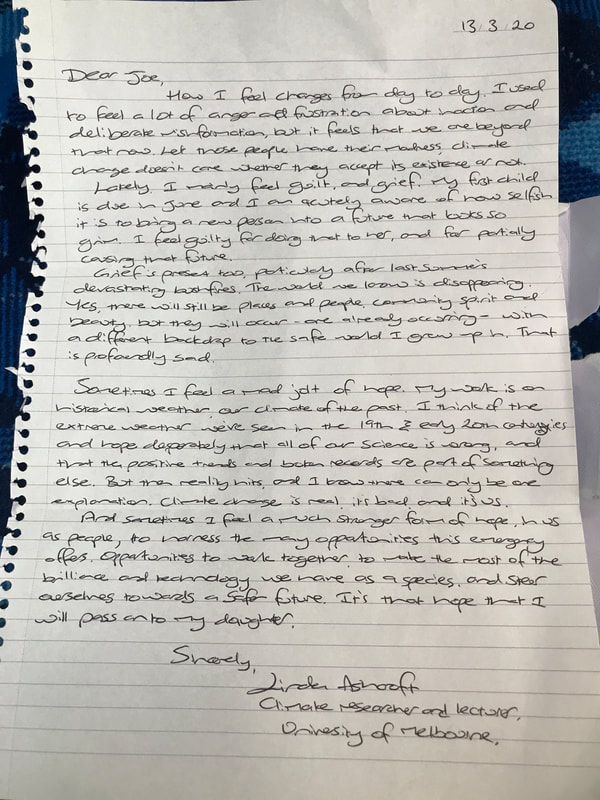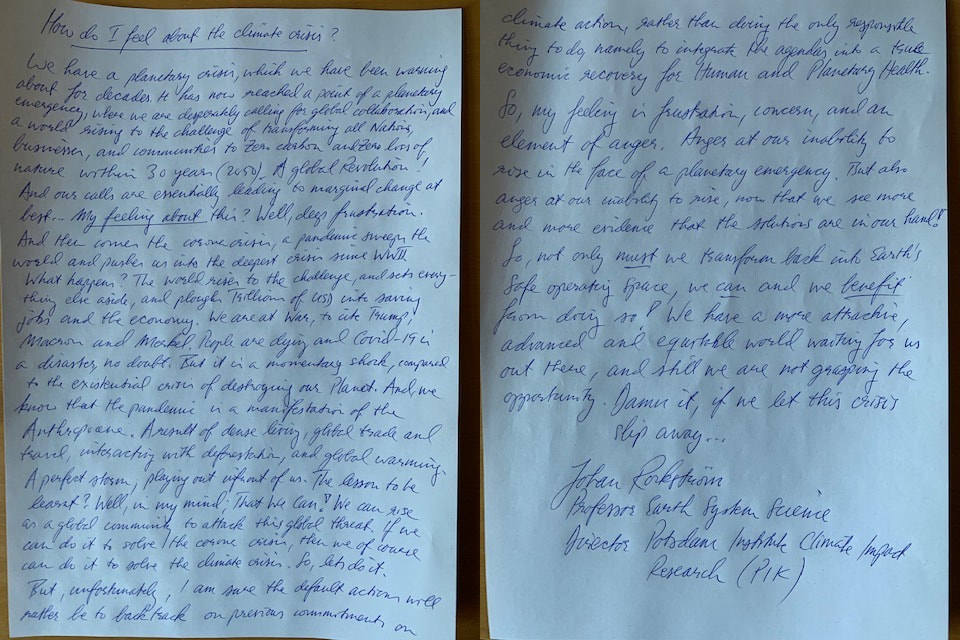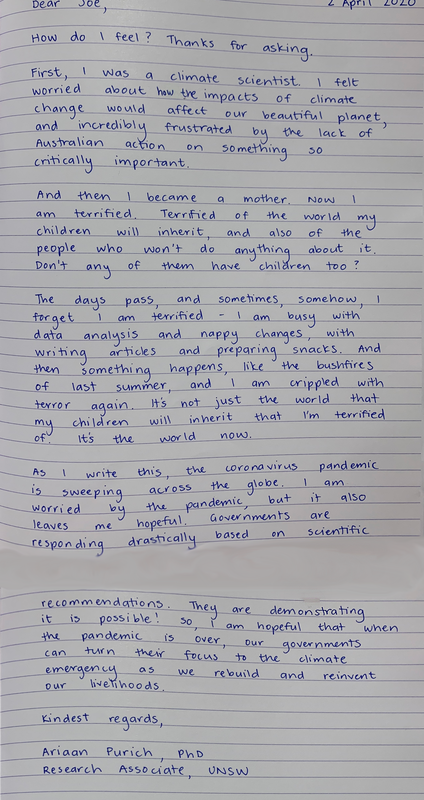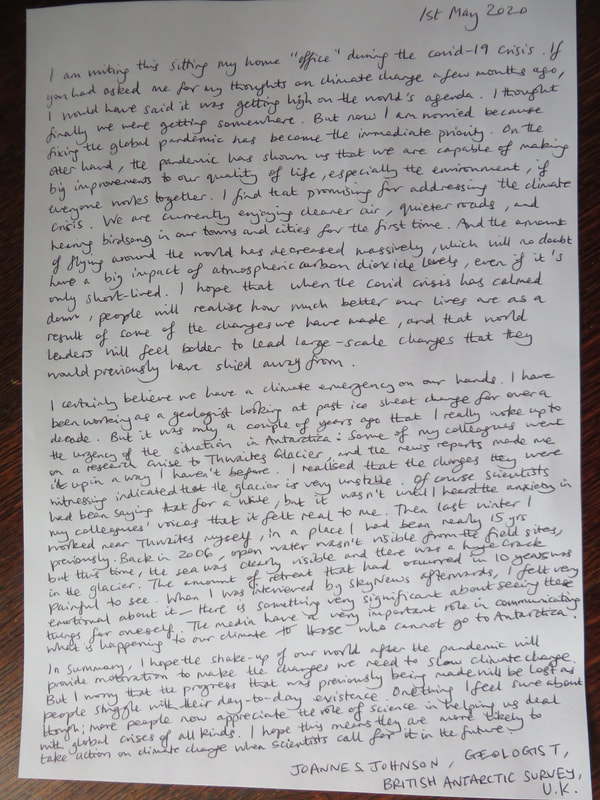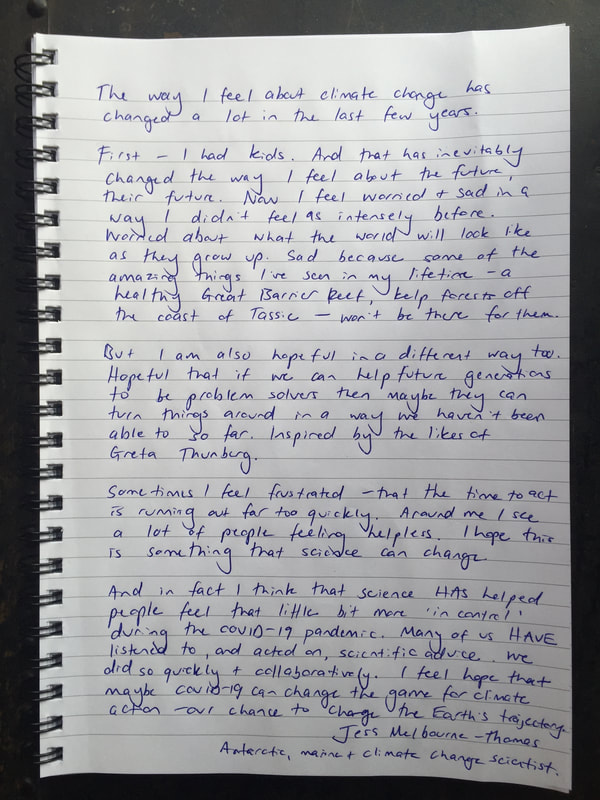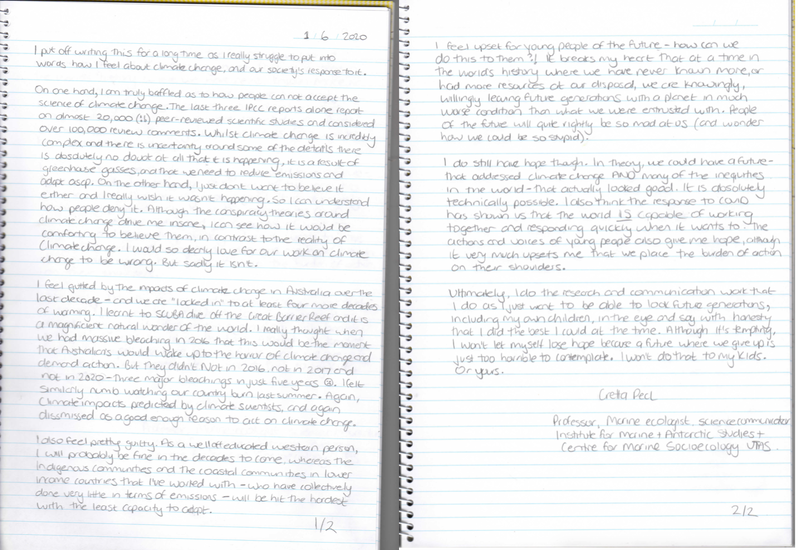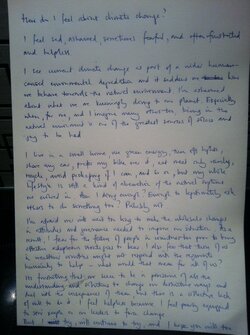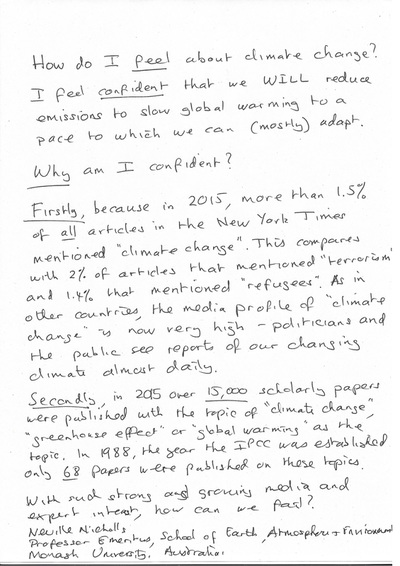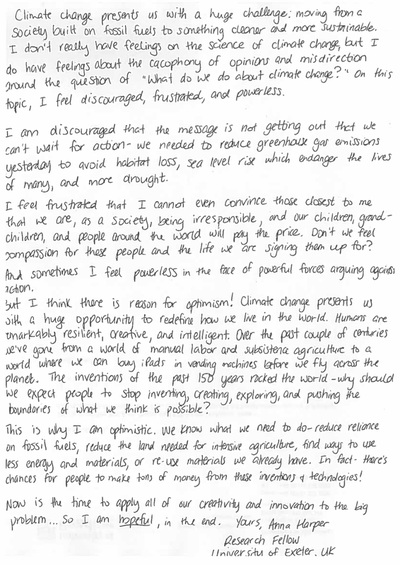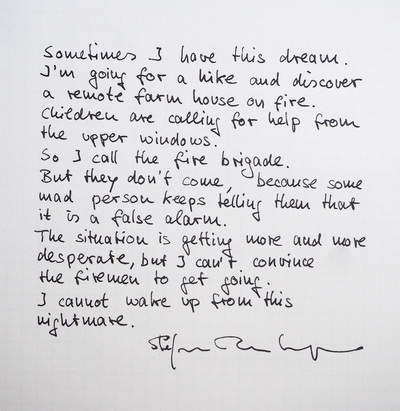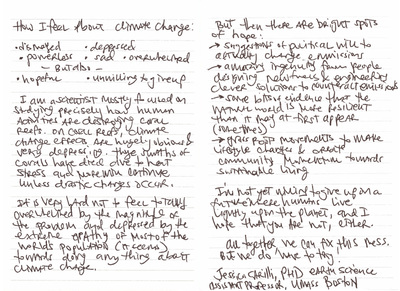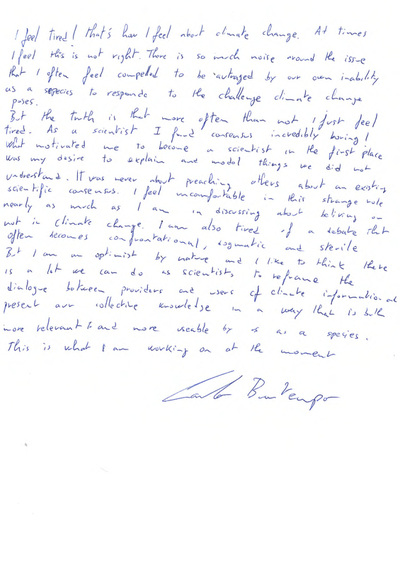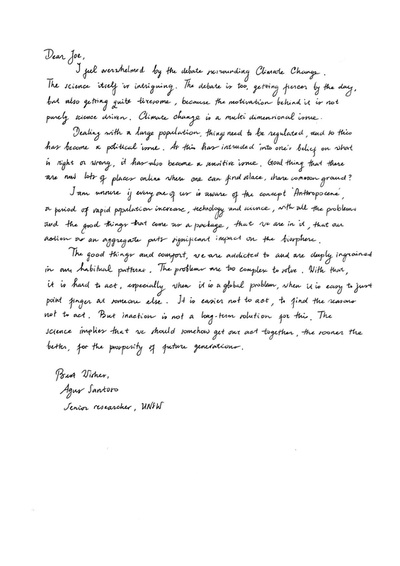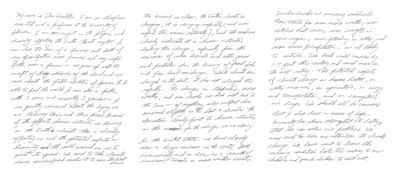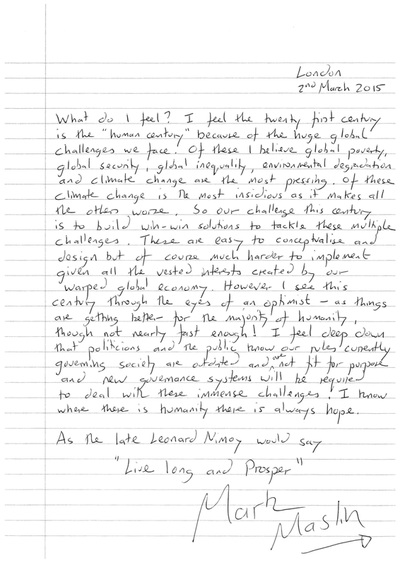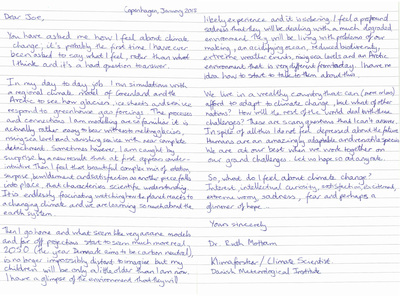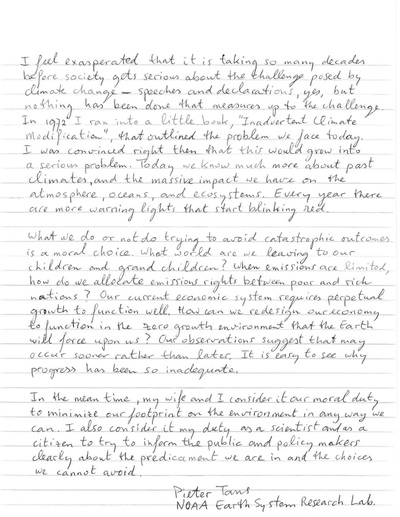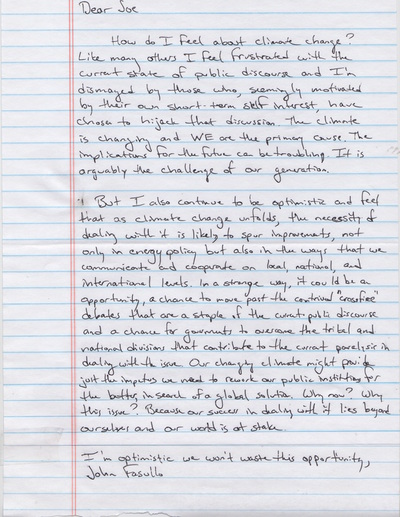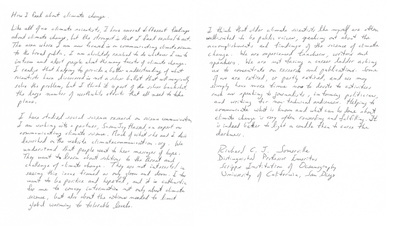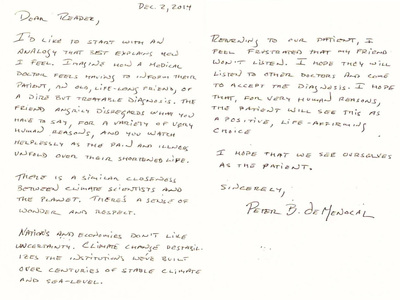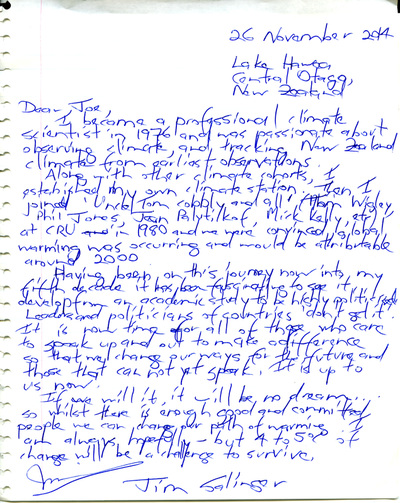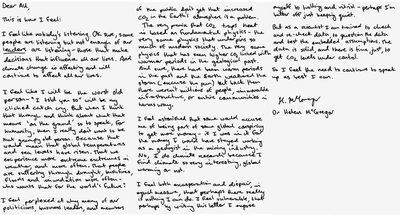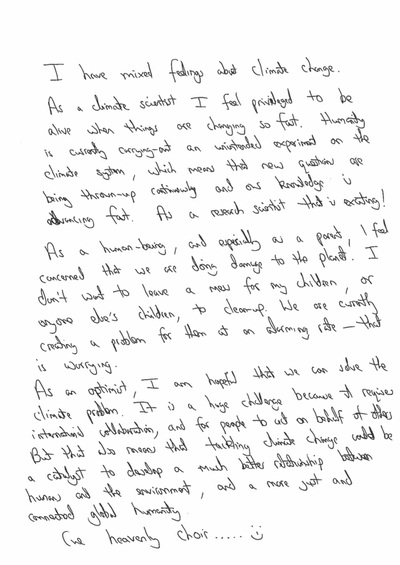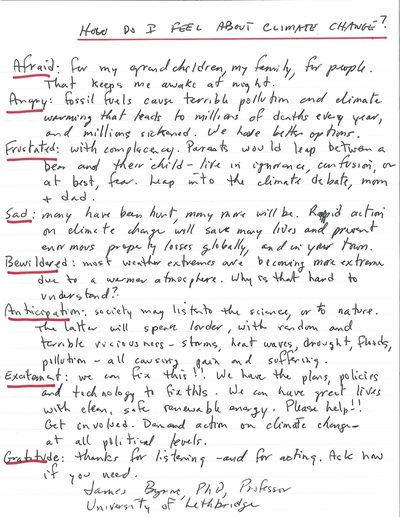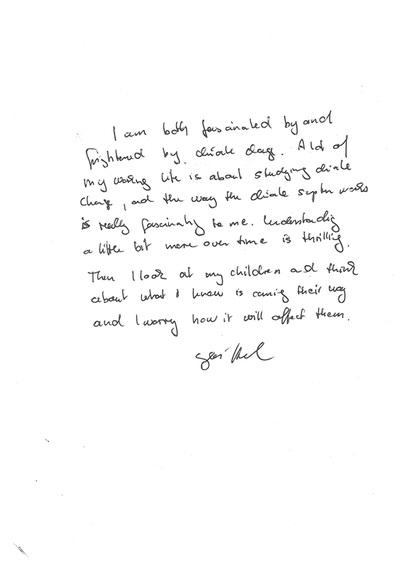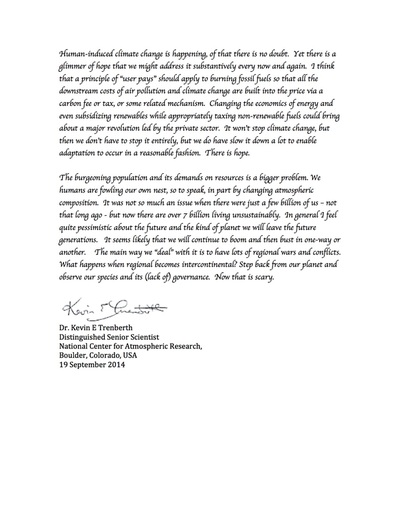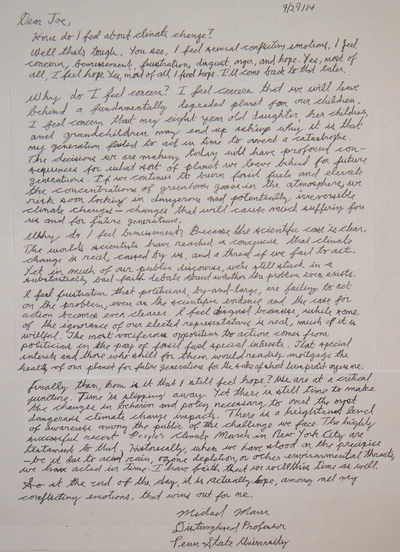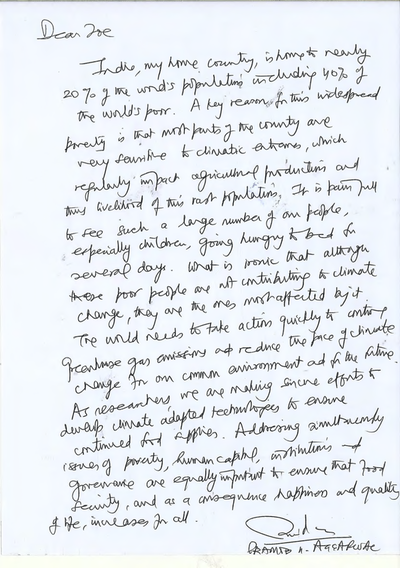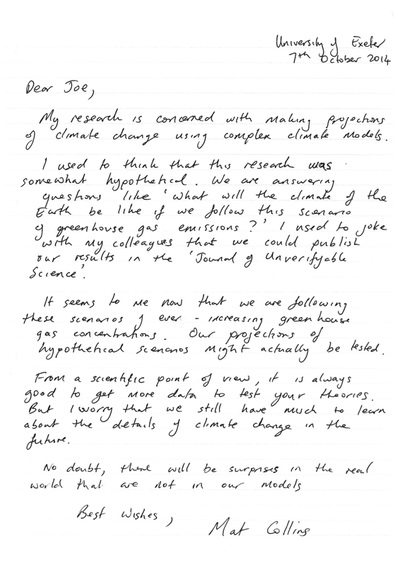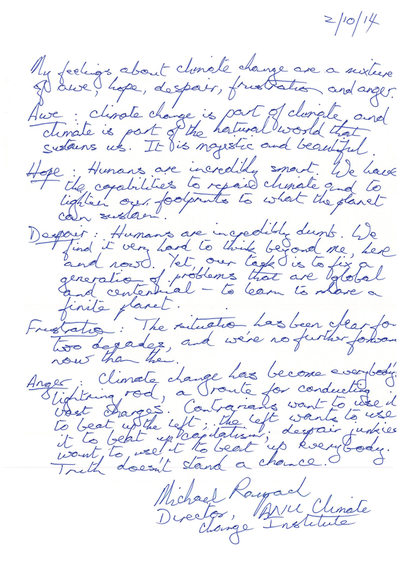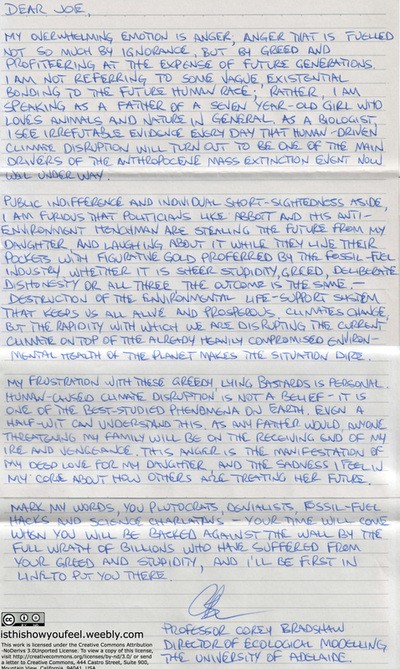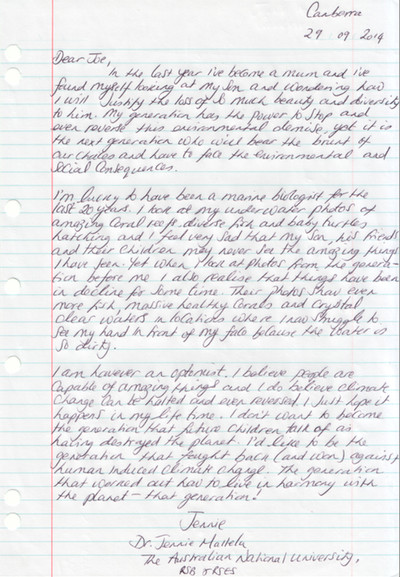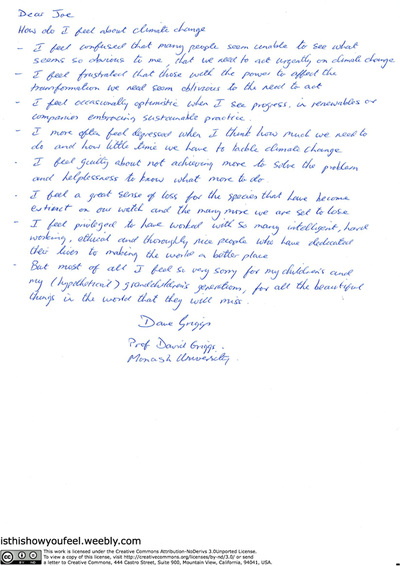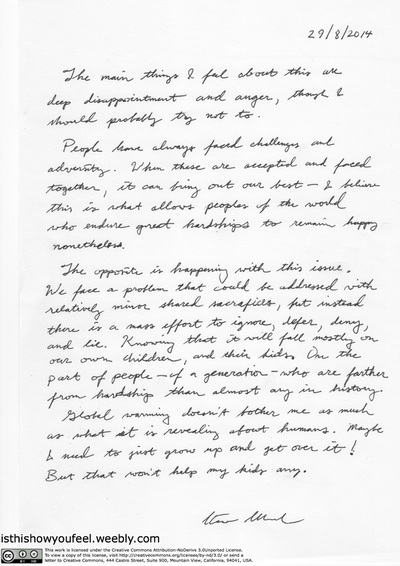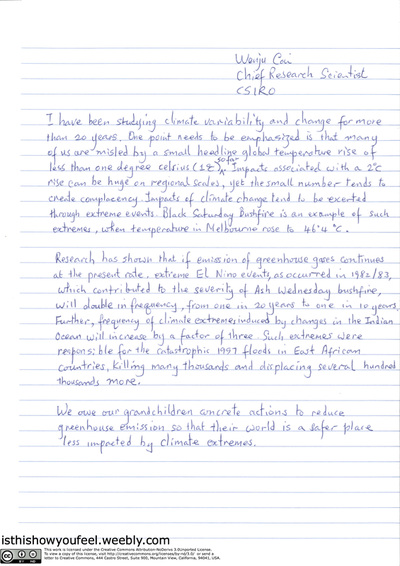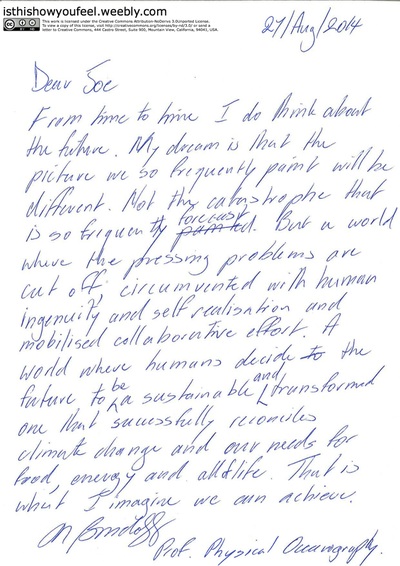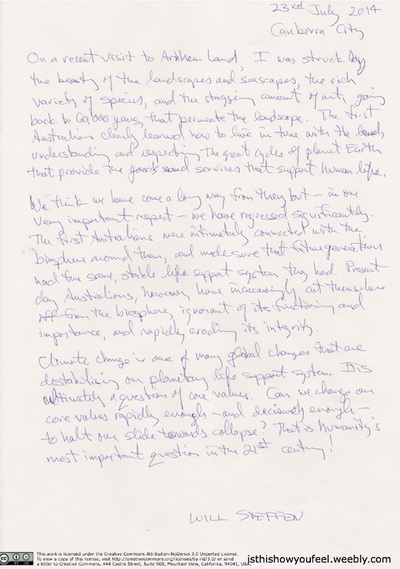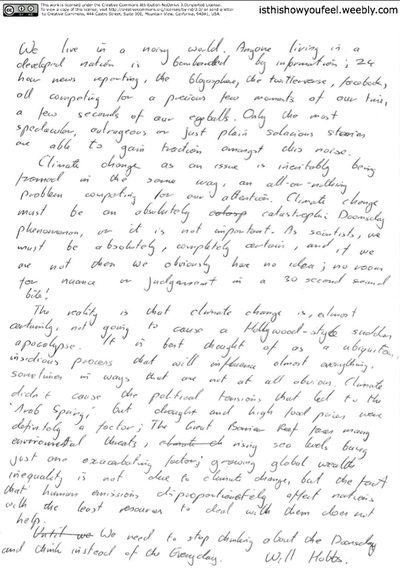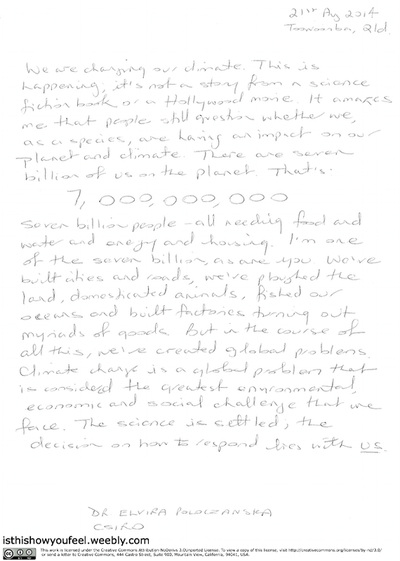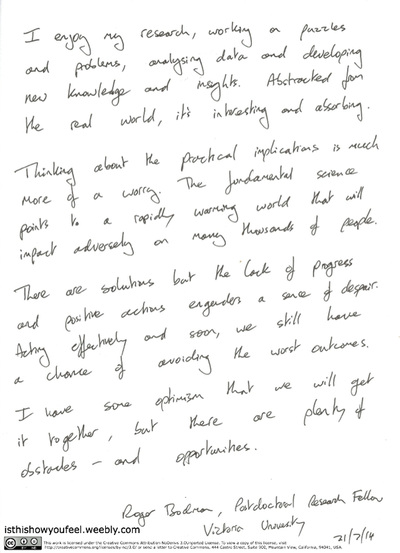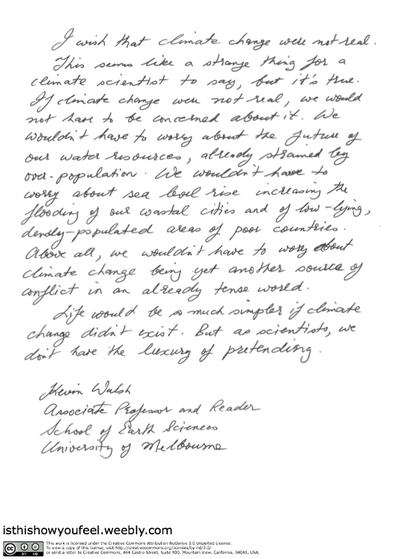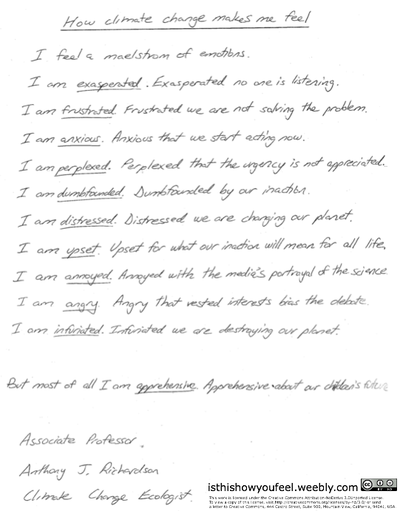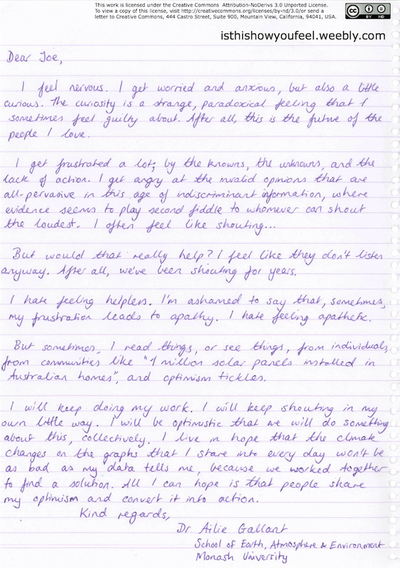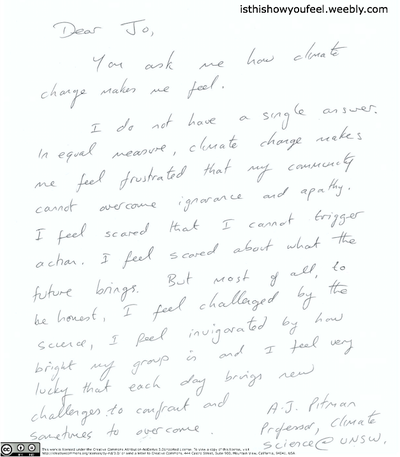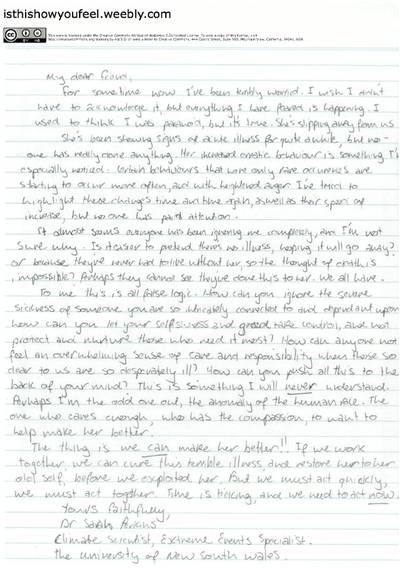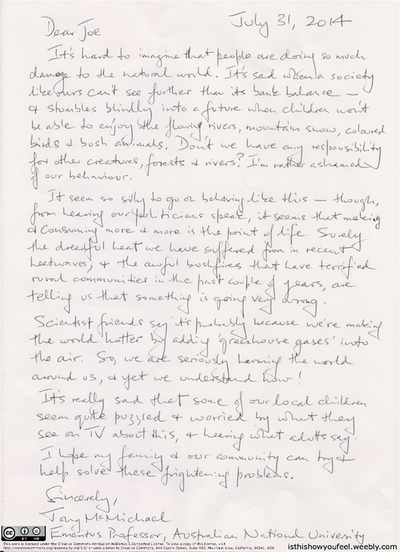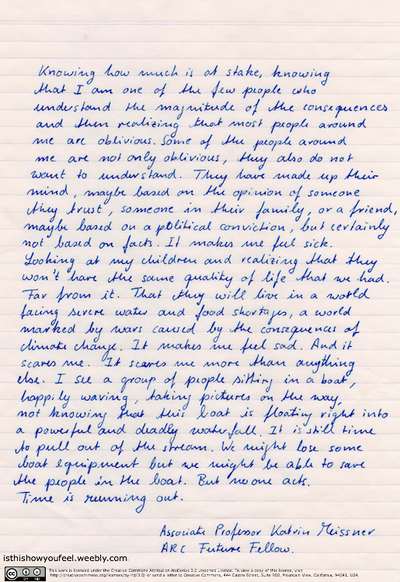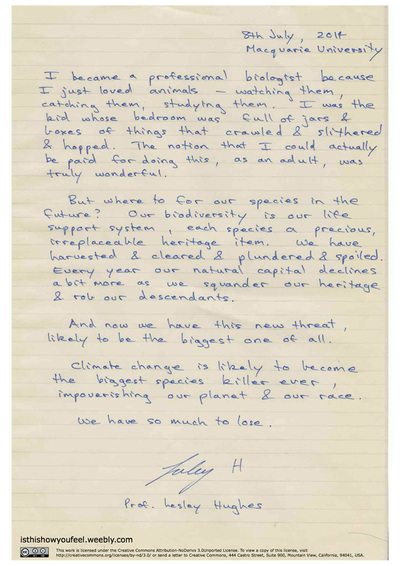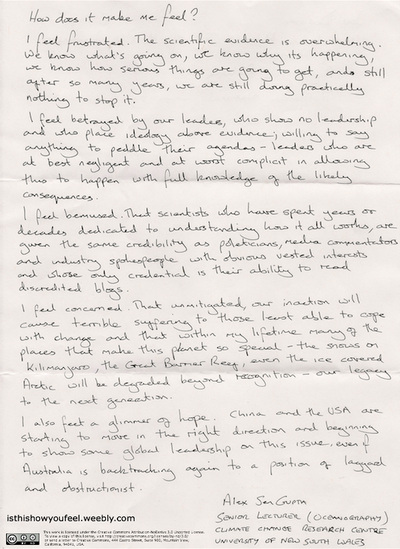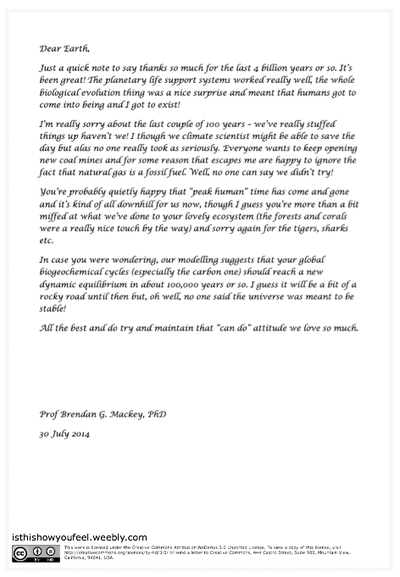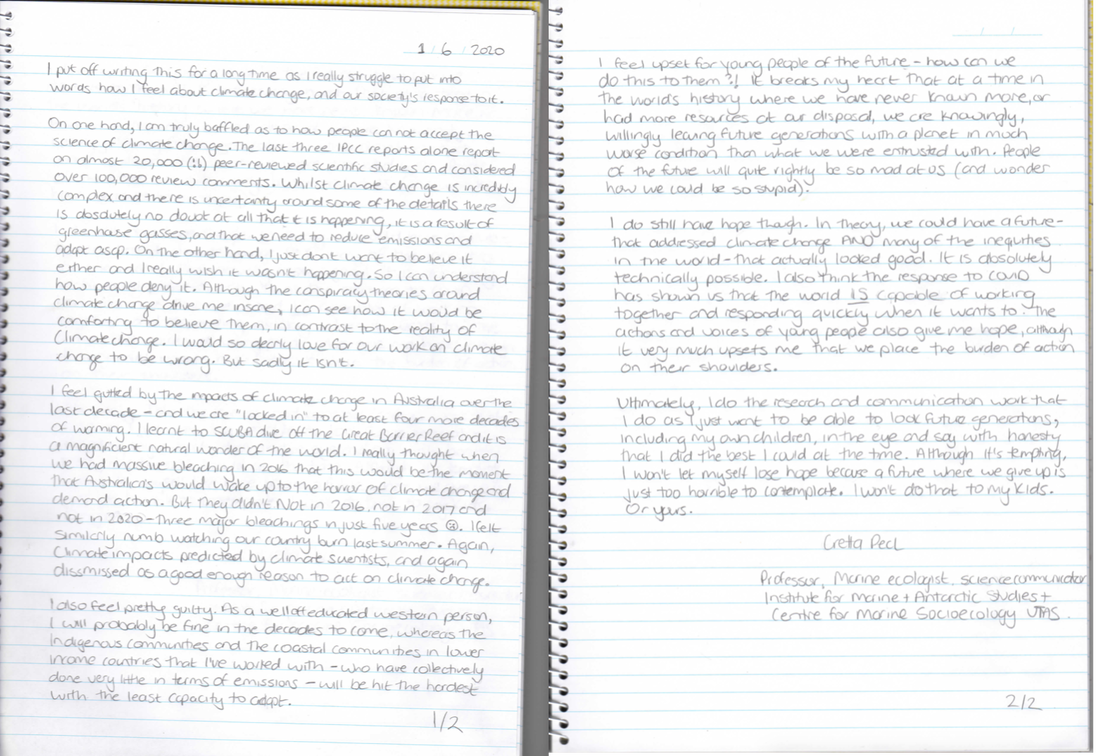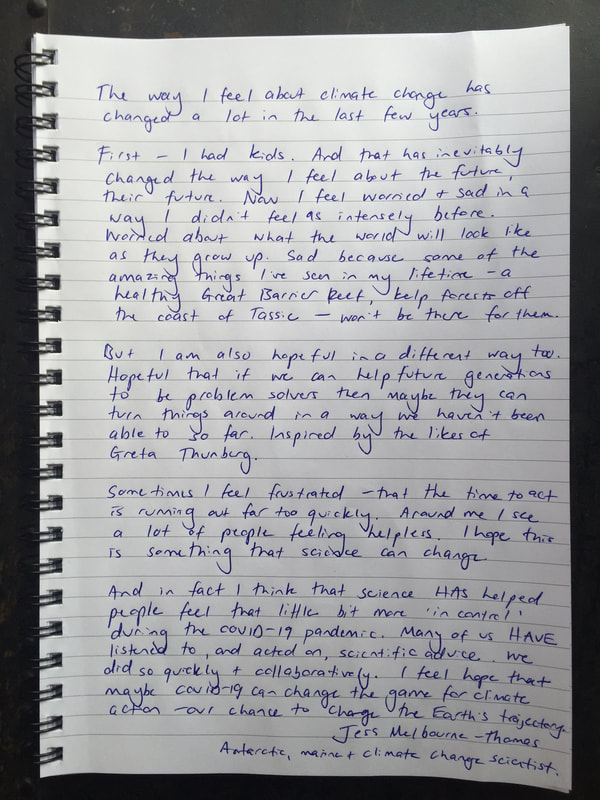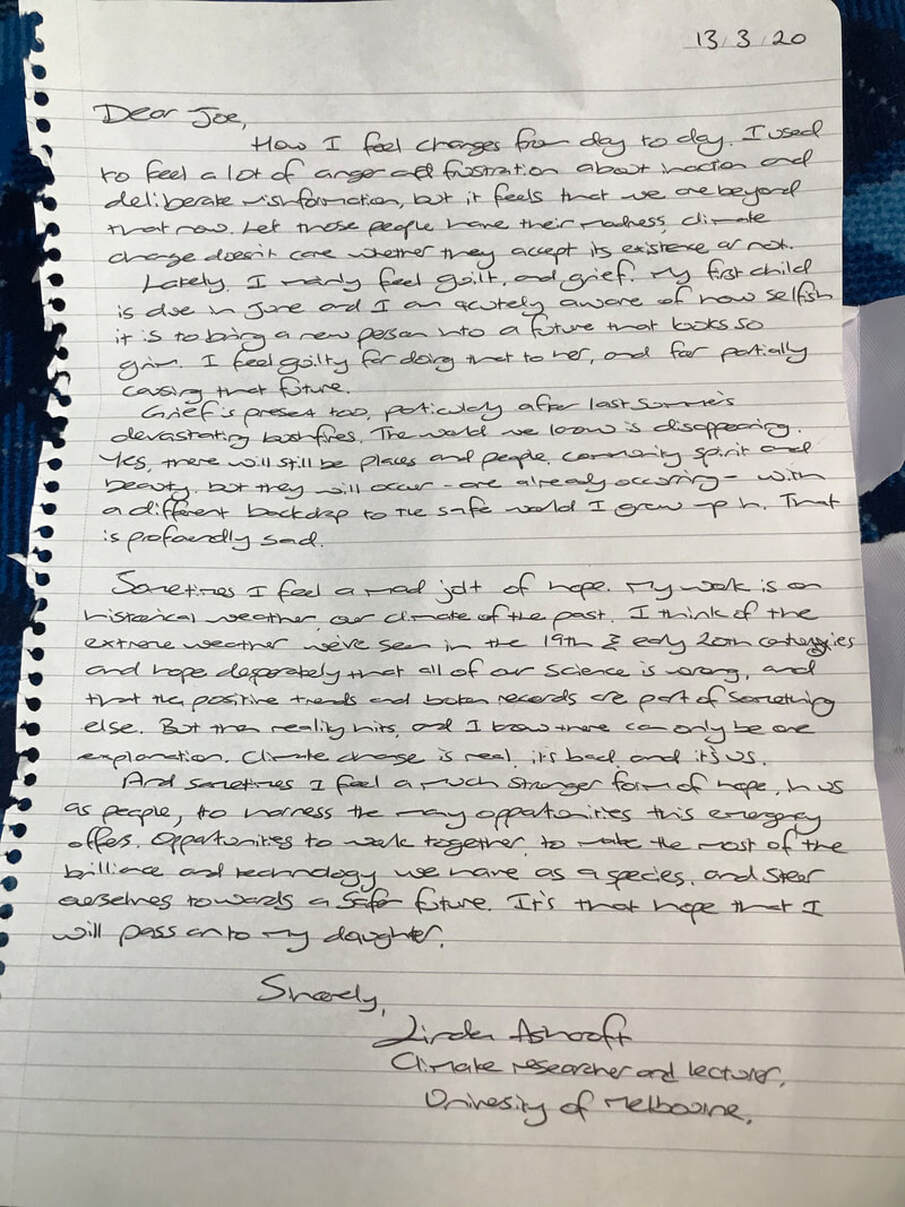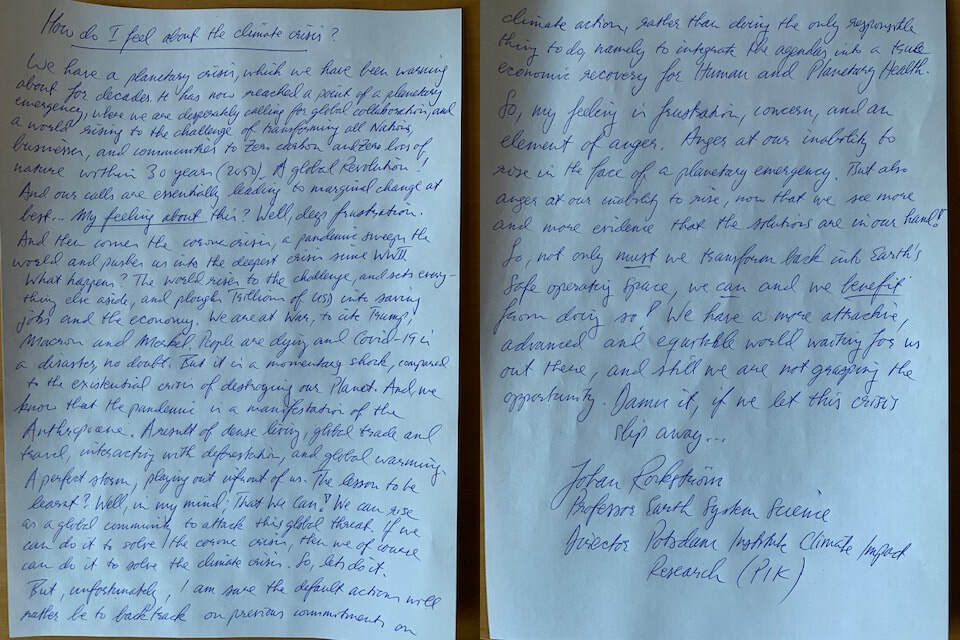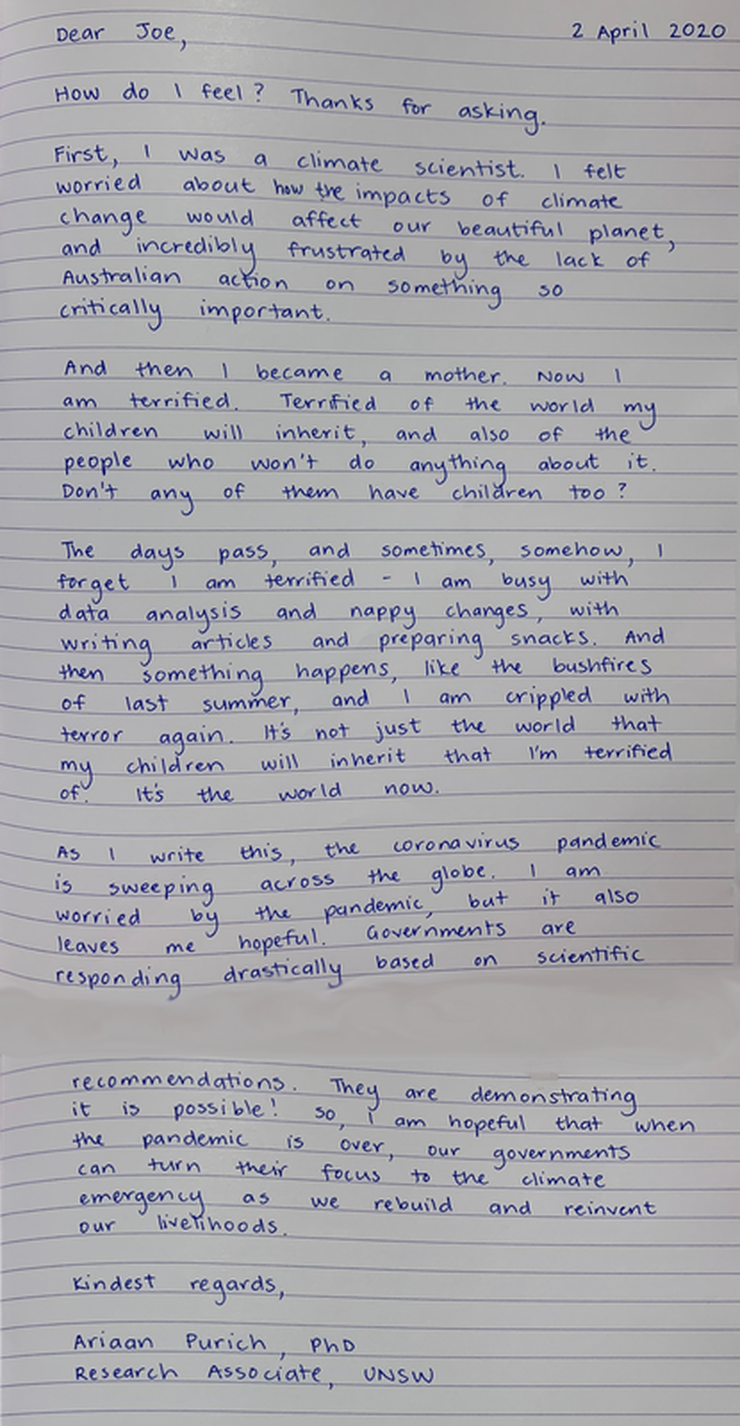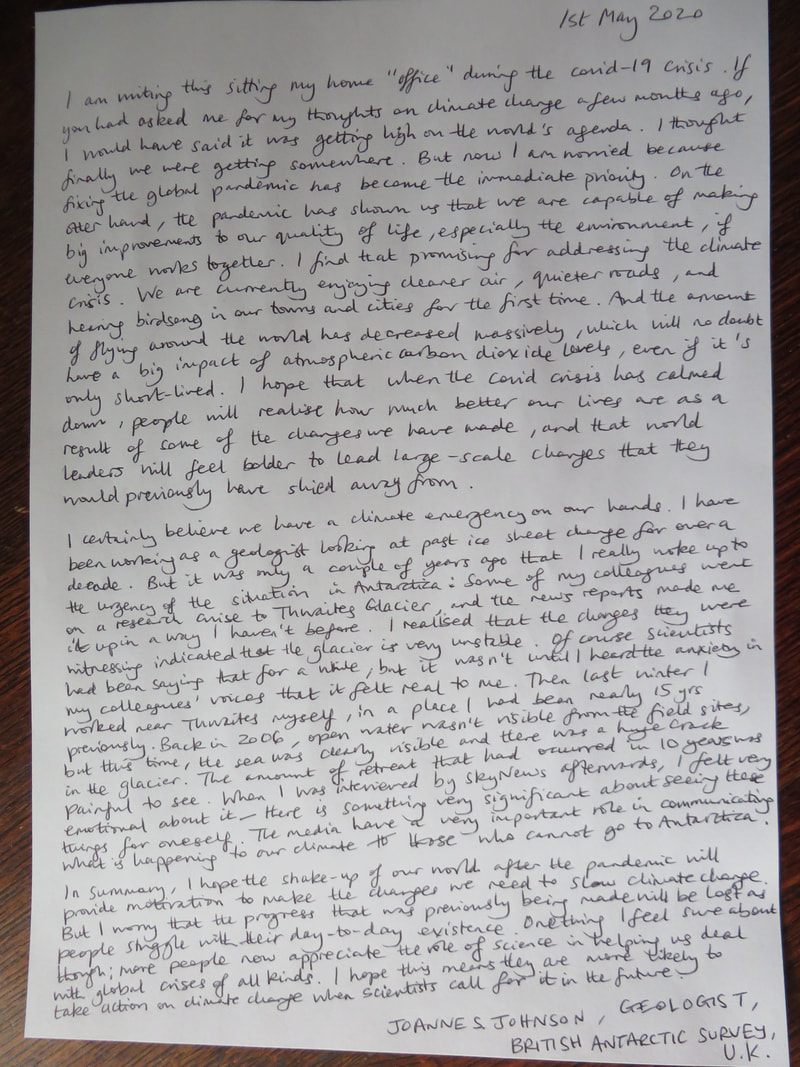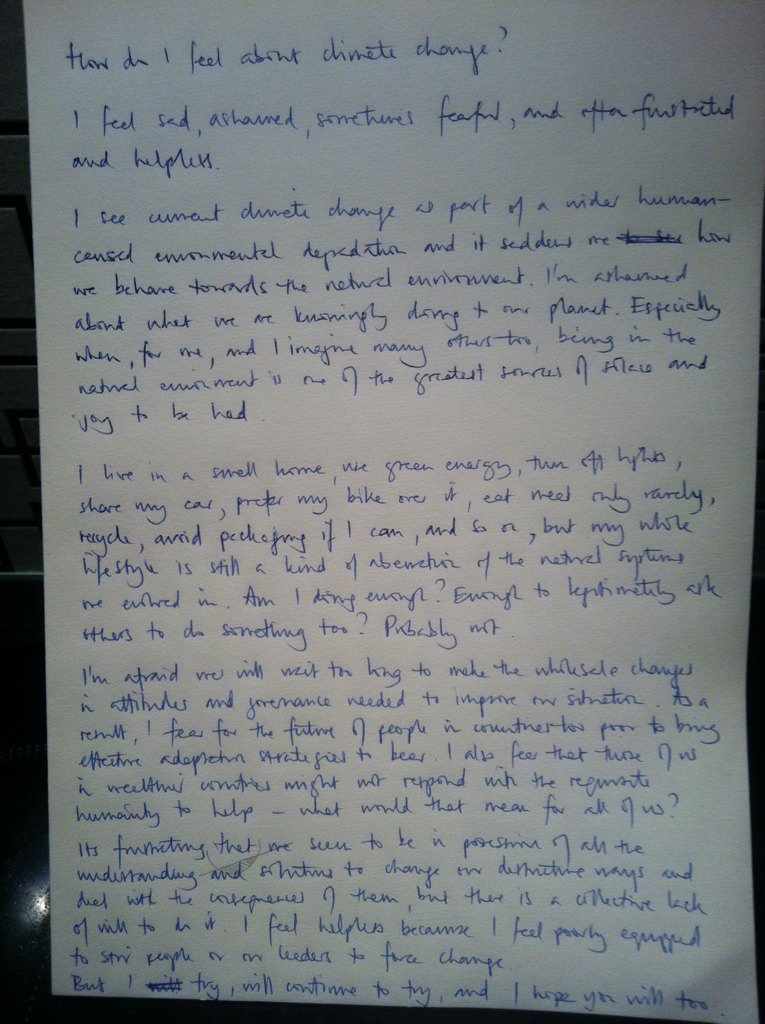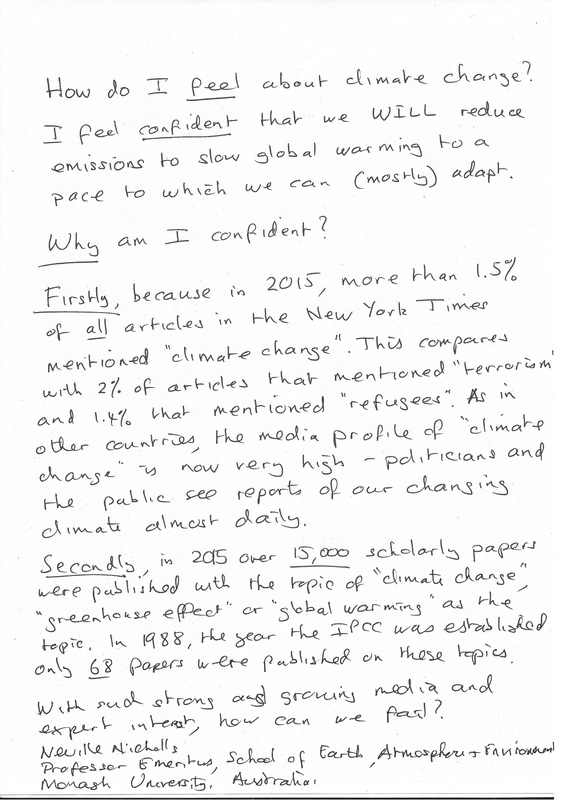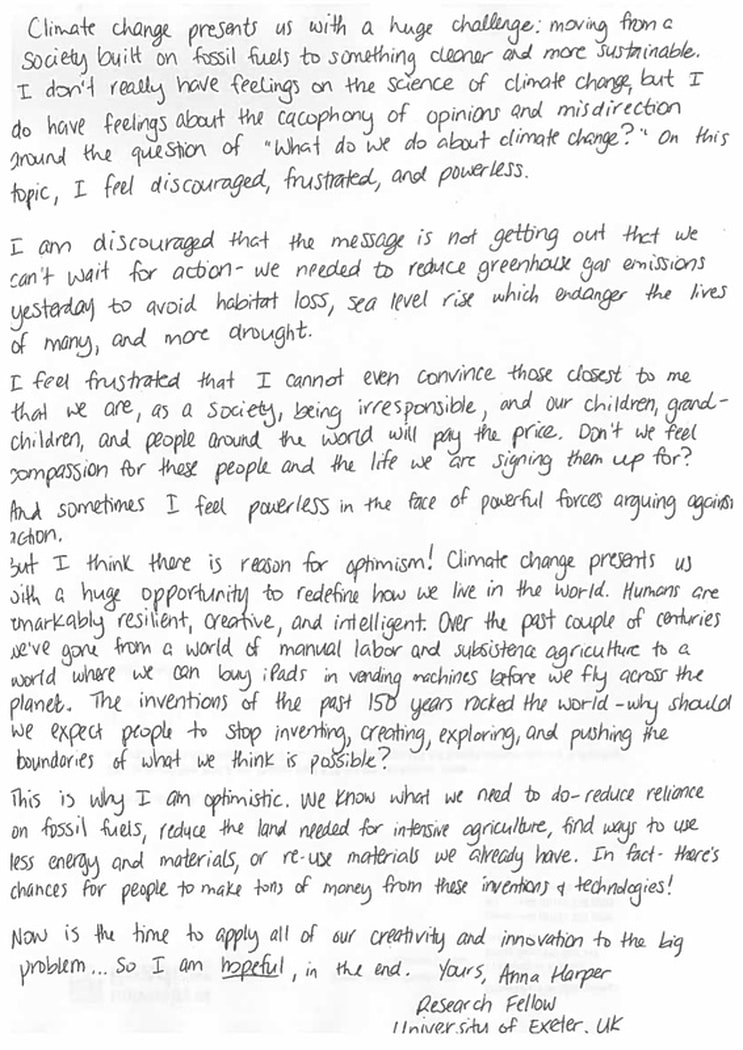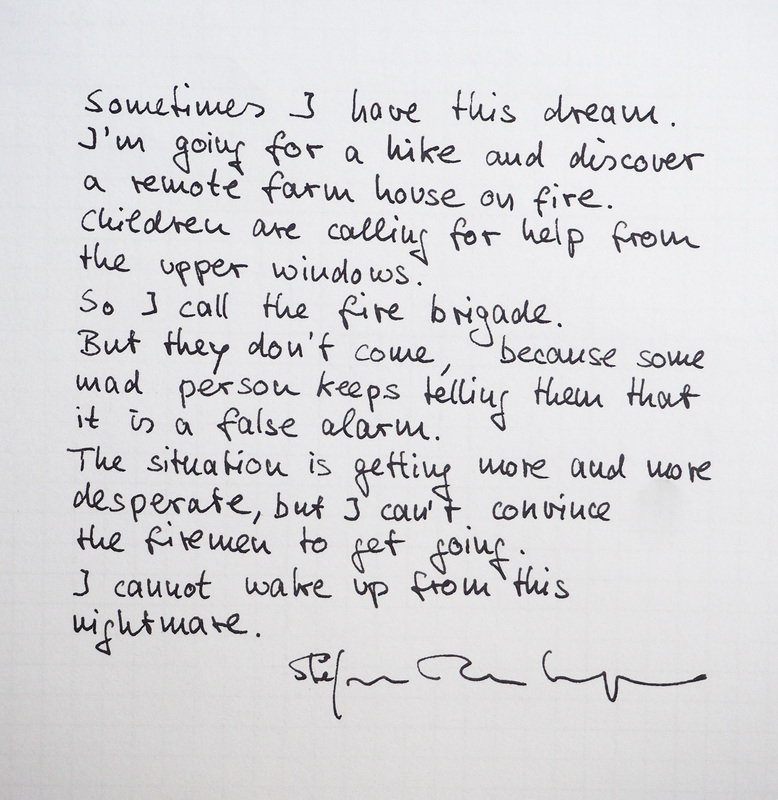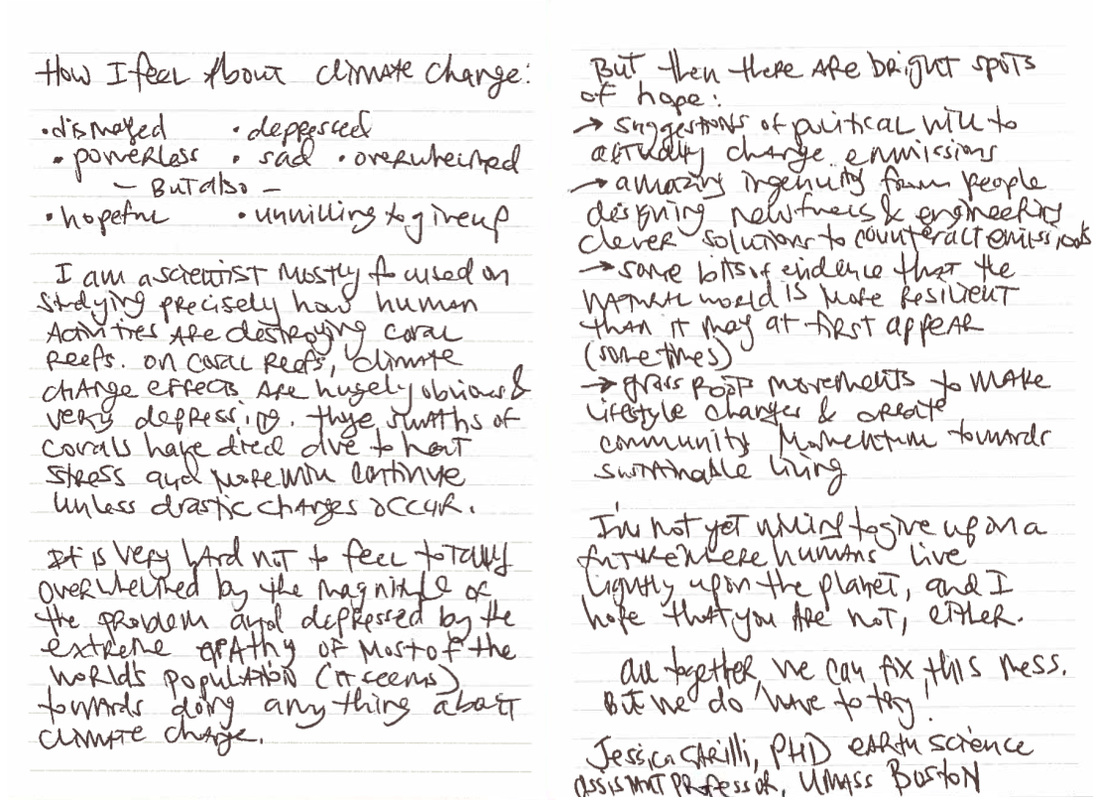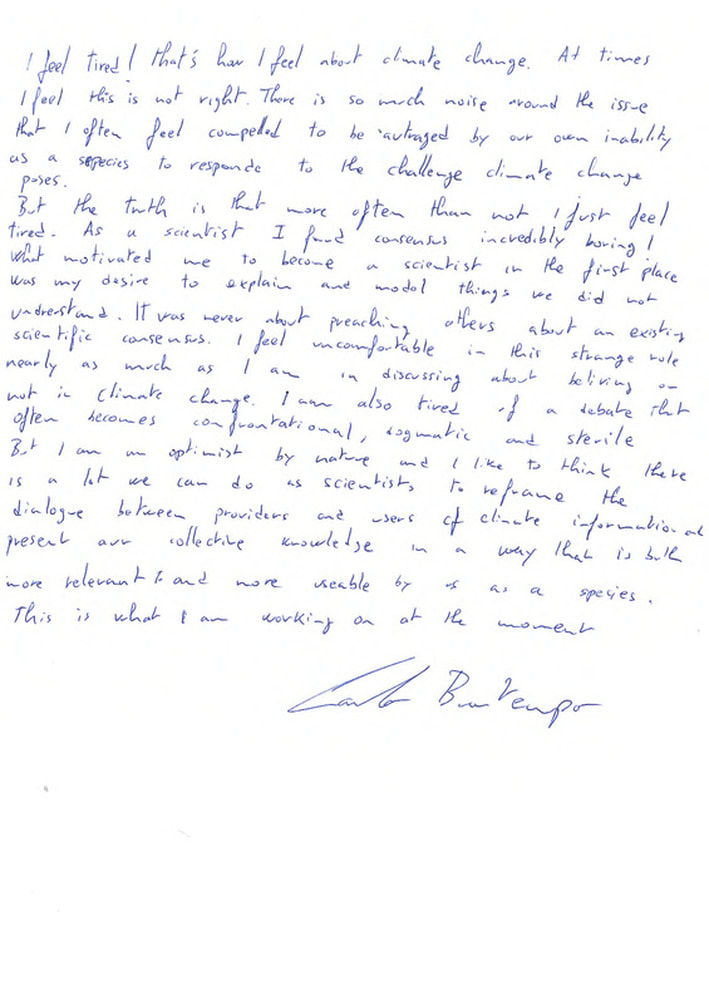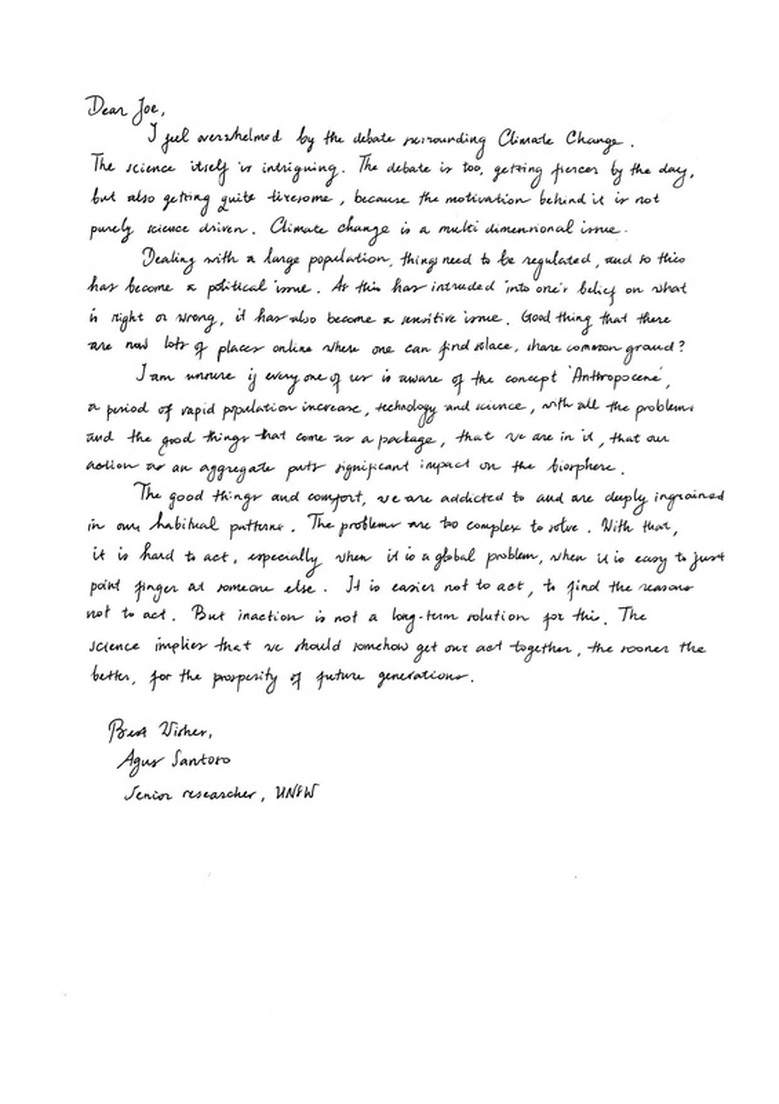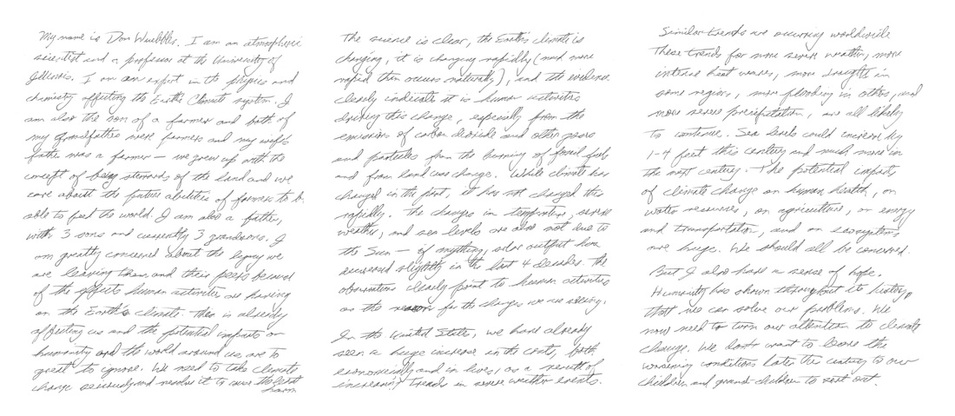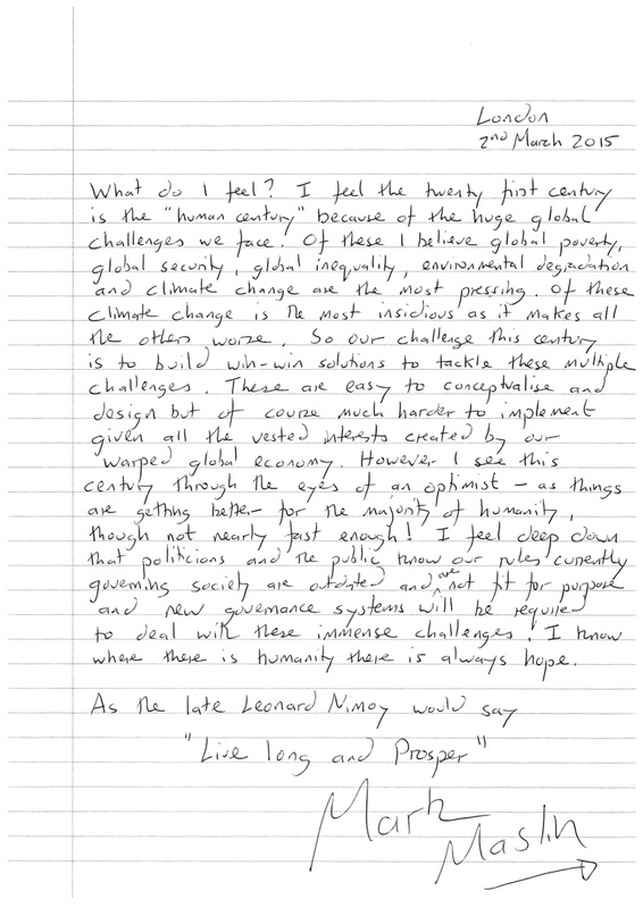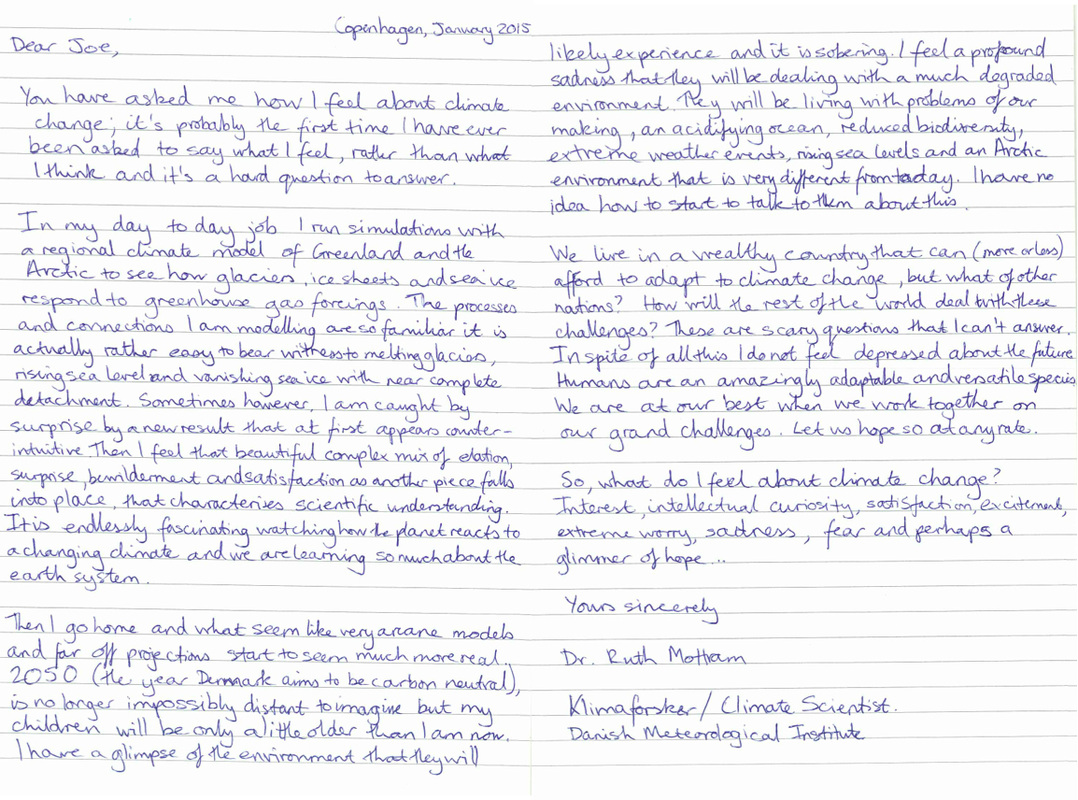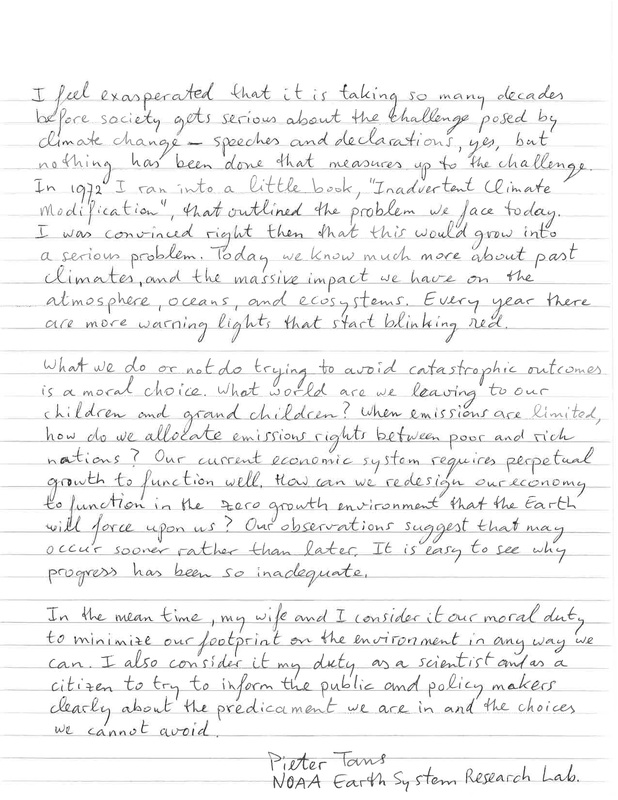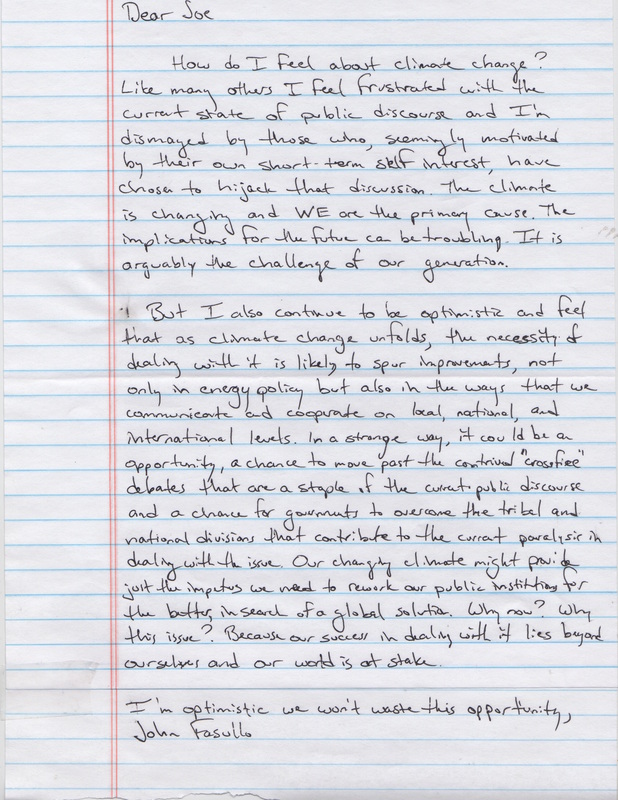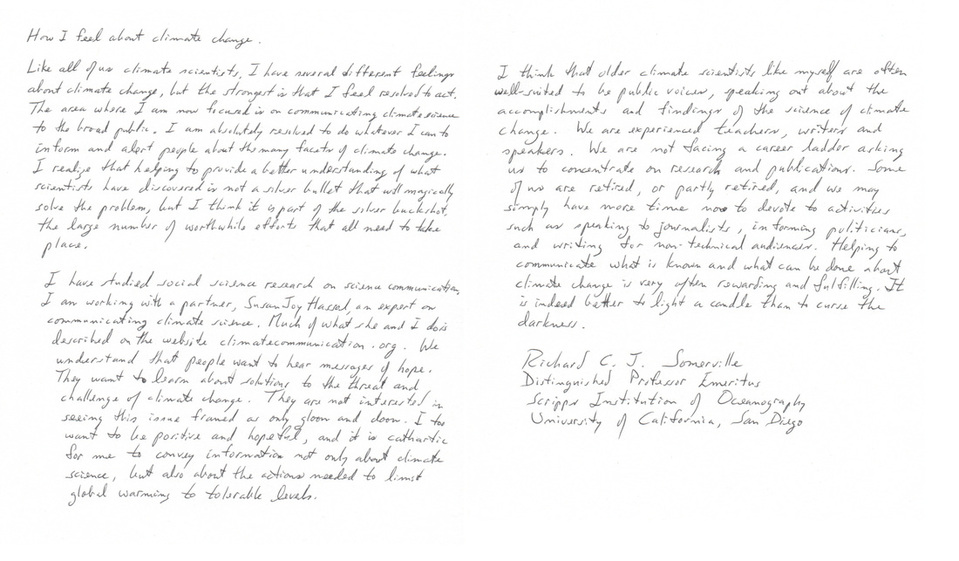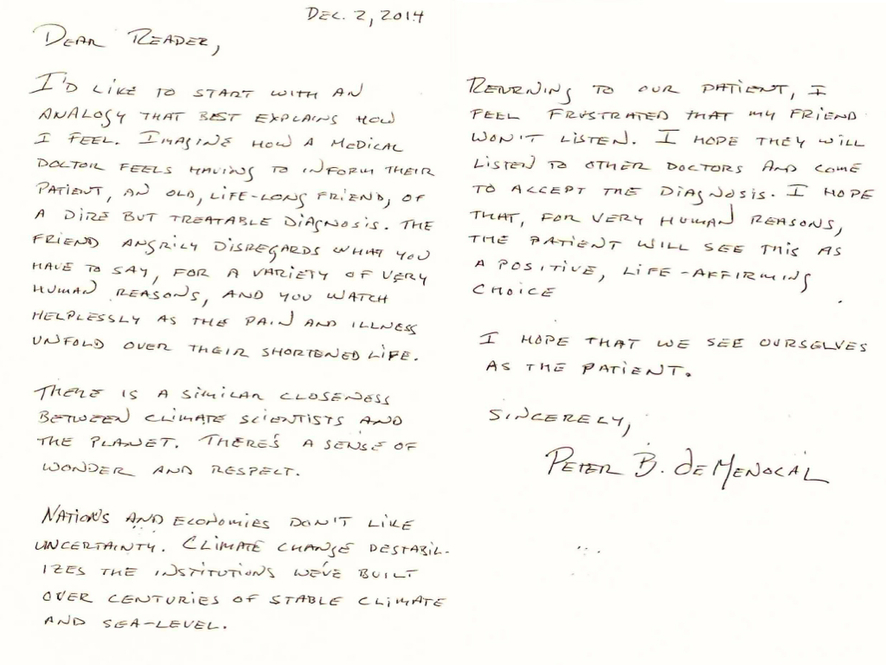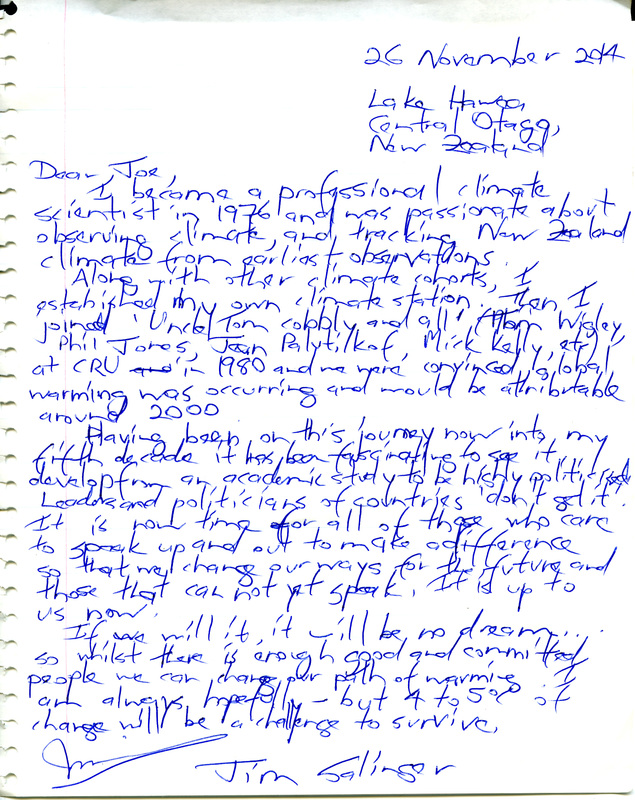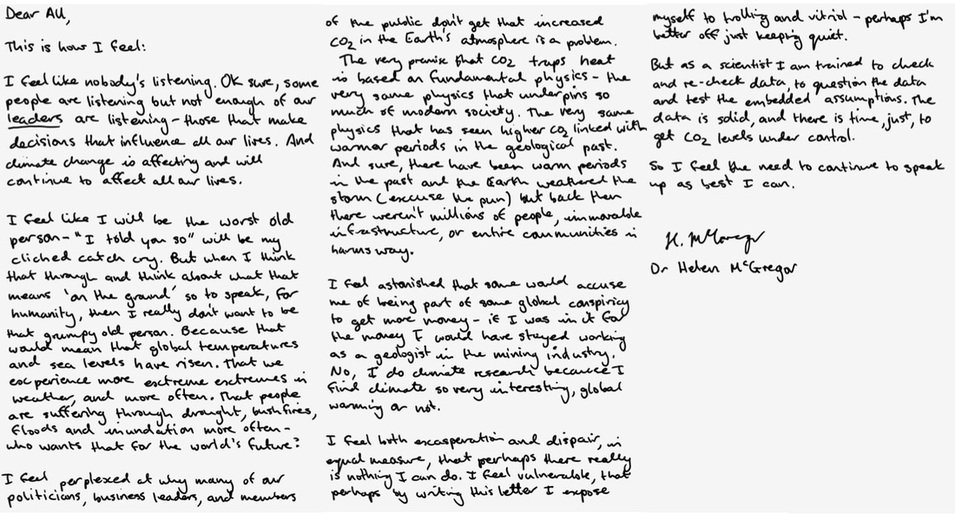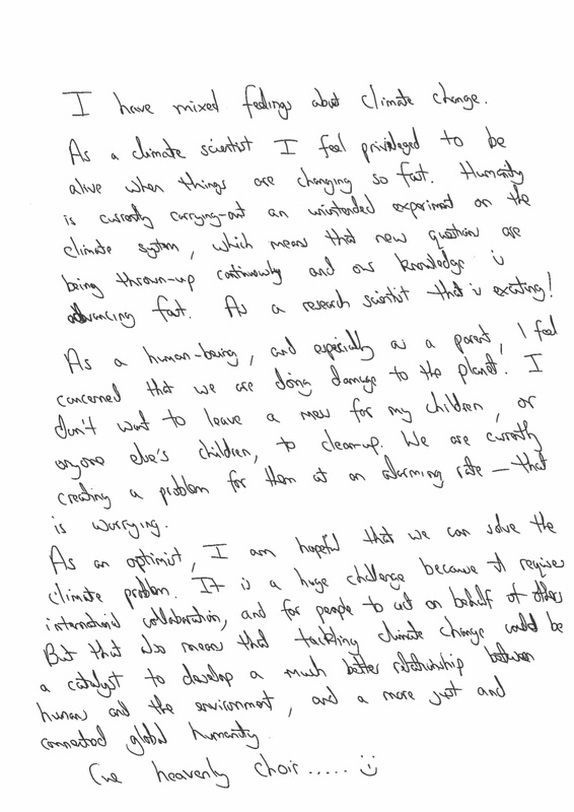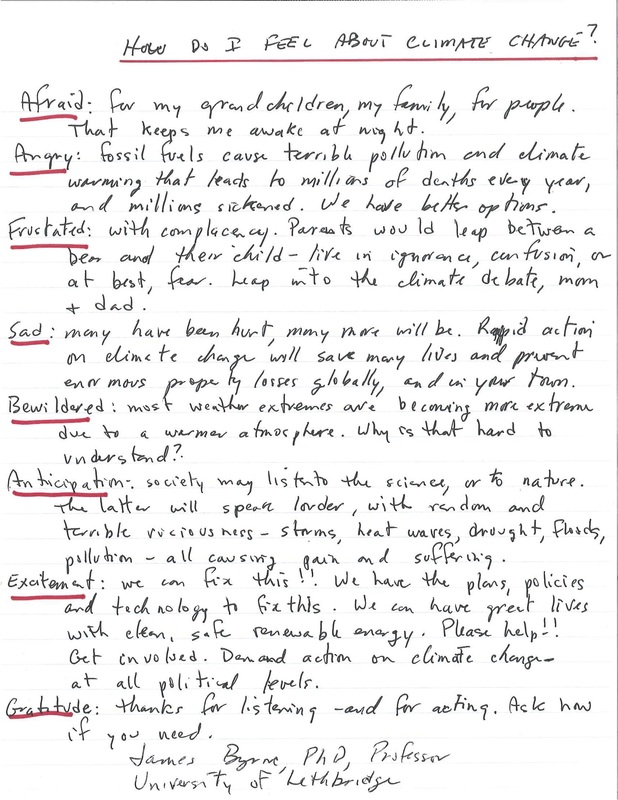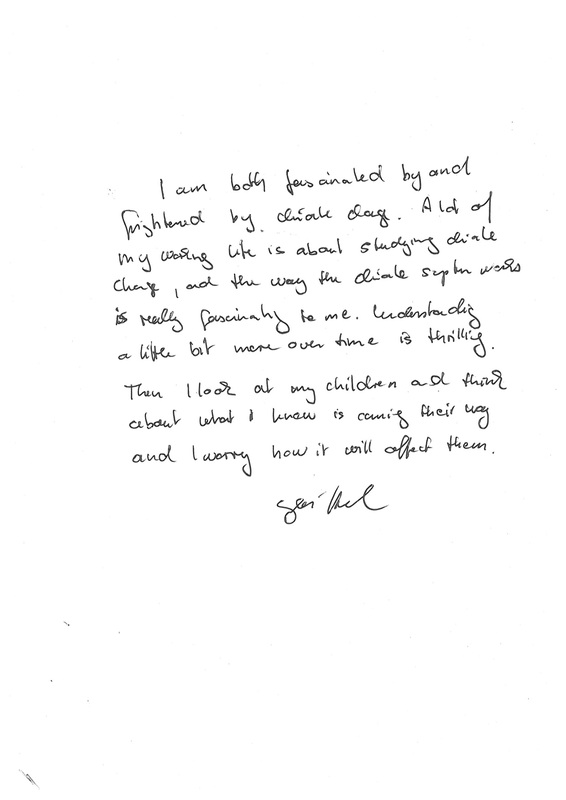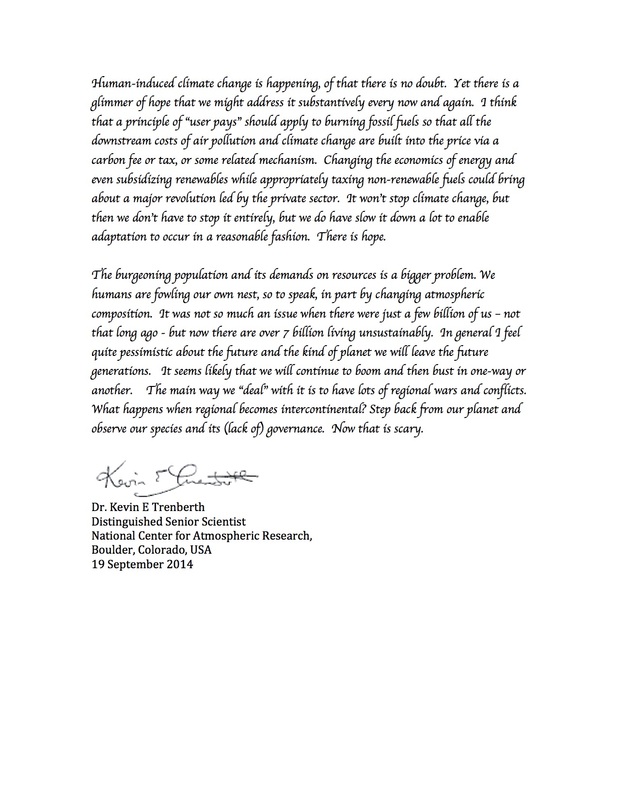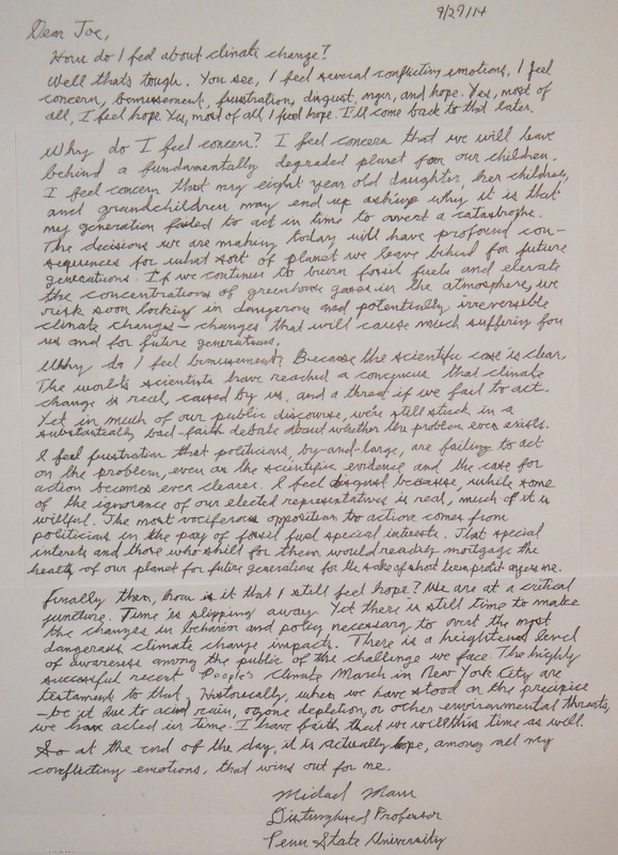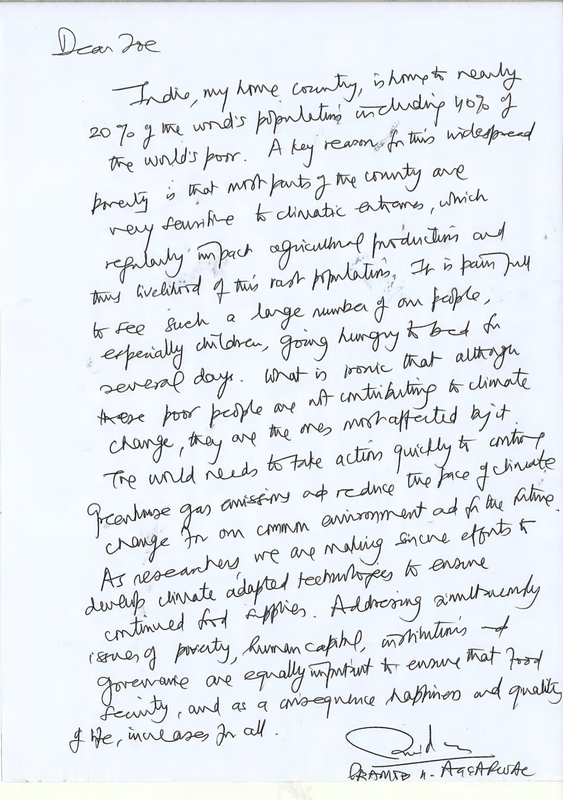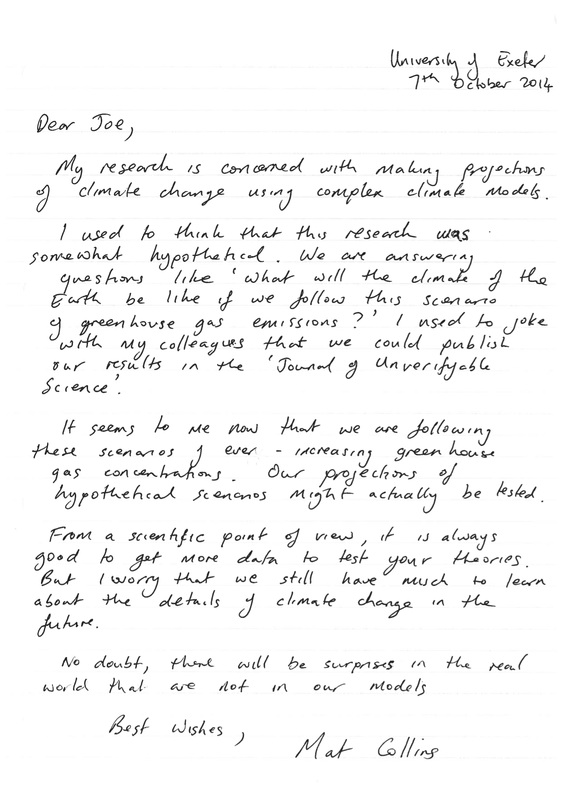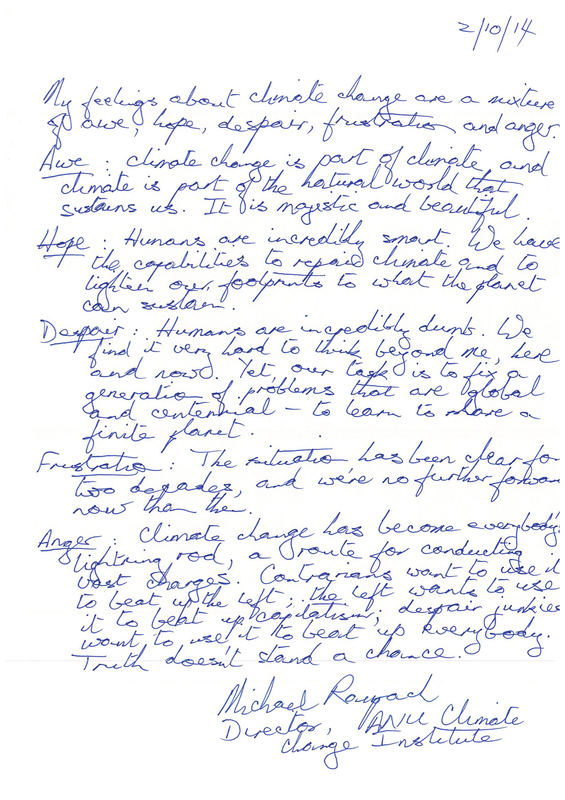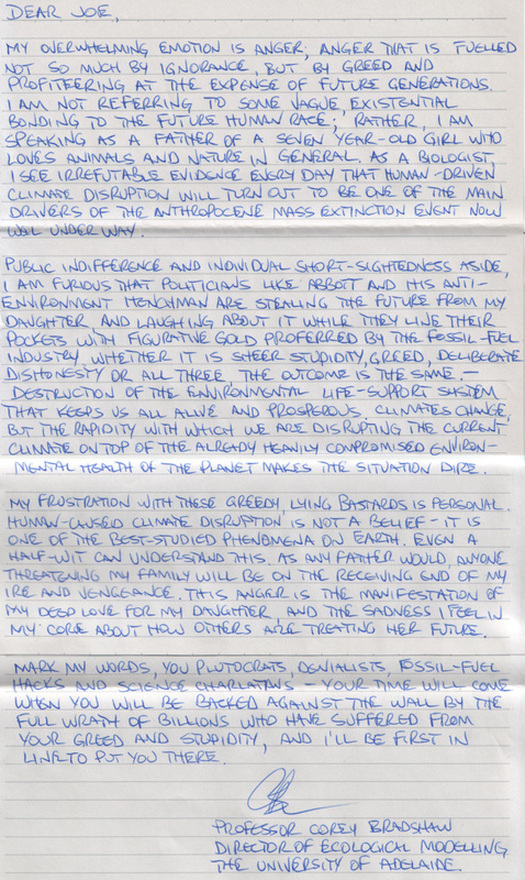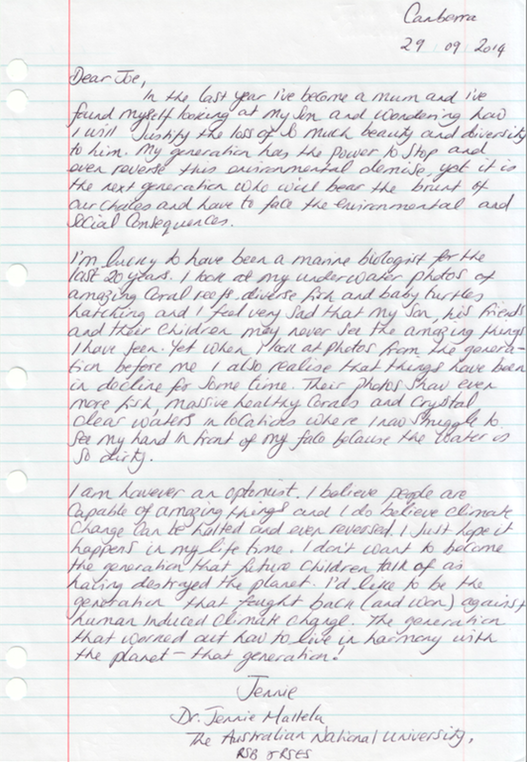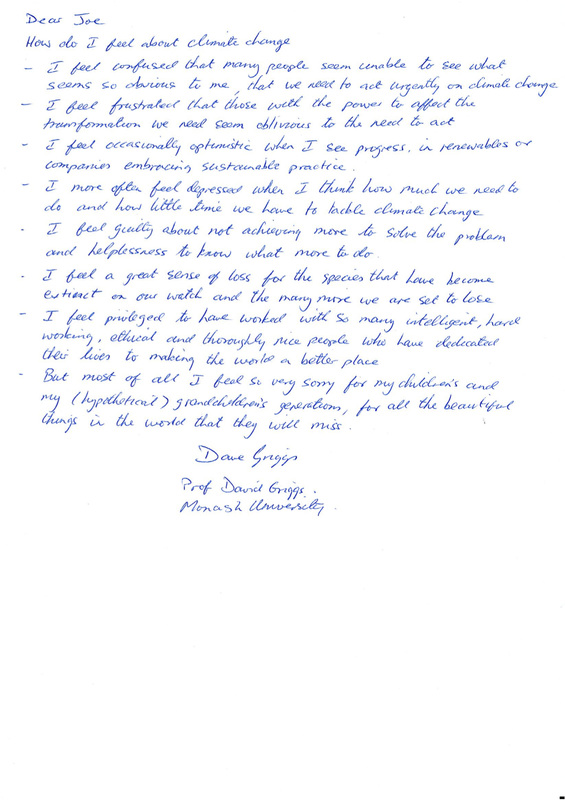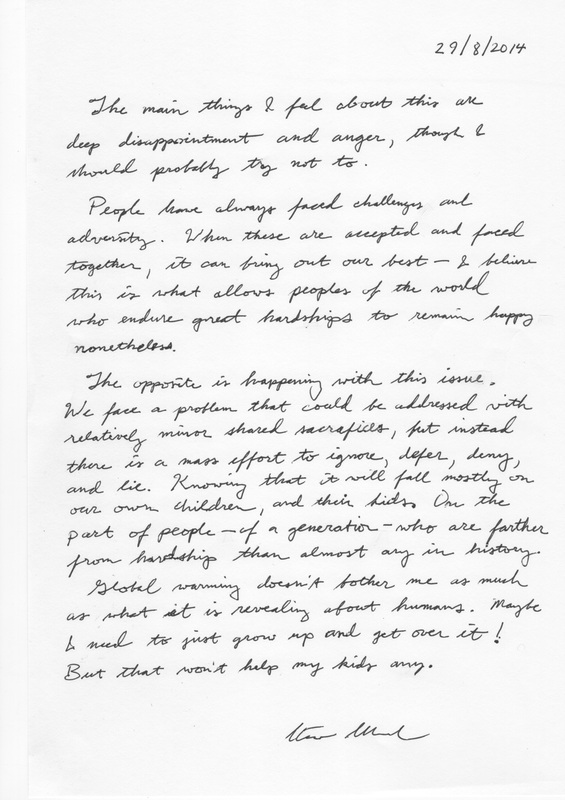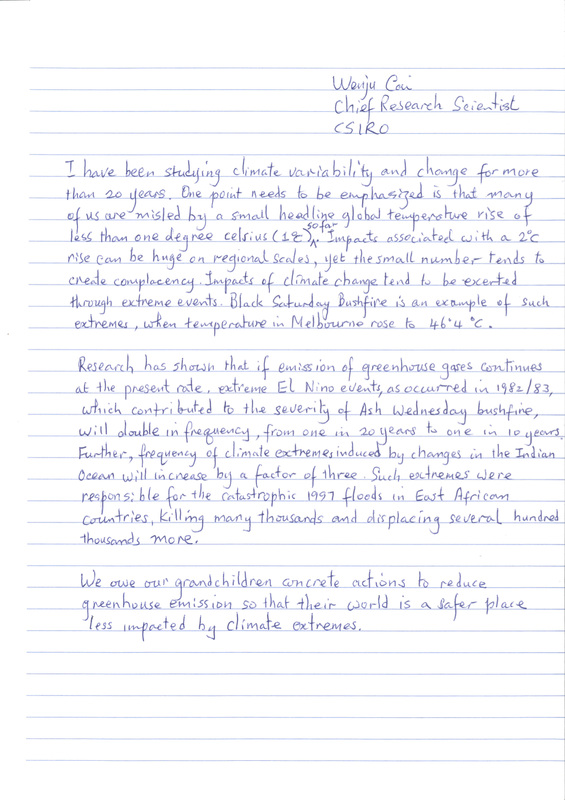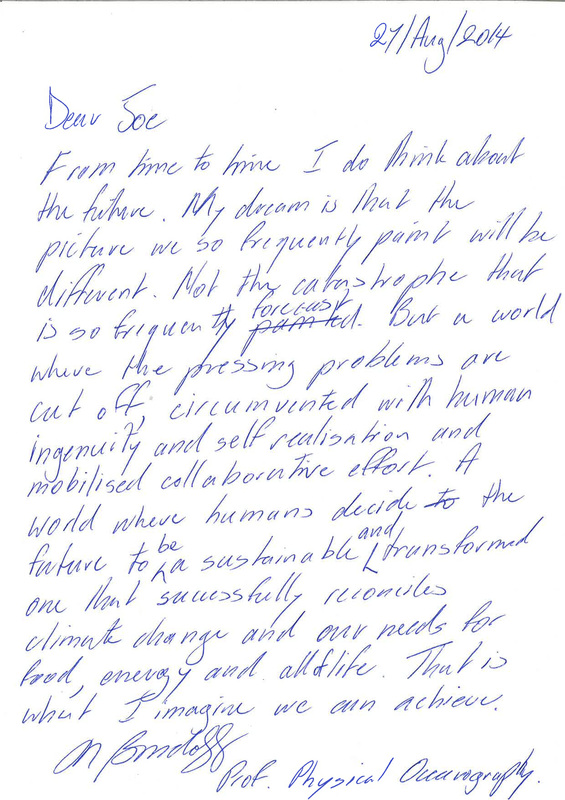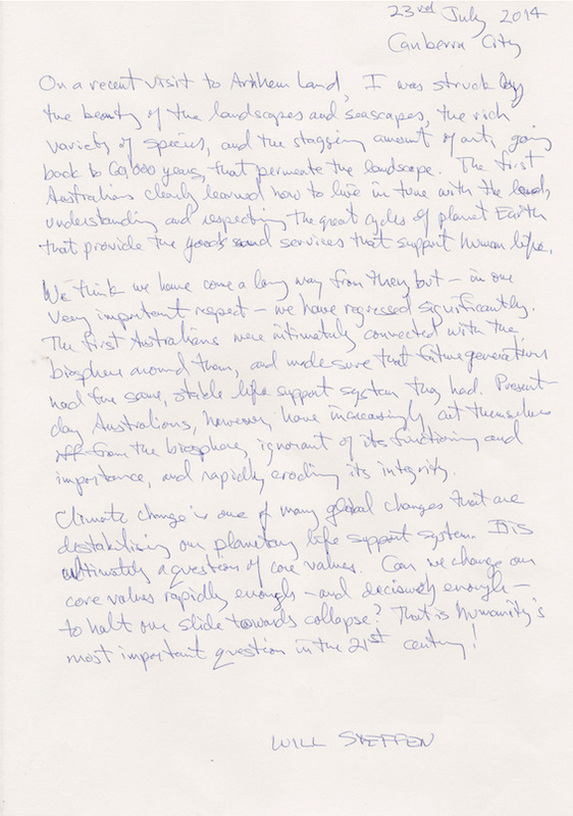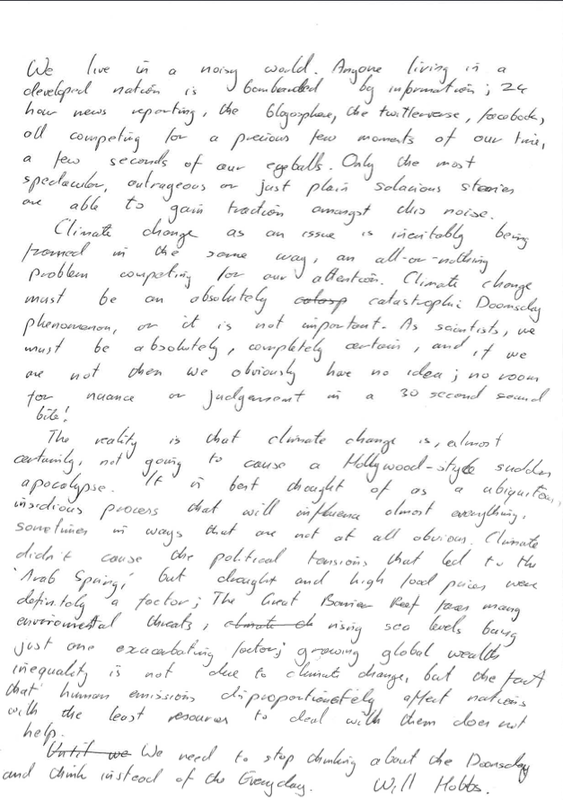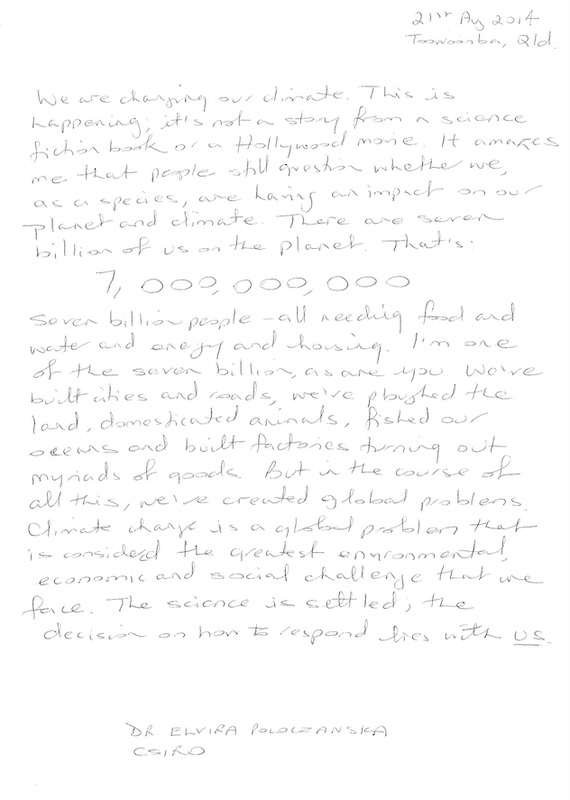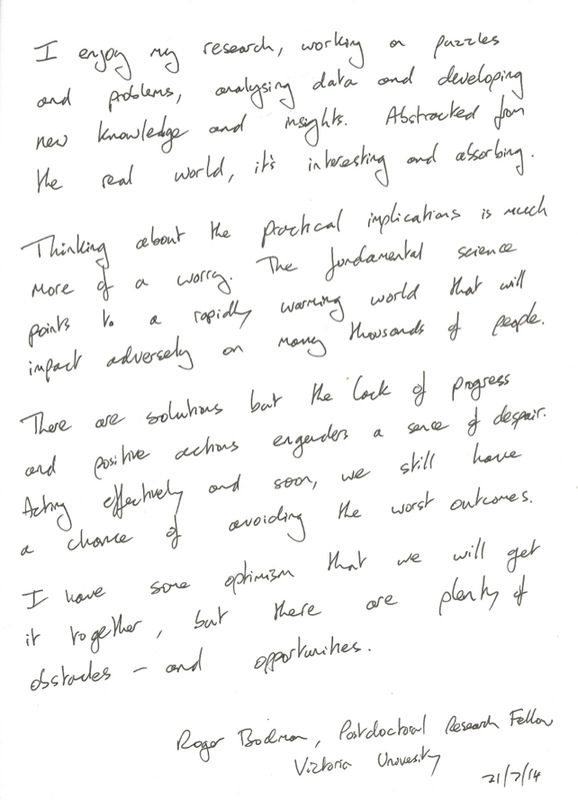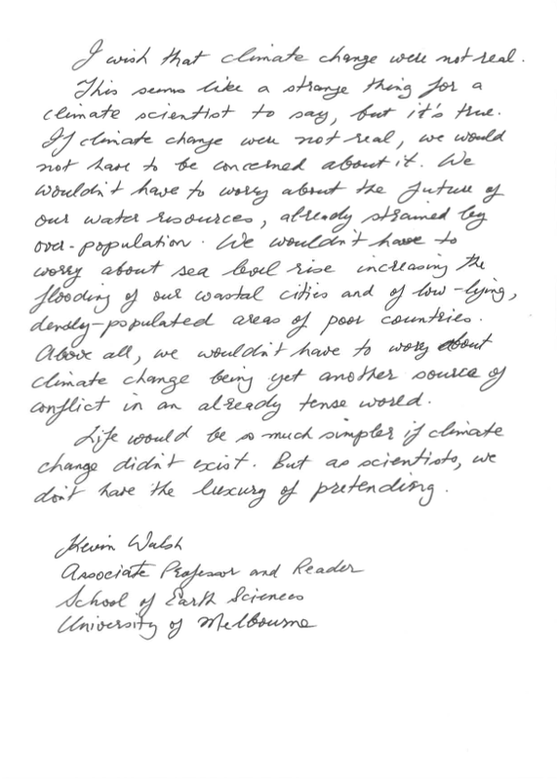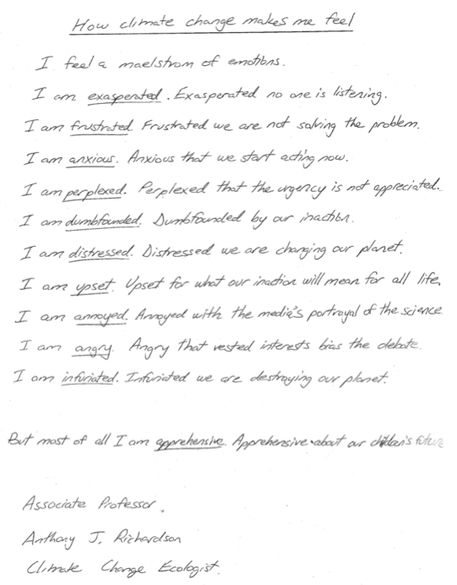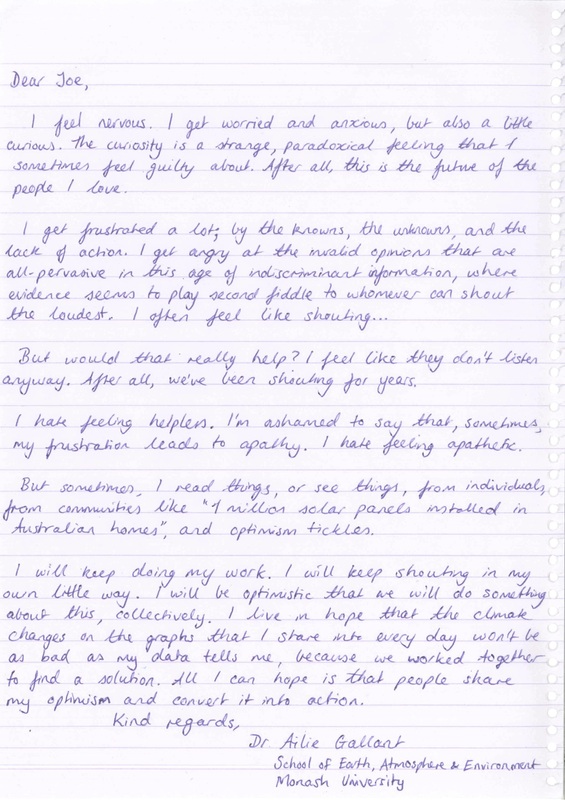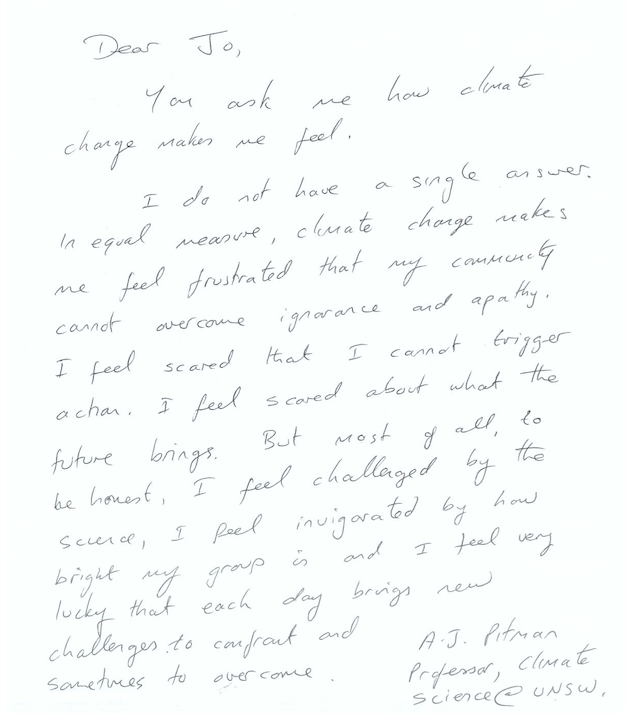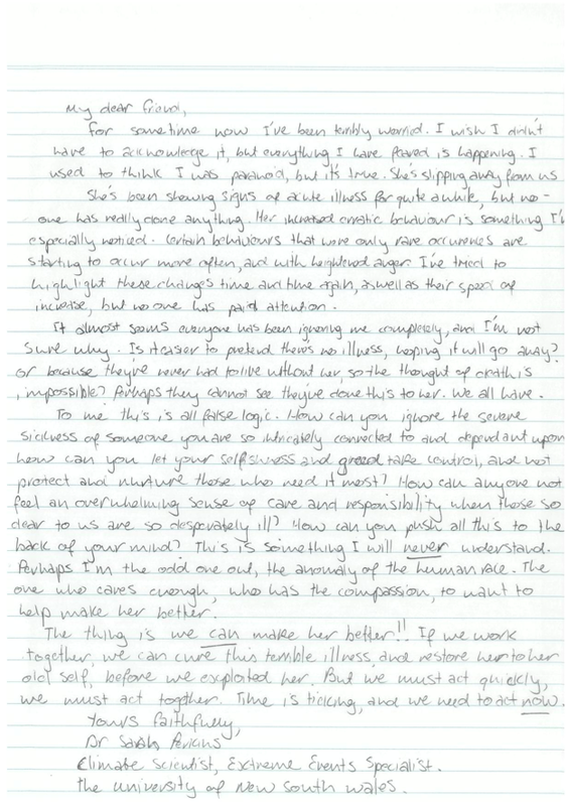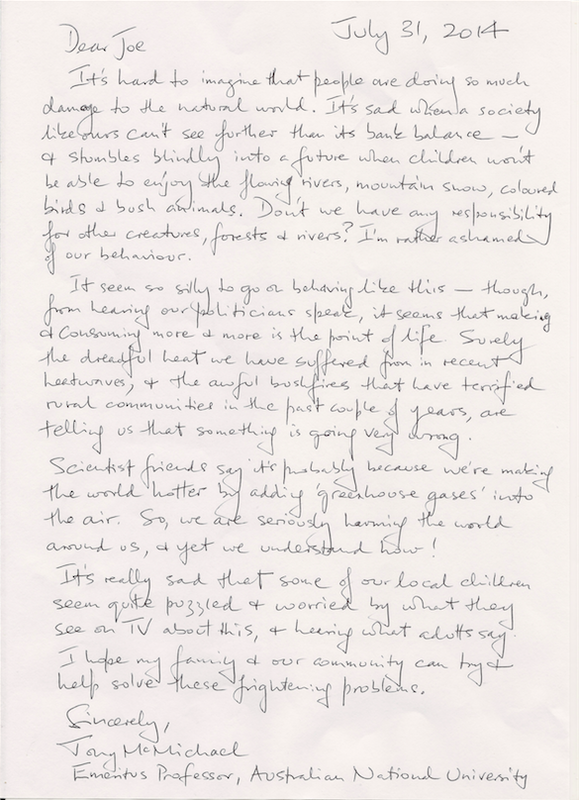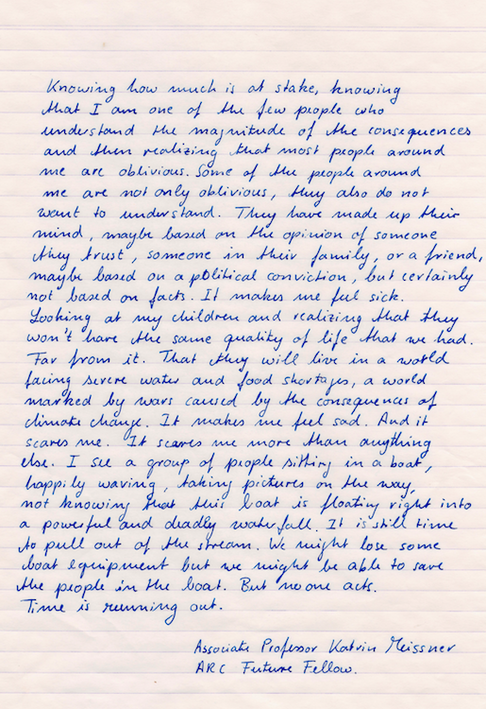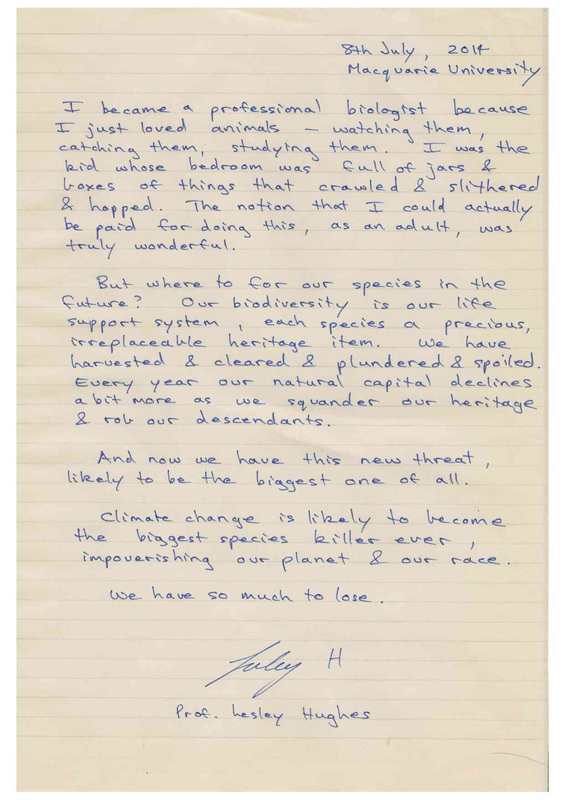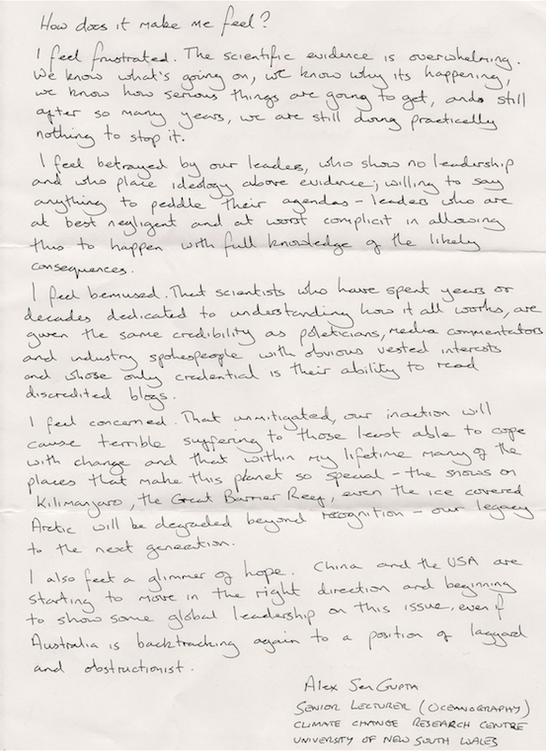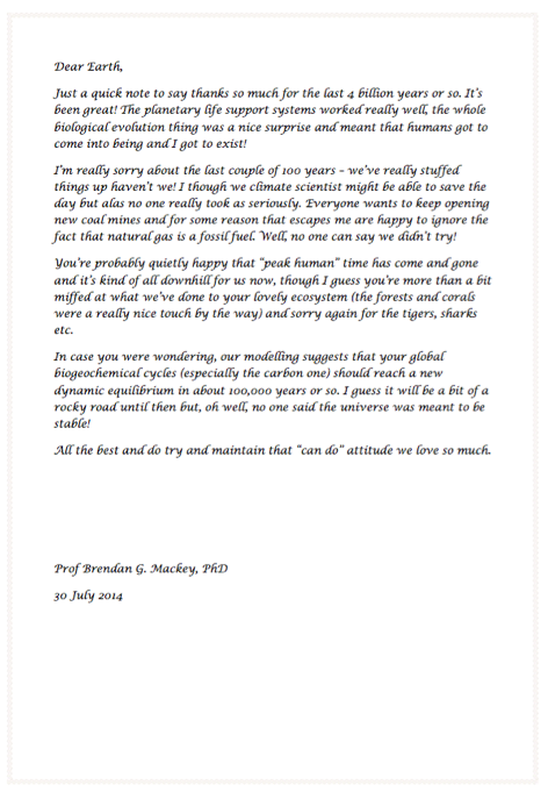The Scientists
Climate change is a complex and intimidating threat. You can't see it when you look out your bedroom window. Its impacts are often not immediately noticeable, nor are the benefits of acting against it.
Luckily there are a large group of passionate individuals who have dedicated their lives to studying climate change. These people write complex research papers, unpacking every aspect of climate change, analysing it thoroughly and clinically. They understand the numbers, the facts and the figures. They know what is causing it, what the impacts will be and how we can minimise these impacts.
But they're not robots. These scientists are mothers, fathers, grandparents, daughters. They are real people. And they're concerned.
Luckily there are a large group of passionate individuals who have dedicated their lives to studying climate change. These people write complex research papers, unpacking every aspect of climate change, analysing it thoroughly and clinically. They understand the numbers, the facts and the figures. They know what is causing it, what the impacts will be and how we can minimise these impacts.
But they're not robots. These scientists are mothers, fathers, grandparents, daughters. They are real people. And they're concerned.
Letters written in 2020
Below are a selection of first time contributors to ITHYF
Below are a selection of first time contributors to ITHYF
Letters written in 2014-2016
Many of these researchers have written new letters in 2020. Click here to see the collection: ITHYF5
Many of these researchers have written new letters in 2020. Click here to see the collection: ITHYF5
2020:
Professor Greta Pecl
Marine ecologist, science communicator
Institute for Marine and Antarctic Studies and Centre for Marine Socioecology UTAS
Marine ecologist, science communicator
Institute for Marine and Antarctic Studies and Centre for Marine Socioecology UTAS
I put off writing this for a long time as I really struggle to put into words how I feel about climate change, and our society’s response to it.
On one hand, I am truly baffled as to how people can not accept the science of climate change. The last three IPCC reports alone report on almost 20,000 (!!) peer-reviewed scientific studies and considered over 100,000 review comments. Whilst climate change is incredibly complex and there is uncertainty around some of the details there is absolutely no doubt at all that it is happening, it is a result of greenhouse gasses and that we need to reduce emissions and adapt asap. On the other hand, I just don’t want to believe it either and I really wish it wasn’t happening. So I can understand how people deny it. Although the conspiracy theories around climate change drive me insane, I can see how it would be comforting to believe them, in contrast to the reality of climate change. I would so dearly love for our work on climate change to be wrong. But sadly it isn’t.
I feel gutted by the impacts of climate change in Australia over the last decade – and we are “locked in” to at least four more decades of warming. I learnt to SCUBA dive off the Great Barrier Reef and it is a magnificent natural wonder of the world. I really thought when we had massive bleaching in 2016 that this would be the moment that Australians would wake up to the horror of climate change and demand action. But they didn’t not in 2016, not in 2017 and not in 2020 – three major bleachings in just five years. I felt similarly numb watching our country burn last summer. Again, climate impacts predicted by climate scientists, and again dismissed as a food enough reason to not act on climate change.
I also feel pretty guilty. As a well off educated western person, I will probably be fine in the decades to come, whereas the indigenous communities and the coastal communities in lower income countries that I’ve worked with – who have collectively done very little in terms of emissions – will be hit the hardest with the least capacity to adapt.
I feel upset for young people of the future – how can we do this to the?! It breaks my heart that at a time in the world’s history where we have never known more, or had more resources at out disposal, we are knowingly, willingly leaving future generations with a planet in much worse condition that what we were entrusted with. People of the future will quite rightly be so mad at us (and wonder how we could be so stupid).
I do still have hope though. In theory, we could have a future – that addressed climate change AND many of the inequities in the world – that actually looked good. It is absolutely technically possible. I also think the response to COVID has shown us that the world IS capable of working together and responding quickly when it wants to. The actions and voices of young people also give me hope, although it very much upsets me that we place the burden of action on their shoulders.
Ultimately I do the research and communication work that I do as I just want to be able to look future generations, including my own children, in the eye and say with honesty that I did the best I could at the time. Although it’s tempting, I won’t let myself lose hope because a future where we give up is just too horrible to contemplate. I won’t do that to my kids. Or yours.
Gretta Pecl
Professor, Marine ecologist, science communicator
Institute for Marine and Antarctic Studies and Centre for Marine Socioecology UTAS
On one hand, I am truly baffled as to how people can not accept the science of climate change. The last three IPCC reports alone report on almost 20,000 (!!) peer-reviewed scientific studies and considered over 100,000 review comments. Whilst climate change is incredibly complex and there is uncertainty around some of the details there is absolutely no doubt at all that it is happening, it is a result of greenhouse gasses and that we need to reduce emissions and adapt asap. On the other hand, I just don’t want to believe it either and I really wish it wasn’t happening. So I can understand how people deny it. Although the conspiracy theories around climate change drive me insane, I can see how it would be comforting to believe them, in contrast to the reality of climate change. I would so dearly love for our work on climate change to be wrong. But sadly it isn’t.
I feel gutted by the impacts of climate change in Australia over the last decade – and we are “locked in” to at least four more decades of warming. I learnt to SCUBA dive off the Great Barrier Reef and it is a magnificent natural wonder of the world. I really thought when we had massive bleaching in 2016 that this would be the moment that Australians would wake up to the horror of climate change and demand action. But they didn’t not in 2016, not in 2017 and not in 2020 – three major bleachings in just five years. I felt similarly numb watching our country burn last summer. Again, climate impacts predicted by climate scientists, and again dismissed as a food enough reason to not act on climate change.
I also feel pretty guilty. As a well off educated western person, I will probably be fine in the decades to come, whereas the indigenous communities and the coastal communities in lower income countries that I’ve worked with – who have collectively done very little in terms of emissions – will be hit the hardest with the least capacity to adapt.
I feel upset for young people of the future – how can we do this to the?! It breaks my heart that at a time in the world’s history where we have never known more, or had more resources at out disposal, we are knowingly, willingly leaving future generations with a planet in much worse condition that what we were entrusted with. People of the future will quite rightly be so mad at us (and wonder how we could be so stupid).
I do still have hope though. In theory, we could have a future – that addressed climate change AND many of the inequities in the world – that actually looked good. It is absolutely technically possible. I also think the response to COVID has shown us that the world IS capable of working together and responding quickly when it wants to. The actions and voices of young people also give me hope, although it very much upsets me that we place the burden of action on their shoulders.
Ultimately I do the research and communication work that I do as I just want to be able to look future generations, including my own children, in the eye and say with honesty that I did the best I could at the time. Although it’s tempting, I won’t let myself lose hope because a future where we give up is just too horrible to contemplate. I won’t do that to my kids. Or yours.
Gretta Pecl
Professor, Marine ecologist, science communicator
Institute for Marine and Antarctic Studies and Centre for Marine Socioecology UTAS
Dr Jess Melbourne-Thomas
Transdisciplinary Researcher & Knowledge Broker
Oceans & Atmosphere, CSIRO
Transdisciplinary Researcher & Knowledge Broker
Oceans & Atmosphere, CSIRO
The way I feel about climate change has changed a lot in the last few years.
First – I had kids. And that has inevitably changed the way I feel about the future, their future. Now I feel worried and sad in a way I didn’t feel as intensely before. Worried about what the world will look like as they grow up. Sad because some of the amazing things I’ve seen in my lifetime – a healthy Great Barrier Reef, kelp forests off the coast of Tassie – won’t be there for them.
But I am also hopeful in a different way too. Hopeful that if we can help future generations to be problem solvers then maybe they can turn things around in a way we haven’t been able to so far. Inspired by the likes of Greta Thunberg.
Sometimes I feel frustrated – that the time to act is running out far too quickly. Around me I see a lot of people feeling helpless. I hope this is something that science can change.
And in fact I think that science HAS helped people feel that little bit more ‘in-control’ during COVID-19 pandemic. Many of us HAVE listened to, and acted on, scientific advice. We did so quickly and collaboratively. I feel hope that maybe COVID-19 can change the game for climate action – our chance to change the Earth’s trajectory.
Jess Melbourne – Thomas
Antarctic, marine and climate change scientist.
First – I had kids. And that has inevitably changed the way I feel about the future, their future. Now I feel worried and sad in a way I didn’t feel as intensely before. Worried about what the world will look like as they grow up. Sad because some of the amazing things I’ve seen in my lifetime – a healthy Great Barrier Reef, kelp forests off the coast of Tassie – won’t be there for them.
But I am also hopeful in a different way too. Hopeful that if we can help future generations to be problem solvers then maybe they can turn things around in a way we haven’t been able to so far. Inspired by the likes of Greta Thunberg.
Sometimes I feel frustrated – that the time to act is running out far too quickly. Around me I see a lot of people feeling helpless. I hope this is something that science can change.
And in fact I think that science HAS helped people feel that little bit more ‘in-control’ during COVID-19 pandemic. Many of us HAVE listened to, and acted on, scientific advice. We did so quickly and collaboratively. I feel hope that maybe COVID-19 can change the game for climate action – our chance to change the Earth’s trajectory.
Jess Melbourne – Thomas
Antarctic, marine and climate change scientist.
Dr Linden Ashcroft
Climate Researcher and Lecturer
University of Melbourne
Climate Researcher and Lecturer
University of Melbourne
Dear Joe,
How I feel changes from day to day. I used to feel a lot of anger and frustration about inaction and deliberate misinformation, but it feels that we are beyond that now. Let these people have their madness, climate change doesn’t care whether they accept its existence or not.
Lately I mainly feel guilt, and grief. My first child is due in June and I am acutely aware of how selfish it is to bring a new person into a future that looks so grim. I feel guilty for doing that to her, and for partially causing that future.
Grief is present too, particularly after last summer’s devastating bushfires. The world we know is disappearing. Yes, there will still be places and people, community spirit and beauty, but they will occur - are already occurring - with a different backdrop to the safe world I grew up in. That is profoundly sad.
Sometimes I feel a mad jolt of hope. My work is on historical weather, our climate of the past. I think of the extreme weather we’ve seen in the 19th and early 20th centuries and hope desperately that the positive trends and broken records are part of something else. But then reality hits, and I know there can only be one explanation. Climate change is real, it’s bad and it’s us.
And sometimes I feel a much stronger form of hope, in us as people, to harness the many opportunities to work together, to make the most of the brilliance and technology we have as a species, and steer ourselves towards a safer future. It’s that hope that I will pass onto my daughter.
Sincerely,
Linden Ashcroft
Climate researcher and lecturer,
University of Melbourne
How I feel changes from day to day. I used to feel a lot of anger and frustration about inaction and deliberate misinformation, but it feels that we are beyond that now. Let these people have their madness, climate change doesn’t care whether they accept its existence or not.
Lately I mainly feel guilt, and grief. My first child is due in June and I am acutely aware of how selfish it is to bring a new person into a future that looks so grim. I feel guilty for doing that to her, and for partially causing that future.
Grief is present too, particularly after last summer’s devastating bushfires. The world we know is disappearing. Yes, there will still be places and people, community spirit and beauty, but they will occur - are already occurring - with a different backdrop to the safe world I grew up in. That is profoundly sad.
Sometimes I feel a mad jolt of hope. My work is on historical weather, our climate of the past. I think of the extreme weather we’ve seen in the 19th and early 20th centuries and hope desperately that the positive trends and broken records are part of something else. But then reality hits, and I know there can only be one explanation. Climate change is real, it’s bad and it’s us.
And sometimes I feel a much stronger form of hope, in us as people, to harness the many opportunities to work together, to make the most of the brilliance and technology we have as a species, and steer ourselves towards a safer future. It’s that hope that I will pass onto my daughter.
Sincerely,
Linden Ashcroft
Climate researcher and lecturer,
University of Melbourne
Professor Johan Rockström
Director, Potsdam Institute for Climate Impact Research (PIK)
Director, Potsdam Institute for Climate Impact Research (PIK)
How do I feel about the climate crisis?
We have a planetary crisis, which we have been warning about for decades. It has now reached a point of planetary emergency, where we are desperately calling for global collaboration. and a world rising to the challenge of transforming all Nations, businesses and communities to zero carbon and zero loss of nature within 30 years (2050). A global Revolution! And our calls are essentially leading to marginal change at best... My feeling about this? Well, deep frustration.
And then comes the corona crisis, a pandemic sweeps the world and pushes us into the deepest crisis since WWII. What happensL The world rises to the challenge , and sets everything else aside, and ploughs trillions of USD into saving jobs and the economy. We are at War, to cite Trump, Macron and Merkel. People are dying and Covid-19 is a disaster, no doubt. But it is a momentary shock, compared to the existential crisis of destroying our planet. And we know that the pandemic is a manifestation of the Anthropocene. A result of dense living, global trade and travel, interacting with deforestation and global warming.
A perfect storm, playing out in front of us. The lesson to be learnt? Well, in my mind; That we can! We can rise as a global community to attack this global threat. If we can do it to solve the corona crisis, then we of course can do it to solve the climate crisis. So, let's do it.
But, unfortunately, I am sure the default action will rather be to backtrack on previous commitments on climate action, rather than doing the only responsible thing to do, namely to integrate the agendas into a true economic recovery for Human and Planetary Health.
So, my feeling is frustration, concern and an element of anger. Anger at our inability to rise in the face of a planetary emergency. But also anger at our inability to rise, now that we see more and more evidence that the solutions are in our hand!
So, not only must we transform back into Earth's safe operating space, we can and we benefit from doing so! We have a more attractive, advanced and equitable world waiting for us out there, and still we are not grasping the opportunity.
Damn it, if we let this crisis slip away...
Johan Rockström
Professor Earth System Science
Director Potsdam Institute Climate Impact Research (PIK)
We have a planetary crisis, which we have been warning about for decades. It has now reached a point of planetary emergency, where we are desperately calling for global collaboration. and a world rising to the challenge of transforming all Nations, businesses and communities to zero carbon and zero loss of nature within 30 years (2050). A global Revolution! And our calls are essentially leading to marginal change at best... My feeling about this? Well, deep frustration.
And then comes the corona crisis, a pandemic sweeps the world and pushes us into the deepest crisis since WWII. What happensL The world rises to the challenge , and sets everything else aside, and ploughs trillions of USD into saving jobs and the economy. We are at War, to cite Trump, Macron and Merkel. People are dying and Covid-19 is a disaster, no doubt. But it is a momentary shock, compared to the existential crisis of destroying our planet. And we know that the pandemic is a manifestation of the Anthropocene. A result of dense living, global trade and travel, interacting with deforestation and global warming.
A perfect storm, playing out in front of us. The lesson to be learnt? Well, in my mind; That we can! We can rise as a global community to attack this global threat. If we can do it to solve the corona crisis, then we of course can do it to solve the climate crisis. So, let's do it.
But, unfortunately, I am sure the default action will rather be to backtrack on previous commitments on climate action, rather than doing the only responsible thing to do, namely to integrate the agendas into a true economic recovery for Human and Planetary Health.
So, my feeling is frustration, concern and an element of anger. Anger at our inability to rise in the face of a planetary emergency. But also anger at our inability to rise, now that we see more and more evidence that the solutions are in our hand!
So, not only must we transform back into Earth's safe operating space, we can and we benefit from doing so! We have a more attractive, advanced and equitable world waiting for us out there, and still we are not grasping the opportunity.
Damn it, if we let this crisis slip away...
Johan Rockström
Professor Earth System Science
Director Potsdam Institute Climate Impact Research (PIK)
Dr Ariaan Purich
Research Associate, Climate Change Research Centre
University of New South Wales
Research Associate, Climate Change Research Centre
University of New South Wales
Dear Joe,
How do I feel? Thanks for asking.
First, I was a climate scientist. I felt worried about how the impacts of climate change would affect our beautiful planet, and incredibly frustrated by the lack of Australian action on something so critically important.
And then I become a mother. Now I am terrified. Terrified of the world my children will inherit, and also of the people who won’t do anything about it. Don’t any of them have children too?
The days pass, and sometimes, somehow, I forget I am terrified – I am busy with data analysis and nappy changes, with writing articles and preparing snacks. And then something happens, like the bushfires of last summer, and I am crippled with terror again. It’s not just the world that my children will inherit that I’m terrified of. It’s the world now.
As I write this, the coronavirus pandemic is sweeping across the globe. I am worried by the pandemic, but it also leaves me hopeful. Governments are responding drastically based on scientific recommendations. They are demonstrating it is possible! So, I am hopeful that when the pandemic is over, our governments can turn their focus to the climate emergency as we rebuild and reinvent our livelihoods.
Kindest regards,
Ariaan Purich, PhD
Research Associate, UNSW
How do I feel? Thanks for asking.
First, I was a climate scientist. I felt worried about how the impacts of climate change would affect our beautiful planet, and incredibly frustrated by the lack of Australian action on something so critically important.
And then I become a mother. Now I am terrified. Terrified of the world my children will inherit, and also of the people who won’t do anything about it. Don’t any of them have children too?
The days pass, and sometimes, somehow, I forget I am terrified – I am busy with data analysis and nappy changes, with writing articles and preparing snacks. And then something happens, like the bushfires of last summer, and I am crippled with terror again. It’s not just the world that my children will inherit that I’m terrified of. It’s the world now.
As I write this, the coronavirus pandemic is sweeping across the globe. I am worried by the pandemic, but it also leaves me hopeful. Governments are responding drastically based on scientific recommendations. They are demonstrating it is possible! So, I am hopeful that when the pandemic is over, our governments can turn their focus to the climate emergency as we rebuild and reinvent our livelihoods.
Kindest regards,
Ariaan Purich, PhD
Research Associate, UNSW
Dr Joanne S. Johnson,
British Antarctic Survey
British Antarctic Survey
I am writing this sitting (in) my home “office: during the covid-19 crisis. If you had asked me for my thoughts on climate change a few months ago, I would have said it was getting high on the world’s agenda. I thought finally we were getting somewhere. But now I am worried because fixing the global pandemic has become the immediate priority. On the other hand, the pandemic has shown us that we are capable of making big improvements to our quality of life, especially the environment, if everyone works together. I find that promising for addressing the climate crisis. We are currently enjoying cleaner air, quieter roads, and hearing birdsong in our towns and cities for the first time. And the amount of flying around the world has decreased massively, which will no doubt have a big impact (on) carbon dioxide levels, even if it’s only short-lived. I hope that when the covid crisis has calmed down, people will realise how much better our lives are as a result of some of the changes we have made, and that world leaders will feel bolder to lead large-scale changes that they would previously have shied away from.
I certainly believe we have a climate emergency on our hands. I have been working as a geologist looking at past ice sheet change for over a decade. But is was only a couple of years ago that I really woke up to the urgency of the situation in Antarctica some of my colleagues went on a research cruise to Thwaites Glacier and the news reports made me sit up in a way I haven’t before. I realised that the changes they were witnessing indicated that the glacier is very unstable. Of course scientists had been saying that for a while, but it wasn’t until I heard the anxiety in my colleagues; voices that it felt real to me. Then last winter I worked near Thwaites myself, in a place I had been nearly 15 years previously. Back in 2006, open water wasn’t visible from the field sites, but this time, the sea was clearly visible and there was a huge crack in the glacier. The amount of retreat that had occurred in 10 years was painful to see. When I was interviewed by Sky News afterwards, I felt very emotional about it- there is something very significant about seeing these things for oneself. The media have a very important role in communicating what is happening to our climate to those who cannot go to Antarctica.
In summary, I hope the shake-up of our world after the pandemic will provide motivation to make the changes we need to slow climate change. But I worry that the progress that was previously being made will be lost as people struggle with their day-to-day existence. One thing I feel sure about though; more people now appreciate the role of science in helping us deal with global crises of all kinds. I hope this means they are more likely to take action on climate change when scientists call for it in the future.
Dr Joanne S. Johnson, Geologist,
British Antarctic Survey,
U.K.
I certainly believe we have a climate emergency on our hands. I have been working as a geologist looking at past ice sheet change for over a decade. But is was only a couple of years ago that I really woke up to the urgency of the situation in Antarctica some of my colleagues went on a research cruise to Thwaites Glacier and the news reports made me sit up in a way I haven’t before. I realised that the changes they were witnessing indicated that the glacier is very unstable. Of course scientists had been saying that for a while, but it wasn’t until I heard the anxiety in my colleagues; voices that it felt real to me. Then last winter I worked near Thwaites myself, in a place I had been nearly 15 years previously. Back in 2006, open water wasn’t visible from the field sites, but this time, the sea was clearly visible and there was a huge crack in the glacier. The amount of retreat that had occurred in 10 years was painful to see. When I was interviewed by Sky News afterwards, I felt very emotional about it- there is something very significant about seeing these things for oneself. The media have a very important role in communicating what is happening to our climate to those who cannot go to Antarctica.
In summary, I hope the shake-up of our world after the pandemic will provide motivation to make the changes we need to slow climate change. But I worry that the progress that was previously being made will be lost as people struggle with their day-to-day existence. One thing I feel sure about though; more people now appreciate the role of science in helping us deal with global crises of all kinds. I hope this means they are more likely to take action on climate change when scientists call for it in the future.
Dr Joanne S. Johnson, Geologist,
British Antarctic Survey,
U.K.
2014-2016:
Dr Lindsey Nicholson
Glaciological group leader
University of Innsbruck, Austria
Glaciological group leader
University of Innsbruck, Austria
How do I feel about climate change?
I feel sad, ashamed, fearful, and often frustrated and helpless.
I see current climate change as part of a wider human caused environmental depreciation and it saddens me how we behave towards the natural environment. I’m ashamed about what we are knowingly doing to our planet. Especially when, for me, and I imagine many others, being in the natural environment is one of the greatest sources of solace and joy to be had.
I live in a small home, use green energy, turn off the lights, share my car and prefer my bike over it, eat meat only rarely, avoid packaging if I can, and so on. But my whole lifestyle is still a kind of aberration of the natural systems we evolved in. Am I doing enough? Enough to legitimately ask others to do something too? Probably not.
I’m afraid we will wait too long to make the wholesale changes in attitudes and governance needed to improve our situation. As a result, I fear for the future of people in countries too poor to bring effective adaptation strategies to bear. I also fear that those of us in wealthier countries might not respond with the requisite humanity to help – what would that mean for us?
It’s frustrating that we seem to be in possession of all the understanding ad solutions to change our destructive ways and deal with the consequences of them, but there is a collective lack of will to do it. I feel helpless because I feel poorly equipped to stir people or our leaders to force change.
But I try, will continue to try, and I hope you will too.
I feel sad, ashamed, fearful, and often frustrated and helpless.
I see current climate change as part of a wider human caused environmental depreciation and it saddens me how we behave towards the natural environment. I’m ashamed about what we are knowingly doing to our planet. Especially when, for me, and I imagine many others, being in the natural environment is one of the greatest sources of solace and joy to be had.
I live in a small home, use green energy, turn off the lights, share my car and prefer my bike over it, eat meat only rarely, avoid packaging if I can, and so on. But my whole lifestyle is still a kind of aberration of the natural systems we evolved in. Am I doing enough? Enough to legitimately ask others to do something too? Probably not.
I’m afraid we will wait too long to make the wholesale changes in attitudes and governance needed to improve our situation. As a result, I fear for the future of people in countries too poor to bring effective adaptation strategies to bear. I also fear that those of us in wealthier countries might not respond with the requisite humanity to help – what would that mean for us?
It’s frustrating that we seem to be in possession of all the understanding ad solutions to change our destructive ways and deal with the consequences of them, but there is a collective lack of will to do it. I feel helpless because I feel poorly equipped to stir people or our leaders to force change.
But I try, will continue to try, and I hope you will too.
Professor Emeritus Neville Nicholls
School of Earth, Atmosphere and Environment
Monash University
School of Earth, Atmosphere and Environment
Monash University
How do I feel about climate change?
I feel confident that we WILL reduce emissions to slow global warming to a pace to which we can (mostly) adapt.
Why am I so confident?
Firstly, because in 2015, more than 1.5% of all articles in the New York Times mentioned “climate change”. This compares with 2% of articles that mentioned “terrorism” and 1.4% that mentioned “refugees”. As in other countries, the media profile of “climate change” is now very strong – politicians and the public see reports about our changing climate almost daily.
Secondly, in 2015 over 15,000 scholarly papers were published with the topic of “climate “change”, “greenhouse effect”, or “global warming” as the topic. In 1988, the year the IPCC was established, only 68 scholarly articles published on these topics.
With such strong and growing media and expert interest, how can we fail?
Neville Nicholls Professor Emeritus, School of Earth, Atmosphere and Environment Monash University, Australia
I feel confident that we WILL reduce emissions to slow global warming to a pace to which we can (mostly) adapt.
Why am I so confident?
Firstly, because in 2015, more than 1.5% of all articles in the New York Times mentioned “climate change”. This compares with 2% of articles that mentioned “terrorism” and 1.4% that mentioned “refugees”. As in other countries, the media profile of “climate change” is now very strong – politicians and the public see reports about our changing climate almost daily.
Secondly, in 2015 over 15,000 scholarly papers were published with the topic of “climate “change”, “greenhouse effect”, or “global warming” as the topic. In 1988, the year the IPCC was established, only 68 scholarly articles published on these topics.
With such strong and growing media and expert interest, how can we fail?
Neville Nicholls Professor Emeritus, School of Earth, Atmosphere and Environment Monash University, Australia
Dr Anna Harper
Research Fellow
University of Exeter
Research Fellow
University of Exeter
Climate change presents us with a huge challenge: moving from a society built on fossil fuels to something cleaner and more sustainable. I don’t really have feelings on the science of climate change, but I do have feelings about the cacophony of opinions and misdirection around the question of “what do we do about climate change?” On this topic, I feel discouraged, frustrated, and powerless.
I am discouraged that the message is not getting out that we cant wait for action – we needed to reduce greenhouse gas emissions yesterday to avoid habitat loss, sea level rise which endanger the lives of many, and more drought.
I feel frustrated that I cannot even convince those closest to me that we are, as a society, being irresponsible, and our children, grandchildren, and people around the world will pay the price. Don’t we feel compassion for these people and the life we are signing them up for?
And sometimes I feel powerless in the face of powerful forces arguing against action.
But I think there is reason for optimism! Climate change presents us with a huge opportunity to redefine how we live in the world. Humans are remarkably resilient, creative and intelligent. Over the past couple of centuries we’ve gone from a world of manual labor and subsistence agriculture to a world where we can buy iPads in vending machines before we fly across the planet. The inventions of the past 150 years rocked the world – why should we expect people to stop inventing, creating, exploring, and pushing the boundaries of what we think is possible?
This is why I am optimistic. We know what we need to do- reduce reliance on fossil fuels, reduce the land needed for intensive agriculture, find ways to use less energy and materials, or re-use materials we already have. In fact – there’s chances for people to make tons of money from these inventions and technologies!
Now is the time to apply all of our creativity and innovation to the big problem… So I am hopeful, in the end.
Yours,
Anna Harper
Research Fellow
University of Exeter, UK
I am discouraged that the message is not getting out that we cant wait for action – we needed to reduce greenhouse gas emissions yesterday to avoid habitat loss, sea level rise which endanger the lives of many, and more drought.
I feel frustrated that I cannot even convince those closest to me that we are, as a society, being irresponsible, and our children, grandchildren, and people around the world will pay the price. Don’t we feel compassion for these people and the life we are signing them up for?
And sometimes I feel powerless in the face of powerful forces arguing against action.
But I think there is reason for optimism! Climate change presents us with a huge opportunity to redefine how we live in the world. Humans are remarkably resilient, creative and intelligent. Over the past couple of centuries we’ve gone from a world of manual labor and subsistence agriculture to a world where we can buy iPads in vending machines before we fly across the planet. The inventions of the past 150 years rocked the world – why should we expect people to stop inventing, creating, exploring, and pushing the boundaries of what we think is possible?
This is why I am optimistic. We know what we need to do- reduce reliance on fossil fuels, reduce the land needed for intensive agriculture, find ways to use less energy and materials, or re-use materials we already have. In fact – there’s chances for people to make tons of money from these inventions and technologies!
Now is the time to apply all of our creativity and innovation to the big problem… So I am hopeful, in the end.
Yours,
Anna Harper
Research Fellow
University of Exeter, UK
Professor Stefan Rahmstorf
Head of Earth System Analysis
Potsdam Institute for Climate Impact Research
Head of Earth System Analysis
Potsdam Institute for Climate Impact Research
Sometimes I have this dream.
I’m going for a hike and discover a remote farm house on fire.
Children are calling for help from the upper windows. So I call the fire brigade. But they don’t come, because some mad person keeps telling them that it is a false alarm.
The situation is getting more and more desperate, but I cant convince the firemen to get going.
I cannot wake up from this nightmare.
Stefan Rahmstorf.
I’m going for a hike and discover a remote farm house on fire.
Children are calling for help from the upper windows. So I call the fire brigade. But they don’t come, because some mad person keeps telling them that it is a false alarm.
The situation is getting more and more desperate, but I cant convince the firemen to get going.
I cannot wake up from this nightmare.
Stefan Rahmstorf.
Dr Jessica Carilli
Assistant Professor
University of Massachusetts Boston
Assistant Professor
University of Massachusetts Boston
How I feel about climate change:
· Dismayed
· Depressed
· Powerless
· Sad
· Overwhelmed
-But also-
· Hopeful
· Unwilling to give up
I am a scientist mostly focussed on studying precisely how human activities are destroying coral reefs. On coral reefs climate change effects are hugely obvious and very depressing. Huge swaths of coral have died due to heat stress and more will continue unless drastic changes occur.
It is very hard not to feel totally overwhelmed buy the magnitude of the problem and depressed by the extreme apathy of most of the worlds population (it seems) towards doing anything about climate change.
But then there are bright spots of hope:
- Suggestions of political will to actually change emissions.
- Amazing ingenuity from people designing new fuels and engineering clever solutions to counteract emissions.
- Some bits of evidence that the natural world is more resilient than it may at first appear (sometimes).
- Grass roots movements to make lifestyle changes and create community momentum towards sustainable living.
I’m not yet willing to give up on a future where humans live lightly upon the planet, and I hope that you are not, either.
All together we can fix this mess. But we do need to try!
Jessica Carilli, PhD Earth Science
Assistant Professor, UMass Boston.
· Dismayed
· Depressed
· Powerless
· Sad
· Overwhelmed
-But also-
· Hopeful
· Unwilling to give up
I am a scientist mostly focussed on studying precisely how human activities are destroying coral reefs. On coral reefs climate change effects are hugely obvious and very depressing. Huge swaths of coral have died due to heat stress and more will continue unless drastic changes occur.
It is very hard not to feel totally overwhelmed buy the magnitude of the problem and depressed by the extreme apathy of most of the worlds population (it seems) towards doing anything about climate change.
But then there are bright spots of hope:
- Suggestions of political will to actually change emissions.
- Amazing ingenuity from people designing new fuels and engineering clever solutions to counteract emissions.
- Some bits of evidence that the natural world is more resilient than it may at first appear (sometimes).
- Grass roots movements to make lifestyle changes and create community momentum towards sustainable living.
I’m not yet willing to give up on a future where humans live lightly upon the planet, and I hope that you are not, either.
All together we can fix this mess. But we do need to try!
Jessica Carilli, PhD Earth Science
Assistant Professor, UMass Boston.
Dr Carlo Buontempo
European Climate Service Team Leader
Met Office Hadley Centre
European Climate Service Team Leader
Met Office Hadley Centre
I feel tired!
This is how I feel about climate change. At times I think this is not right. There is so much noise around the issue that I often feel compelled to be outraged by our own inability as a species to response to the challenge climate change poses. But the truth is that more often than not I just feel tired.
As a scientist I found consensus incredibly boring! What motivated me to become a scientist in the first place was my desire to explain and model things we did not understand. It was never about preaching others about an existing scientific consensus. I feel uncomfortable in this strange role nearly as much as I am in discussing about believing or not in climate change. I am also tired of a debate that often becomes confrontational, dogmatic and sterile.
But I am an optimist by nature and I like to think there is a lot we can do as scientists to reframe the dialogue between providers and users of climate information and present our collective knowledge in a way that is both more relevant and usable by us as a species. This is what I am working on at the moment.
Carlo Buontempo
This is how I feel about climate change. At times I think this is not right. There is so much noise around the issue that I often feel compelled to be outraged by our own inability as a species to response to the challenge climate change poses. But the truth is that more often than not I just feel tired.
As a scientist I found consensus incredibly boring! What motivated me to become a scientist in the first place was my desire to explain and model things we did not understand. It was never about preaching others about an existing scientific consensus. I feel uncomfortable in this strange role nearly as much as I am in discussing about believing or not in climate change. I am also tired of a debate that often becomes confrontational, dogmatic and sterile.
But I am an optimist by nature and I like to think there is a lot we can do as scientists to reframe the dialogue between providers and users of climate information and present our collective knowledge in a way that is both more relevant and usable by us as a species. This is what I am working on at the moment.
Carlo Buontempo
Agus Santoso
Senior Research Associate
University of New South Wales
Senior Research Associate
University of New South Wales
I feel overwhelmed by the debate surrounding Climate Change. The science behind climate change itself is intriguing. The debate is too, getting fiercer by the day, but also getting quite tiresome, because the motivation behind it is not purely science driven. Climate change is a multi-dimensional issue.
Dealing with a large population, things need to be regulated, and so this has become a political issue. As this has intruded into one’s belief on what is right or wrong, it has also become a sensitive issue. Good thing that there are now lots of places online where one can find solace, share common ground?
I am unsure if every one of us is aware of the concept ‘Anthropocene’, a period of rapid population increase, technology and science, with all the problems and the good things that come as a package, that we are in it, that our action as an aggregate puts significant impact on the biosphere.
The good things and comfort, we are addicted to and are deeply ingrained in our habitual patterns. The problems are too complex to solve. With that, it is hard to act, especially when it is a global problem, when it is easy to just point finger at someone else. It is easier not to act, to find the reasons not to act. But inaction is not a long-term solution for this. The science implies that we should somehow get our act together, the sooner the better, for the prosperity of future generations.
Best wishes,
Agus Santoso
Senior researcher, UNSW
Dealing with a large population, things need to be regulated, and so this has become a political issue. As this has intruded into one’s belief on what is right or wrong, it has also become a sensitive issue. Good thing that there are now lots of places online where one can find solace, share common ground?
I am unsure if every one of us is aware of the concept ‘Anthropocene’, a period of rapid population increase, technology and science, with all the problems and the good things that come as a package, that we are in it, that our action as an aggregate puts significant impact on the biosphere.
The good things and comfort, we are addicted to and are deeply ingrained in our habitual patterns. The problems are too complex to solve. With that, it is hard to act, especially when it is a global problem, when it is easy to just point finger at someone else. It is easier not to act, to find the reasons not to act. But inaction is not a long-term solution for this. The science implies that we should somehow get our act together, the sooner the better, for the prosperity of future generations.
Best wishes,
Agus Santoso
Senior researcher, UNSW
Professor Donald J. Wuebbles
Professor of Atmospheric Sciences
University of Illinois
Professor of Atmospheric Sciences
University of Illinois
My name is Don Wuebbles. I am an atmospheric scientist and a professor at the University of Illinois. I am an expert in the physics and chemistry affecting the Earths climate system. I am also the son of a farmer and both of my grandfathers were farmers and my wife’s farther was a farmer – we grew up with the concept of being stewards of the land and we care about the future abilities of farmers to be able to feed the world. I am also a father, with 3 sons and currently 3 grandsons. I am greatly concerned about the legacy we are leaving them and their peers because of the effects human activities are having on the Earth’s Climate. This is already affecting us and the potential impacts on humanity and the world around us are too great to ignore.
We need to take climate change seriously and resolve it to cause the least harm.
The science is clear, the Earth’s climate is changing, it is changing rapidly (much more rapid than occurs naturally), and the evidence clearly indicates it is human activities driving this change, especially from the burning of fossil fuels and from land use change. While climate has changed in the past, it has not changed this rapidly. The change in temperature, severe weather, and sea levels are also not due to the sun – if anything, solar output has decreased slightly in the last 4 decades. The observations clearly point to human activities as the reason for the changes we are seeing.
In The United States, we have already seen a huge increase in the costs, both economically and in lives, as a result of increasing trends in severe weather events.
Similar trends are occurring worldwide, these trends for more severe weather, more intense heat waves, more droughts in some regions, more flooding in others, and more severe precipitation, are all likely to continue. Sea levels could increase by 1-4 feet this century. The potential impacts of climate change on human health, on water resources, on agriculture, on energy and transportation, and on ecosystems are huge. We should all be concerned.
But I also have a sense of hope. Humanity has shown throughout history that we can solve our problems. We now need to turn our attention to climate change. We don’t want to leave the warming conditions late this century to our children and grandchildren to sort out.
We need to take climate change seriously and resolve it to cause the least harm.
The science is clear, the Earth’s climate is changing, it is changing rapidly (much more rapid than occurs naturally), and the evidence clearly indicates it is human activities driving this change, especially from the burning of fossil fuels and from land use change. While climate has changed in the past, it has not changed this rapidly. The change in temperature, severe weather, and sea levels are also not due to the sun – if anything, solar output has decreased slightly in the last 4 decades. The observations clearly point to human activities as the reason for the changes we are seeing.
In The United States, we have already seen a huge increase in the costs, both economically and in lives, as a result of increasing trends in severe weather events.
Similar trends are occurring worldwide, these trends for more severe weather, more intense heat waves, more droughts in some regions, more flooding in others, and more severe precipitation, are all likely to continue. Sea levels could increase by 1-4 feet this century. The potential impacts of climate change on human health, on water resources, on agriculture, on energy and transportation, and on ecosystems are huge. We should all be concerned.
But I also have a sense of hope. Humanity has shown throughout history that we can solve our problems. We now need to turn our attention to climate change. We don’t want to leave the warming conditions late this century to our children and grandchildren to sort out.
Professor Mark Maslin
Professor of Climatology
University College London
Professor of Climatology
University College London
What do I feel?
I feel the twenty first century is the ‘human century’ because of the huge global challenges we face. Of these I believe global poverty, global security, global inequality, environmental degradation and climate change are the most pressing. Of these climate change is the most insidious as it make all the other worse. So our challenge this century is to build win-win solutions that tackle these multiple challenges.
These are easy to conceptualise and design but of course much harder to implement given all the vested interests created by our warped global economy. However I see this century through the eyes of an optimist – as things are getting better for the majority of humanity though not nearly fast enough. I feel deep down that politicians and the public know our rules currently governing society are outdated and not fit for purpose and new governance systems will be required to deal with these immense challenges.
I know where there is humanity there is always hope.
As the late Leonard Nimoy would say
“Live long and prosper”
Mark Maslin
Professor of Climatology
University College London
I feel the twenty first century is the ‘human century’ because of the huge global challenges we face. Of these I believe global poverty, global security, global inequality, environmental degradation and climate change are the most pressing. Of these climate change is the most insidious as it make all the other worse. So our challenge this century is to build win-win solutions that tackle these multiple challenges.
These are easy to conceptualise and design but of course much harder to implement given all the vested interests created by our warped global economy. However I see this century through the eyes of an optimist – as things are getting better for the majority of humanity though not nearly fast enough. I feel deep down that politicians and the public know our rules currently governing society are outdated and not fit for purpose and new governance systems will be required to deal with these immense challenges.
I know where there is humanity there is always hope.
As the late Leonard Nimoy would say
“Live long and prosper”
Mark Maslin
Professor of Climatology
University College London
Dr Ruth Mottram
Danish Meteorological Institute
Danish Meteorological Institute
Dear Joe,
You have asked me how I feel about climate change. It’s probably the first time I have ever been asked to say what I feel, rather than what I think and it’s a hard question to answer.
In my day to day job I run simulations with a regional climate model of Greenland and the Arctic to see how glaciers, ice sheets and sea ice respond to greenhouse gas forcings. The processes and connections I am modelling and following are so familiar it is actually rather easy to bear witness to melting glaciers, rising sea level and vanishing sea ice with near complete detachment. Sometimes however, I am caught by surprise by a new result that at first appears counter-intuitive. Then I feel that beautiful complex mix of elation, surprise, bewilderment and satisfaction as another piece falls into place, that characterizes scientific understanding. It is endlessly fascinating watching how the planet reacts to a changing climate and we are learning so much about the earth system.
Then I go home and what seem like very arcane models and far-off projections start to seem much more real. 2050 (the year Denmark aims to become carbon neutral) is no longer impossibly distant to imagine but my children will be only a little older than I am now. I have a glimpse of the possible environment they will likely experience and it is sobering. I feel a profound sadness that they will be dealing with a much degraded environment. They will be living with severe problems of our making, an acidifying ocean, reduced biodiversity, extreme weather events, rising sea levels and an Arctic environment that is very different from today. I have no idea how to start to talk to them about this.
We live in a wealthy country that can (more or less) afford to adapt to climate change, but what of other nations? How will the rest of the world deal with these challenges? These are scary questions that I can’t answer. In spite of all this I do not feel depressed about the future. Humans are an amazingly adaptable and versatile species. We are at our best when we work together on our grand challenges. Let us hope so at any rate.
So, what do I feel about climate change? Interest, intellectual curiosity, satisfaction, excitement, extreme worry, sadness, fear and perhaps a glimmer of hope...
Yours sincerely
Dr Ruth Mottram
Klimaforsker/Climate Scientist
Danish Meteorological Institute
You have asked me how I feel about climate change. It’s probably the first time I have ever been asked to say what I feel, rather than what I think and it’s a hard question to answer.
In my day to day job I run simulations with a regional climate model of Greenland and the Arctic to see how glaciers, ice sheets and sea ice respond to greenhouse gas forcings. The processes and connections I am modelling and following are so familiar it is actually rather easy to bear witness to melting glaciers, rising sea level and vanishing sea ice with near complete detachment. Sometimes however, I am caught by surprise by a new result that at first appears counter-intuitive. Then I feel that beautiful complex mix of elation, surprise, bewilderment and satisfaction as another piece falls into place, that characterizes scientific understanding. It is endlessly fascinating watching how the planet reacts to a changing climate and we are learning so much about the earth system.
Then I go home and what seem like very arcane models and far-off projections start to seem much more real. 2050 (the year Denmark aims to become carbon neutral) is no longer impossibly distant to imagine but my children will be only a little older than I am now. I have a glimpse of the possible environment they will likely experience and it is sobering. I feel a profound sadness that they will be dealing with a much degraded environment. They will be living with severe problems of our making, an acidifying ocean, reduced biodiversity, extreme weather events, rising sea levels and an Arctic environment that is very different from today. I have no idea how to start to talk to them about this.
We live in a wealthy country that can (more or less) afford to adapt to climate change, but what of other nations? How will the rest of the world deal with these challenges? These are scary questions that I can’t answer. In spite of all this I do not feel depressed about the future. Humans are an amazingly adaptable and versatile species. We are at our best when we work together on our grand challenges. Let us hope so at any rate.
So, what do I feel about climate change? Interest, intellectual curiosity, satisfaction, excitement, extreme worry, sadness, fear and perhaps a glimmer of hope...
Yours sincerely
Dr Ruth Mottram
Klimaforsker/Climate Scientist
Danish Meteorological Institute
Dr Pieter Tans
Lead scientist, Global Greenhouse Gas Reference Network
Earth System Research Laboratory, National Oceanic and Atmospheric Administration
Lead scientist, Global Greenhouse Gas Reference Network
Earth System Research Laboratory, National Oceanic and Atmospheric Administration
I feel exasperated that it is taking so many decades before society gets serious about the challenge posed by climate change – speeches and declarations, yes, but nothing has been done that measures up to the challenge. In 1972 I ran into a little book, “Inadvertent Climate Modification”, that outlined the problem we face today. I was convinced right then that this would very likely grow into a serious problem. Today we know much more about past climates and the massive impact we have on the atmosphere, oceans, and ecosystems. Every year there are more warning lights that start blinking red.
What we do or not do trying to avoid catastrophic outcomes is a moral choice. What world are we leaving to our children and grand children? When emissions are limited, how do we allocate emissions rights between poor and rich nations? Our current economic system requires perpetual growth to function well. How can we redesign our economy to function in the zero growth environment that the Earth will force upon us? Our observations suggest that may occur sooner rather than later. It is easy to see why progress has been so inadequate.
In the mean time, my wife and I consider it our moral duty to minimize our footprint on the environment in any way we can. I also consider it my duty as a scientist and as a citizen to try to inform the public and policy makers clearly about the predicament we are in and the choices we cannot avoid.
Pieter Tans
NOAA Earth System Research Lab
What we do or not do trying to avoid catastrophic outcomes is a moral choice. What world are we leaving to our children and grand children? When emissions are limited, how do we allocate emissions rights between poor and rich nations? Our current economic system requires perpetual growth to function well. How can we redesign our economy to function in the zero growth environment that the Earth will force upon us? Our observations suggest that may occur sooner rather than later. It is easy to see why progress has been so inadequate.
In the mean time, my wife and I consider it our moral duty to minimize our footprint on the environment in any way we can. I also consider it my duty as a scientist and as a citizen to try to inform the public and policy makers clearly about the predicament we are in and the choices we cannot avoid.
Pieter Tans
NOAA Earth System Research Lab
Dr John Fasullo
Project Scientist, Climate analysis section
National Centre for Atmospheric Research
Project Scientist, Climate analysis section
National Centre for Atmospheric Research
Dear Joe,
How do I feel about climate change?
Like many others I feel frustrated with the current state of public discourse and I’m dismayed by those who, seemingly motivated by their own short-term self interest, have chosen to hijack that discussion. The climate is changing and WE are the primary cause. The implications for the future can be troubling. It is arguably the challenge of our generation.
But I also continue to be optimistic and feel that as climate change unfolds, the necessity of dealing with it is likely to spur improvements, not only in energy policy but also in the ways that we communicate and cooperate on local, national, and international levels. In a strange way, it could be an opportunity, a chance past the controversial “crossfire” debates that are a staple of the current public discourse and a chance for governments to overcome the tribal and national divisions that contribute to the current paralysis in dealing with the issue.
Our changing climate might provide just the impetus we need to rework our public institutions for the better, in search of a global solution. Why now? Why this issue? Because our success in dealing with it lies beyond ourselves and our world is at stake.
I’m optimistic we won’t waste this opportunity.
John Fasullo.
How do I feel about climate change?
Like many others I feel frustrated with the current state of public discourse and I’m dismayed by those who, seemingly motivated by their own short-term self interest, have chosen to hijack that discussion. The climate is changing and WE are the primary cause. The implications for the future can be troubling. It is arguably the challenge of our generation.
But I also continue to be optimistic and feel that as climate change unfolds, the necessity of dealing with it is likely to spur improvements, not only in energy policy but also in the ways that we communicate and cooperate on local, national, and international levels. In a strange way, it could be an opportunity, a chance past the controversial “crossfire” debates that are a staple of the current public discourse and a chance for governments to overcome the tribal and national divisions that contribute to the current paralysis in dealing with the issue.
Our changing climate might provide just the impetus we need to rework our public institutions for the better, in search of a global solution. Why now? Why this issue? Because our success in dealing with it lies beyond ourselves and our world is at stake.
I’m optimistic we won’t waste this opportunity.
John Fasullo.
Distinguished Professor Emeritus Richard C. J. Somerville
Scripps Institution of Oceanography
University of California, San Diego
Scripps Institution of Oceanography
University of California, San Diego
How I feel about climate change.
Like all of us climate scientists, I have several different feelings about climate change, but the strongest is that I feel resolved to act. The area where I am now focused is on communicating climate science to the broad public. I am absolutely resolved to do whatever I can to inform and alert people about the many facets of climate change. I realize that helping to provide a better understanding of what scientists have discovered is not a silver bullet that will magically solve the problem, but I think it is part of the silver buckshot, the large number of worthwhile efforts that all need to take place.
I have studied social science research on science communication. I am working with a partner, Susan Joy Hassol, an expert on communicating climate science. Much of what she and I do is described on the website climatecommunication.org. We understand that people want to hear messages of hope. They want to learn about solutions to the threat and challenge of climate change. They are not interested in seeing this issue framed as only gloom and doom. I too want to be positive and hopeful, and it is cathartic for me to convey information not only about climate science, but also about the actions needed to limit global warming to tolerable levels.
I think that older climate scientists like myself are often well-suited to be public voices, speaking out about the accomplishments and findings of the science of climate change. We are experienced teachers, writers and speakers. We are not facing a career ladder asking us to concentrate on research and publications. Some of us are retired, or partly retired, and we may simply have more time now to devote to activities such as speaking to journalists, informing politicians, and writing for non-technical audiences. Helping to communicate what is known and what can be done about climate change is very often rewarding and fulfilling. It is indeed better to light a candle than to curse the darkness.
Richard C. J. Somerville
Distinguished Professor Emeritus
Scripps Institution of Oceanography
University of California, San Diego
Like all of us climate scientists, I have several different feelings about climate change, but the strongest is that I feel resolved to act. The area where I am now focused is on communicating climate science to the broad public. I am absolutely resolved to do whatever I can to inform and alert people about the many facets of climate change. I realize that helping to provide a better understanding of what scientists have discovered is not a silver bullet that will magically solve the problem, but I think it is part of the silver buckshot, the large number of worthwhile efforts that all need to take place.
I have studied social science research on science communication. I am working with a partner, Susan Joy Hassol, an expert on communicating climate science. Much of what she and I do is described on the website climatecommunication.org. We understand that people want to hear messages of hope. They want to learn about solutions to the threat and challenge of climate change. They are not interested in seeing this issue framed as only gloom and doom. I too want to be positive and hopeful, and it is cathartic for me to convey information not only about climate science, but also about the actions needed to limit global warming to tolerable levels.
I think that older climate scientists like myself are often well-suited to be public voices, speaking out about the accomplishments and findings of the science of climate change. We are experienced teachers, writers and speakers. We are not facing a career ladder asking us to concentrate on research and publications. Some of us are retired, or partly retired, and we may simply have more time now to devote to activities such as speaking to journalists, informing politicians, and writing for non-technical audiences. Helping to communicate what is known and what can be done about climate change is very often rewarding and fulfilling. It is indeed better to light a candle than to curse the darkness.
Richard C. J. Somerville
Distinguished Professor Emeritus
Scripps Institution of Oceanography
University of California, San Diego
Professor Peter B. deMenocal
Lamont-Doherty Earth Observatory
Columbia University
Lamont-Doherty Earth Observatory
Columbia University
Dear Reader,
I’d like to start with an analogy that best explains how I feel. Imagine how a medical doctor feels having to inform their patient, an old, life-long friend, of a dire but treatable diagnosis. The friend angrily disregards what you have to say, for a variety of very human reasons, and you watch helplessly as the pain and illness unfold over the rest of their shortened life.
There is a similar closeness between climate scientists and the planet. There’s a sense of wonder and respect. Nations and economies don’t like uncertainty. Climate change destabilizes the institutions we’ve built over centuries of stable climate and sea level.
Returning to our patient, I feel frustrated that my friend won’t listen. But I hope they will listen to other doctors and come accept the diagnosis. I hope that, for very human reasons, the patient will see this as a positive, life-affirming choice.
I hope that we see ourselves as the patient.
Sincerely,
Peter B. deMenocal
I’d like to start with an analogy that best explains how I feel. Imagine how a medical doctor feels having to inform their patient, an old, life-long friend, of a dire but treatable diagnosis. The friend angrily disregards what you have to say, for a variety of very human reasons, and you watch helplessly as the pain and illness unfold over the rest of their shortened life.
There is a similar closeness between climate scientists and the planet. There’s a sense of wonder and respect. Nations and economies don’t like uncertainty. Climate change destabilizes the institutions we’ve built over centuries of stable climate and sea level.
Returning to our patient, I feel frustrated that my friend won’t listen. But I hope they will listen to other doctors and come accept the diagnosis. I hope that, for very human reasons, the patient will see this as a positive, life-affirming choice.
I hope that we see ourselves as the patient.
Sincerely,
Peter B. deMenocal
Dr Jim Salinger
Honorary Research Associate in Climate Science, School of Environment
University of Auckland
Honorary Research Associate in Climate Science, School of Environment
University of Auckland
Dear Joe,
I became a professional climate scientist in 1976 and was passionate about observing climate, and tracking New Zealand climate from earliest observations.
Along with other climate cohorts, I established my own climate station. Then I joined ‘Uncle Tom Cobbly and all’ (Tom Wigley, Phil Jones, Jean Palutikof, Mick Kelly, etc.) at CRU in 1980 and we were convinced global warming was real and would be attributable around 2000.
Having been on this journey now into my fifth decade it has been fascinating to see it develop from an academic study to be highly politicised. Leaders and politicians of countries ‘don’t get it’. It is now time for all of those who care to speak up and out to make a difference so that we change our ways for the future abd those that can not yet speak.
It is up to us now.
If we will it, it will be no dream…
So whilst there is enough good and committed people we can change our path of warming. I am always hopeful – but 4 to 5 degrees Celsius of change will be a challenge to survive.
Jim Salinger
I became a professional climate scientist in 1976 and was passionate about observing climate, and tracking New Zealand climate from earliest observations.
Along with other climate cohorts, I established my own climate station. Then I joined ‘Uncle Tom Cobbly and all’ (Tom Wigley, Phil Jones, Jean Palutikof, Mick Kelly, etc.) at CRU in 1980 and we were convinced global warming was real and would be attributable around 2000.
Having been on this journey now into my fifth decade it has been fascinating to see it develop from an academic study to be highly politicised. Leaders and politicians of countries ‘don’t get it’. It is now time for all of those who care to speak up and out to make a difference so that we change our ways for the future abd those that can not yet speak.
It is up to us now.
If we will it, it will be no dream…
So whilst there is enough good and committed people we can change our path of warming. I am always hopeful – but 4 to 5 degrees Celsius of change will be a challenge to survive.
Jim Salinger
Dr Helen McGregor
Research Fellow, Research School of Earth Sciences
Australian National University
Research Fellow, Research School of Earth Sciences
Australian National University
Dear All,
This is how I feel:
I feel like nodbody’s listening. Ok Sure, some people are listening but not enough of our leaders are listening – those that make decisions that influence all our lives. And climate change is affecting and will continue to affect all our lives.
I feel like I will be the worst old person - “I told you so” will be my clichéd catch cry. But when I think that through and think about what that means ‘on the ground’ so to speak, for humanity, then I really don’t want to be that grumpy old person. Because that would mean that global temperatures and sea levels have risen. That we experience more extreme extremes in weather, and more often. That people are suffering through drought, bushfires, floods and inundation more often – who wants that for the world’s future?
I feel perplexed at why many of our politicians, business leaders , and members of the public don’t get that increased CO2 in the Earths atmosphere is a problem. The very premise that CO2 traps heat is based on fundamental physics – the very same physics that underpins so much of modern society. The very same physics that has seen higher C02 linked with warmer periods in the geological past. And sure, there have been warm periods in the past and the Earth weathered the storm (excuse the pun) but back then there weren’t millions of people, immovable infrastructure, or entire communities in harms way.
I feel astonished that some would accuse me of being part of some global conspiracy to get more money – if I was in it for the money I would have stayed working as a geologist in the mining industry. No, I do climate research because I find climate so very interesting, global warming or not.
I feel both exasperation and despair in equal measure, that perhaps there really is nothing I can do. I feel vulnerable, that perhaps by writing this letter I expose myself to trolling and vitriol – perhaps I’m better off just keeping quiet.
But as a scientist I am trained to check and re-check data, to question the data and test the embedded assumptions. The data is solid, and there is time, just, to get CO2 levels under control.
So I feel the need to continue to speak up as best I can.
Dr Helen McGregor
This is how I feel:
I feel like nodbody’s listening. Ok Sure, some people are listening but not enough of our leaders are listening – those that make decisions that influence all our lives. And climate change is affecting and will continue to affect all our lives.
I feel like I will be the worst old person - “I told you so” will be my clichéd catch cry. But when I think that through and think about what that means ‘on the ground’ so to speak, for humanity, then I really don’t want to be that grumpy old person. Because that would mean that global temperatures and sea levels have risen. That we experience more extreme extremes in weather, and more often. That people are suffering through drought, bushfires, floods and inundation more often – who wants that for the world’s future?
I feel perplexed at why many of our politicians, business leaders , and members of the public don’t get that increased CO2 in the Earths atmosphere is a problem. The very premise that CO2 traps heat is based on fundamental physics – the very same physics that underpins so much of modern society. The very same physics that has seen higher C02 linked with warmer periods in the geological past. And sure, there have been warm periods in the past and the Earth weathered the storm (excuse the pun) but back then there weren’t millions of people, immovable infrastructure, or entire communities in harms way.
I feel astonished that some would accuse me of being part of some global conspiracy to get more money – if I was in it for the money I would have stayed working as a geologist in the mining industry. No, I do climate research because I find climate so very interesting, global warming or not.
I feel both exasperation and despair in equal measure, that perhaps there really is nothing I can do. I feel vulnerable, that perhaps by writing this letter I expose myself to trolling and vitriol – perhaps I’m better off just keeping quiet.
But as a scientist I am trained to check and re-check data, to question the data and test the embedded assumptions. The data is solid, and there is time, just, to get CO2 levels under control.
So I feel the need to continue to speak up as best I can.
Dr Helen McGregor
Professor Peter Cox
Theme Leader for Climate Change and Sustainable Futures
University of Exeter
Theme Leader for Climate Change and Sustainable Futures
University of Exeter
I have mixed feelings about climate change.
As a climate scientist I feel privileged to be alive when things are changing so fast. Humanity is currently carrying out an unintended experiment on the climate system, which means that new questions are being thrown-up continuously and our knowledge is advancing fast. As a research scientist that is exciting!
As a human-being, and especially as a parent, I feel concerned that we are doing damage to the planet. I don’t want to leave a mess for my children, or anyone else’s children, to clear-up. We are currently creating a problem for them at an alarming rate – that is worrying.
As an optimist, I am hopeful that we can solve the climate problem. It is a huge challenge because it requires international collaboration, and for people to act on behalf of others. But that also means that tacking climate change could be a catalyst to develop a much better relationship between humans and the environment, and a more just and connected global humanity.
Cue heavenly choir...:-)
As a climate scientist I feel privileged to be alive when things are changing so fast. Humanity is currently carrying out an unintended experiment on the climate system, which means that new questions are being thrown-up continuously and our knowledge is advancing fast. As a research scientist that is exciting!
As a human-being, and especially as a parent, I feel concerned that we are doing damage to the planet. I don’t want to leave a mess for my children, or anyone else’s children, to clear-up. We are currently creating a problem for them at an alarming rate – that is worrying.
As an optimist, I am hopeful that we can solve the climate problem. It is a huge challenge because it requires international collaboration, and for people to act on behalf of others. But that also means that tacking climate change could be a catalyst to develop a much better relationship between humans and the environment, and a more just and connected global humanity.
Cue heavenly choir...:-)
Professor James Byrne,
Professor of Geography,
University of Lethbridge
Professor of Geography,
University of Lethbridge
How do I feel about climate change?
Afraid: for my grand children, for my family, for people. That keeps me awake at night.
Angry: fossil fuels cause terrible pollution and climate warming that lead to millions of deaths every year, and many millions sickened. We have better options.
Frustrated: with complacency. Parents who would leap between a bear or lion and a child – live in ignorance, confusion, or at best, fear. Leap into the climate debate, mom and dad.
Sadness: many have been hurt, many more will be. Rapid action on climate change will save many lives and prevent enormous property losses globally, and in your town.
Bewildered: almost all the weather extremes are becoming more extreme due to a warmer atmosphere. Why is that hard to understand?
Nervous anticipation: listen to the science, or to nature. The latter will speak louder, with random and terrible viciousness - storms, heat waves, drought, floods, pollution – all causing pain and suffering.
Excitement: we can fix this!! We have the plans, policies and technology to fix this. We can have great lives with clean, safe renewable energy. Please help! Get involved. Demand action on climate at all political levels.
Gratitude: thanks for listening – and for acting. Ask how if you need. .
James Byrne, PhD, Professor
University of Lethbridge
Professor Gabi Hegerl
Professor of Climate System Science
University of Edinburgh
Professor of Climate System Science
University of Edinburgh
I am both fascinated by and frustrated by climate change. A lot of my working life is about studying climate change, and the way the climate system works is really fascinating to me. Understanding a little bit more over time is thrilling.
Then I look at my children and think about what I know is coming their way and I worry how it will affect them.
Gabi Hegerl
Then I look at my children and think about what I know is coming their way and I worry how it will affect them.
Gabi Hegerl
Dr. Kevin E Trenberth
Distinguished Senior Scientist
National Center for Atmospheric Research
Distinguished Senior Scientist
National Center for Atmospheric Research
Human-induced climate change is happening, of that there is no doubt. Yet there is a glimmer of hope that we might address it substantively every now and again. I think that a principle of “user pays” should apply to burning fossil fuels so that all the downstream costs of air pollution and climate change are built into the price via a carbon fee or tax, or some related mechanism. Changing the economics of energy and even subsidizing renewables while appropriately taxing non-renewable fuels could bring about a major revolution led by the private sector. It won’t stop climate change, but then we don’t have to stop it entirely, but we do have slow it down a lot to enable adaptation to occur in a reasonable fashion. There is hope.
The burgeoning population and its demands on resources is a bigger problem. We humans are fowling our own nest, so to speak, in part by changing atmospheric composition. It was not so much an issue when there were just a few billion of us – not that long ago - but now there are over 7 billion living unsustainably. In general I feel quite pessimistic about the future and the kind of planet we will leave the future generations. It seems likely that we will continue to boom and then bust in one-way or another. The main way we “deal” with it is to have lots of regional wars and conflicts. What happens when regional becomes intercontinental? Step back from our planet and observe our species and its (lack of) governance. Now that is scary.
Dr. Kevin E Trenberth
Distinguished Senior Scientist
National Center for Atmospheric Research,
Boulder, Colorado, USA
The burgeoning population and its demands on resources is a bigger problem. We humans are fowling our own nest, so to speak, in part by changing atmospheric composition. It was not so much an issue when there were just a few billion of us – not that long ago - but now there are over 7 billion living unsustainably. In general I feel quite pessimistic about the future and the kind of planet we will leave the future generations. It seems likely that we will continue to boom and then bust in one-way or another. The main way we “deal” with it is to have lots of regional wars and conflicts. What happens when regional becomes intercontinental? Step back from our planet and observe our species and its (lack of) governance. Now that is scary.
Dr. Kevin E Trenberth
Distinguished Senior Scientist
National Center for Atmospheric Research,
Boulder, Colorado, USA
Distinguished Professor, Michael E. Mann
Director, Earth System Science Center (ESSC)
Pennsylvania State University
Director, Earth System Science Center (ESSC)
Pennsylvania State University
Dear Joe
How do I feel about climate change?
Well that’s tough. You see, I feel several conflicting emotions. I feel concern, bemusement, frustration, disgust, anger, and hope. Yes, most of all, I feel hope. I’ll come back to that later.
Why do I feel concern? I feel concern that we will leave behind a fundamentally degraded planet for our children. I feel concern that my 8 year old daughter, her children, and grandchildren may end up asking why it is that my generation failed to act in time to avert a catastrophe. The decisions we are making today will have profound consequences for what sort of planet we leave behind for future generations. If we continue to burn fossil fuels and elevate the concentrations of greenhouse gases in the atmosphere, we risk soon locking in dangerous and potentially irreversible climate changes—changes that will cause much suffering for us and for future generations.
Why do I feel bemusement? Because the scientific case is clear. The world’s scientists have reached a consensus that climate change is real, caused by us, and a threat if we if we fail to act. Yet in much of our public discourse, we’re still stuck in a substantially bad-faith debate about whether the problem even exists.
I feel frustration that politicians, by-and-large, are failing to act on the problem, even as the scientific evidence and the case for action becomes ever clearer. I feel disgust because, while some of the ignorance of our elected representatives is real, much of it is willful. The most vociferous opposition to action comes from politicians in the pay of fossil fuel special interests. That special interests and those who shill for them would readily mortgage the health of our planet for future generations for the sake of short-term profit angers me.
Finally, then, how is it that I still feel hope? We are at a critical juncture. Time is slipping away. Yet there is still time to make the changes in behavior and policy necessary to avert the most dangerous climate change impacts. There is a heightened level of awareness among the public of the challenge we face. The highly successful recent People’s Climate March in New York City are testament to that. Historically, when we have stood on the precipice—be it due to acid rain, ozone depletion, or other environmental threats, we have acted in time. I have faith that we will this time as well.
So at the end of the day, it is actually hope, among all my conflicting emotions, that wins out for me.
Sincerely,
Michael E. Mann
Distinguished Professor
Director, Earth System Science Center (ESSC)
How do I feel about climate change?
Well that’s tough. You see, I feel several conflicting emotions. I feel concern, bemusement, frustration, disgust, anger, and hope. Yes, most of all, I feel hope. I’ll come back to that later.
Why do I feel concern? I feel concern that we will leave behind a fundamentally degraded planet for our children. I feel concern that my 8 year old daughter, her children, and grandchildren may end up asking why it is that my generation failed to act in time to avert a catastrophe. The decisions we are making today will have profound consequences for what sort of planet we leave behind for future generations. If we continue to burn fossil fuels and elevate the concentrations of greenhouse gases in the atmosphere, we risk soon locking in dangerous and potentially irreversible climate changes—changes that will cause much suffering for us and for future generations.
Why do I feel bemusement? Because the scientific case is clear. The world’s scientists have reached a consensus that climate change is real, caused by us, and a threat if we if we fail to act. Yet in much of our public discourse, we’re still stuck in a substantially bad-faith debate about whether the problem even exists.
I feel frustration that politicians, by-and-large, are failing to act on the problem, even as the scientific evidence and the case for action becomes ever clearer. I feel disgust because, while some of the ignorance of our elected representatives is real, much of it is willful. The most vociferous opposition to action comes from politicians in the pay of fossil fuel special interests. That special interests and those who shill for them would readily mortgage the health of our planet for future generations for the sake of short-term profit angers me.
Finally, then, how is it that I still feel hope? We are at a critical juncture. Time is slipping away. Yet there is still time to make the changes in behavior and policy necessary to avert the most dangerous climate change impacts. There is a heightened level of awareness among the public of the challenge we face. The highly successful recent People’s Climate March in New York City are testament to that. Historically, when we have stood on the precipice—be it due to acid rain, ozone depletion, or other environmental threats, we have acted in time. I have faith that we will this time as well.
So at the end of the day, it is actually hope, among all my conflicting emotions, that wins out for me.
Sincerely,
Michael E. Mann
Distinguished Professor
Director, Earth System Science Center (ESSC)
Professor Pramod Aggarwal
Regional Program Leader (South Asia)
CGIAR Research Program on Climate Change, Agriculture and Food Security (CCAFS)
Regional Program Leader (South Asia)
CGIAR Research Program on Climate Change, Agriculture and Food Security (CCAFS)
Dear Joe,
India, my home country, is home to nearly 20 percent of the world’s population, including 40 percent of the world's poor. A key reason for this widespread poverty is that most parts of the country are very prone to climatic extremes, which regularly impact agricultural production and farmers’ livelihood. It is painful to see such a large number of our people, especially children, going hungry to bed for several days.
What is ironic that although these poor people are not contributing to climate change, they are the ones most affected by it. The world needs to take action quickly to control greenhouse gas emissions and reduce the pace of climate change for our common environment and for the future. As researchers we are making sincere efforts to develop climate adapted technologies to ensure continued food supplies. Addressing simultaneously issues of poverty, human capital, institutions and governance are equally important to ensure that food security, and as a consequent happiness and quality of life, increases for all.
Pramod Aggarwal
India, my home country, is home to nearly 20 percent of the world’s population, including 40 percent of the world's poor. A key reason for this widespread poverty is that most parts of the country are very prone to climatic extremes, which regularly impact agricultural production and farmers’ livelihood. It is painful to see such a large number of our people, especially children, going hungry to bed for several days.
What is ironic that although these poor people are not contributing to climate change, they are the ones most affected by it. The world needs to take action quickly to control greenhouse gas emissions and reduce the pace of climate change for our common environment and for the future. As researchers we are making sincere efforts to develop climate adapted technologies to ensure continued food supplies. Addressing simultaneously issues of poverty, human capital, institutions and governance are equally important to ensure that food security, and as a consequent happiness and quality of life, increases for all.
Pramod Aggarwal
Professor Mat Collins
Joint Met Office Chair in Climate Change,
Exeter University, UK
Joint Met Office Chair in Climate Change,
Exeter University, UK
Dear Joe,
My Research is concerned with making projections of climate change using complex climate models.
I used to think that this research was somewhat hypothetical. We are answering questions like ‘What will the climate of the Earth be like if we follow this scenario of greenhouse gas emissions?’ I used to joke with my colleagues that we could publish our results in the ‘Journal of Unverifyable Science’.
It seems to me now that we are following these scenarios of ever-increasing greenhouse gas concentrations. Our projections of hypothetical scenarios might actually be tested.
From a scientific point of view, it is always good to get more data to test your theories. But I worry that we still have much to learn about the details of climate change in the future.
No doubt there will be surprises in the real world that are not in our models.
Best Wishes,
Mat Collins.
My Research is concerned with making projections of climate change using complex climate models.
I used to think that this research was somewhat hypothetical. We are answering questions like ‘What will the climate of the Earth be like if we follow this scenario of greenhouse gas emissions?’ I used to joke with my colleagues that we could publish our results in the ‘Journal of Unverifyable Science’.
It seems to me now that we are following these scenarios of ever-increasing greenhouse gas concentrations. Our projections of hypothetical scenarios might actually be tested.
From a scientific point of view, it is always good to get more data to test your theories. But I worry that we still have much to learn about the details of climate change in the future.
No doubt there will be surprises in the real world that are not in our models.
Best Wishes,
Mat Collins.
Professor Michael Raupach
Director, Climate Change Institute
Australian National University
Director, Climate Change Institute
Australian National University
My feelings about climate change are a mixture of awe, hope, despair, frustration and anger.
Awe: Climate change is part of climate and climate is part of the natural world that sustains us. It is majestic and beautiful
Hope: Humans are incredibly smart. We have the capabilities to repair climate and to lighten our footprints to what the planet can sustain.
Despair: Humans are incredibly dumb. We find it very hard to think beyond me, here and now. Yet our task is to fix a generation of problems that are global and centennial – to learn to share a finite planet.
Frustration: The situation has been clear for two decades, and we’re no further forward now than then.
Anger: Climate change has become everybody’s lightening rod, a route for conducting vast charges. Contrarians want to use it to beat up the left; the left want to use it to beat up capitalism; despair junkies want to use it to beat up everybody.
Truth doesn’t stand a chance.
Michael Raupach
Director, ANU Climate Change Institute.
Awe: Climate change is part of climate and climate is part of the natural world that sustains us. It is majestic and beautiful
Hope: Humans are incredibly smart. We have the capabilities to repair climate and to lighten our footprints to what the planet can sustain.
Despair: Humans are incredibly dumb. We find it very hard to think beyond me, here and now. Yet our task is to fix a generation of problems that are global and centennial – to learn to share a finite planet.
Frustration: The situation has been clear for two decades, and we’re no further forward now than then.
Anger: Climate change has become everybody’s lightening rod, a route for conducting vast charges. Contrarians want to use it to beat up the left; the left want to use it to beat up capitalism; despair junkies want to use it to beat up everybody.
Truth doesn’t stand a chance.
Michael Raupach
Director, ANU Climate Change Institute.
Professor Corey Bradshaw
Director of Ecological Modelling
The University of Adelaide
Director of Ecological Modelling
The University of Adelaide
Dear Joe,
My overwhelming emotion is anger; anger that is fuelled not so much by ignorance, but by greed and profiteering at the expense of future generations. I am not referring to some vague, existential bonding to the future human race; rather, I am speaking as a father of a seven year-old girl who loves animals and nature in general. As a biologist, I see irrefutable evidence every day that human-driven climate disruption will turn out to be one of the main drivers of the Anthropocene mass extinction event now well under way.
Public indifference and individual short-sightedness aside, I am furious that politicians like Abbott and his anti-environment henchman are stealing the future from my daughter, and laughing about it while they line their pockets with the figurative gold proffered by the fossil-fuel industry. Whether it is sheer stupidity, greed, deliberate dishonesty or all three, the outcome is the same – destruction of the environmental life-support system that keeps us all alive and prosperous. Climates change, but the rapidity with which we are disrupting the current climate on top of the already heavily compromised environmental health of the planet makes the situation dire.
My frustration with these greedy, lying bastards is personal. Human-caused climate disruption is not a belief – it is one of the best-studied phenomena on Earth. Even a half-wit can understand this. As any father would, anyone threatening my family will by on the receiving end of my ire and vengeance. This anger is the manifestation of my deep love for my daughter, and the sadness I feel in my core about how others are treating her future.
Mark my words, you plutocrats, denialists, fossil-fuel hacks and science charlatans – your time will come when you will be backed against the wall by the full wrath of billions who have suffered from your greed and stupidity, and I’ll be first in line to put you there.
Professor Corey Bradshaw
Director of Ecological Modelling
The University of Adelaide
My overwhelming emotion is anger; anger that is fuelled not so much by ignorance, but by greed and profiteering at the expense of future generations. I am not referring to some vague, existential bonding to the future human race; rather, I am speaking as a father of a seven year-old girl who loves animals and nature in general. As a biologist, I see irrefutable evidence every day that human-driven climate disruption will turn out to be one of the main drivers of the Anthropocene mass extinction event now well under way.
Public indifference and individual short-sightedness aside, I am furious that politicians like Abbott and his anti-environment henchman are stealing the future from my daughter, and laughing about it while they line their pockets with the figurative gold proffered by the fossil-fuel industry. Whether it is sheer stupidity, greed, deliberate dishonesty or all three, the outcome is the same – destruction of the environmental life-support system that keeps us all alive and prosperous. Climates change, but the rapidity with which we are disrupting the current climate on top of the already heavily compromised environmental health of the planet makes the situation dire.
My frustration with these greedy, lying bastards is personal. Human-caused climate disruption is not a belief – it is one of the best-studied phenomena on Earth. Even a half-wit can understand this. As any father would, anyone threatening my family will by on the receiving end of my ire and vengeance. This anger is the manifestation of my deep love for my daughter, and the sadness I feel in my core about how others are treating her future.
Mark my words, you plutocrats, denialists, fossil-fuel hacks and science charlatans – your time will come when you will be backed against the wall by the full wrath of billions who have suffered from your greed and stupidity, and I’ll be first in line to put you there.
Professor Corey Bradshaw
Director of Ecological Modelling
The University of Adelaide
Dr Jennie Mallela
Research School of Biology and Research School of Earth Sciences
The Australian National University
Research School of Biology and Research School of Earth Sciences
The Australian National University
Dear Joe,
In the last year I’ve become a mum and I’ve found myself looking at my son and wondering how I will justify the loss of so much beauty and diversity to him. My generation has the power to stop and even reverse this environmental demise, yet it is the next generation, my sons generation, who will bear the brunt of our choices and face the environmental and social consequences.
I’m lucky to have been a marine biologist for the last 20 years. I look at my underwater photos of amazing coral reefs, diverse fish and baby turtles hatching and I feel very sad that my son, his friends and their children may never see the amazing things I have seen. Yet when I look at photos from the generation before me, I also realise that things have been in decline for some time. Their photos show even more fish, massive healthy corals and crystal clear waters in locations where I now struggle to see my hand in front of my face because the water is so dirty.
I am however an optimist, I believe people are capable of amazing things and I do believe that climate change can be halted and even reversed. I just hope it happens in my life-time. I don’t want to become the generation that future children talk of as having destroyed the planet. I’d like to be the generation that fought back (and won) against human induced climate change. The generation that worked out how to live in harmony with the planet – that generation!
Jennie
In the last year I’ve become a mum and I’ve found myself looking at my son and wondering how I will justify the loss of so much beauty and diversity to him. My generation has the power to stop and even reverse this environmental demise, yet it is the next generation, my sons generation, who will bear the brunt of our choices and face the environmental and social consequences.
I’m lucky to have been a marine biologist for the last 20 years. I look at my underwater photos of amazing coral reefs, diverse fish and baby turtles hatching and I feel very sad that my son, his friends and their children may never see the amazing things I have seen. Yet when I look at photos from the generation before me, I also realise that things have been in decline for some time. Their photos show even more fish, massive healthy corals and crystal clear waters in locations where I now struggle to see my hand in front of my face because the water is so dirty.
I am however an optimist, I believe people are capable of amazing things and I do believe that climate change can be halted and even reversed. I just hope it happens in my life-time. I don’t want to become the generation that future children talk of as having destroyed the planet. I’d like to be the generation that fought back (and won) against human induced climate change. The generation that worked out how to live in harmony with the planet – that generation!
Jennie
Professor David Griggs
Director of Monash Sustainability Institute
Monash University
Director of Monash Sustainability Institute
Monash University
Dear Joe
How do I feel about climate change
- I feel confused that many people seem unable to see what seems so obvious to me, that we need to act urgently on climate change.
- I feel frustrated that those with the power to affect the transformation we need seem oblivious to the need to act
- I feel occasionally optimistic when I see progress in renewables or companies embracing sustainable practice
- I more often feel depressed when I think how much we need to do and how little time we have to tackle climate change
- I feel guilty about not achieving more to solve the problem and helplessness to know what more to do
- I feel a great sense of loss for the species that have become extinct on our watch and the many more we are set to lose
- I feel privileged to have worked with so many intelligent, hard working, ethical and thoroughly nice people who have dedicated their lives to making the world a better place
- But most of all I feel so very sorry for my children’s and my (hypothetical) grandchildren’s generation, for all the beautiful things in the world that they will miss.
Prof David Griggs,
Monash University.
How do I feel about climate change
- I feel confused that many people seem unable to see what seems so obvious to me, that we need to act urgently on climate change.
- I feel frustrated that those with the power to affect the transformation we need seem oblivious to the need to act
- I feel occasionally optimistic when I see progress in renewables or companies embracing sustainable practice
- I more often feel depressed when I think how much we need to do and how little time we have to tackle climate change
- I feel guilty about not achieving more to solve the problem and helplessness to know what more to do
- I feel a great sense of loss for the species that have become extinct on our watch and the many more we are set to lose
- I feel privileged to have worked with so many intelligent, hard working, ethical and thoroughly nice people who have dedicated their lives to making the world a better place
- But most of all I feel so very sorry for my children’s and my (hypothetical) grandchildren’s generation, for all the beautiful things in the world that they will miss.
Prof David Griggs,
Monash University.
Professor Steven Sherwood
Chief Investigator
ARC Centre of Excellence for Climate System Science
Chief Investigator
ARC Centre of Excellence for Climate System Science
The main things I feel about this are deep disappointment and anger, though I should probably try not to.
People have always faced challenges and adversity. When these are accepted and faced together, it can bring out our best – I believe this is what allows peoples of the world who endure great hardships to remain happy nonetheless.
The opposite is happening with this issue. We face a problem that could be addressed with relatively minor shared sacrifices, but instead there is a mass effort to ignore, defer, deny, and lie. Knowing that it will fall mostly on our own children, and their kids. On the part of people – of a generation – who are farther from hardship than almost any in history.
Global warming doesn’t bother me as much as what it is revealing about humans. Maybe I need to just grow up and get over it!
But that won’t help my kids any.
Steve Sherwood.
People have always faced challenges and adversity. When these are accepted and faced together, it can bring out our best – I believe this is what allows peoples of the world who endure great hardships to remain happy nonetheless.
The opposite is happening with this issue. We face a problem that could be addressed with relatively minor shared sacrifices, but instead there is a mass effort to ignore, defer, deny, and lie. Knowing that it will fall mostly on our own children, and their kids. On the part of people – of a generation – who are farther from hardship than almost any in history.
Global warming doesn’t bother me as much as what it is revealing about humans. Maybe I need to just grow up and get over it!
But that won’t help my kids any.
Steve Sherwood.
Dr Wenju Cai
Ocean Climate Characterisation & Prediction Stream Leader
CSIRO
Ocean Climate Characterisation & Prediction Stream Leader
CSIRO
I have been studying climate variability and change for more than 20 years. One point needs to be emphasized is that many of us are misled by a small headline global temperature rise of less than one degree Celsius so far. Impacts associated with a 2 degree Celsius rise can be huge on regional scales, yet the smaller number tends to create complacency. Impacts of climate change tend to be exerted though extreme events. Black Saturday Bushfire is an example of such extremes, when temperature in Melbourne rose to 46.4 degrees Celsius.
Research has shown that if emission of greenhouse gasses continues at the present rate, extreme El Nino events, as occurred in 1982/83, which contributed to the severity of Ash Wednesday bushfire, will double in frequency of climate extremes induced by changes in the Indian Ocean will increase by a factor of three. Such extremes were responsible for the catastrophic 1997 floods in East African countries, killing many thousand and displacing several hundred thousands more.
We owe our grandchildren concrete actions to reduce greenhouse emission so that their world is a safer place less impacted by climate extremes.
Research has shown that if emission of greenhouse gasses continues at the present rate, extreme El Nino events, as occurred in 1982/83, which contributed to the severity of Ash Wednesday bushfire, will double in frequency of climate extremes induced by changes in the Indian Ocean will increase by a factor of three. Such extremes were responsible for the catastrophic 1997 floods in East African countries, killing many thousand and displacing several hundred thousands more.
We owe our grandchildren concrete actions to reduce greenhouse emission so that their world is a safer place less impacted by climate extremes.
Professor Nathan Bindoff
Research Program Leader - Climate Change and Ocean Processes
Institute of Marine and Antarctic Studies
Research Program Leader - Climate Change and Ocean Processes
Institute of Marine and Antarctic Studies
Dear Joe
From time to time I do think about the future. My dream is that the picture we so frequently paint will be different. Not the catastrophe that is so frequently forecast. But a world where the pressing problems are cut off, circumvented with human ingenuity and self realisation and mobilised collaborative effort.
A world where humans decide the future to be a sustainable and transformed one that successfully reconciles climate change and our needs for food, energy and all of life.
That is what I imagine we can achieve.
N Bindoff
Prof Physical Oceanography
From time to time I do think about the future. My dream is that the picture we so frequently paint will be different. Not the catastrophe that is so frequently forecast. But a world where the pressing problems are cut off, circumvented with human ingenuity and self realisation and mobilised collaborative effort.
A world where humans decide the future to be a sustainable and transformed one that successfully reconciles climate change and our needs for food, energy and all of life.
That is what I imagine we can achieve.
N Bindoff
Prof Physical Oceanography
Adjunct Professor Will Steffen
Fenner School of Environment and Society
Australian National University
Fenner School of Environment and Society
Australian National University
On a recent visit to Arnhem Land, I was struck by the beauty of the landscapes and seascapes, the rich variety of species, and the staggering amount of art, going back 60,000 years, that permeate the landscape. The first Australians clearly learned how to live in tune with the land, understanding and respecting the great cycles of planet Earth that provide the goods and services that support human life.
We think we have come a long way from they but – in one very important respect – we have regressed significantly. The first Australians were intimately connected with the biosphere around them, and made sure that future generations had the same, stable life support system they had. Present day Australians, however, have increasingly cut themselves off from the biosphere, ignorant of its functioning and importance, and rapidly eroding it’s integrity.
Climate change is one of many global changes that are destabilising our planetary life support system. It is ultimately a question of core values. Can we change our core values rapidly enough – and decisively enough – to halt our slide towards collapse? That is humanity’s most important question in the 21st century!
Will Steffen
We think we have come a long way from they but – in one very important respect – we have regressed significantly. The first Australians were intimately connected with the biosphere around them, and made sure that future generations had the same, stable life support system they had. Present day Australians, however, have increasingly cut themselves off from the biosphere, ignorant of its functioning and importance, and rapidly eroding it’s integrity.
Climate change is one of many global changes that are destabilising our planetary life support system. It is ultimately a question of core values. Can we change our core values rapidly enough – and decisively enough – to halt our slide towards collapse? That is humanity’s most important question in the 21st century!
Will Steffen
Dr Will Hobbs
ARC Centre of Excellence for Climate System Science
Institute for Marine and Antarctic Studies
ARC Centre of Excellence for Climate System Science
Institute for Marine and Antarctic Studies
We live in a noisy world. Anyone living in a developed nation is bombarded by information; 24 hour news reporting, the blogosphere, the twitterverse, facebook, all competing for a precious few seconds of our eyeballs. Only the most spectacular, outrageous or just plain salacious stories are able to gain traction amongst this noise.
Climate change as an issue is inevitably being framed in the same way, an all-or-nothing problem competing for our attention. Climate change must be an absolutely catastrophic Doomsday phenomenon, or it is not important. As scientists, we must be absolutely, completely certain, and if we are not then we obviously have no idea; no room for nuance or judgement in a 30 second sound bite!
The reality is that climate change is, almost certainly, not going to cause a Hollywood-style sudden apocalypse. It is best thought of as a ubiquitous, insidious process that will influence almost everything, sometimes in ways that are not at all obvious. Climate didn’t cause the political tensions that led to the ‘Arab Spring’, but drought and high food prices were definitely a factor; The Great Barrier Reef faces many environmental threats, rising sea levels being just one exacerbating factor; growing global wealth inequality is not due to climate change, but the fact that human emissions disproportionately affect nations with the least resources to deal with them does not help.
We need to stop thinking about the Doomsday and think instead of the Everyday.
Will Hobbs.
Climate change as an issue is inevitably being framed in the same way, an all-or-nothing problem competing for our attention. Climate change must be an absolutely catastrophic Doomsday phenomenon, or it is not important. As scientists, we must be absolutely, completely certain, and if we are not then we obviously have no idea; no room for nuance or judgement in a 30 second sound bite!
The reality is that climate change is, almost certainly, not going to cause a Hollywood-style sudden apocalypse. It is best thought of as a ubiquitous, insidious process that will influence almost everything, sometimes in ways that are not at all obvious. Climate didn’t cause the political tensions that led to the ‘Arab Spring’, but drought and high food prices were definitely a factor; The Great Barrier Reef faces many environmental threats, rising sea levels being just one exacerbating factor; growing global wealth inequality is not due to climate change, but the fact that human emissions disproportionately affect nations with the least resources to deal with them does not help.
We need to stop thinking about the Doomsday and think instead of the Everyday.
Will Hobbs.
Dr Elvira Poloczanska
Climate Change Ecologist
CSIRO
Climate Change Ecologist
CSIRO
We are changing our climate. This is happening, it’s not a story from a science fiction book, or a Hollywood movie. It amazes me that people still question whether we, as a species, are having an impact on our planet and climate. There are seven billion of us on the planet.
That’s 7,000,000,000
Seven billion people all needing food and water and energy and housing. I’m one of the seven billion, as are you. We’ve built cities and roads, we’ve ploughed the land, domesticated animals, fished our oceans and built factories turning out myriads of goods. But in the course of all this, we’ve created global problems. Climate change is a global problem that is considered the greatest environmental, economic and social challenge that we face. The science is settled, the decision on how to respond lies with us.
Dr Elvira Poloczanska
CSIRO
That’s 7,000,000,000
Seven billion people all needing food and water and energy and housing. I’m one of the seven billion, as are you. We’ve built cities and roads, we’ve ploughed the land, domesticated animals, fished our oceans and built factories turning out myriads of goods. But in the course of all this, we’ve created global problems. Climate change is a global problem that is considered the greatest environmental, economic and social challenge that we face. The science is settled, the decision on how to respond lies with us.
Dr Elvira Poloczanska
CSIRO
Dr Roger Bodman
Postdoctoral Research Fellow
Victoria University
Postdoctoral Research Fellow
Victoria University
I enjoy my research, working on puzzles and problems, analysing data and developing new knowledge and insight. Abstracted from the real world, it’s interesting and absorbing.
Thinking about the practical implications is much more of a worry. The fundamental science points to a rapidly warming world that will impact adversely on many thousands of people.
There are solutions but the lack of progress and positive actions engenders a sense of despair. Acting effectively and soon, we still have a chance of avoiding the worst outcomes.
I have some optimism that we will get it together, but there are plenty of obstacles – and opportunities.
Roger Bodman, Post Doctoral Research Fellow,
Victoria University.
Thinking about the practical implications is much more of a worry. The fundamental science points to a rapidly warming world that will impact adversely on many thousands of people.
There are solutions but the lack of progress and positive actions engenders a sense of despair. Acting effectively and soon, we still have a chance of avoiding the worst outcomes.
I have some optimism that we will get it together, but there are plenty of obstacles – and opportunities.
Roger Bodman, Post Doctoral Research Fellow,
Victoria University.
Associate Professor Kevin Walsh
School of Earth Sciences
University of Melbourne
School of Earth Sciences
University of Melbourne
I wish that climate change were not real.
This seems like a strange thing for a climate scientist to say, but it’s true.
If climate change were not real, we would not have to be concerned about it. We wouldn’t have to worry about the future of our water resources, already strained by over population. We wouldn’t have to worry about sea level rise increasing the flooding of our coastal cities and of low–lying, densely–populated areas of poor countries. Above all, we wouldn’t have to worry about climate change being yet another source of conflict in an already tense world.
Life would be so much simpler if climate change didn’t exist. But as scientists, we don’t have the luxury of pretending.
Kevin Walsh
Associate Professor and Reader
School of Earth Sciences
University of Melbourne
This seems like a strange thing for a climate scientist to say, but it’s true.
If climate change were not real, we would not have to be concerned about it. We wouldn’t have to worry about the future of our water resources, already strained by over population. We wouldn’t have to worry about sea level rise increasing the flooding of our coastal cities and of low–lying, densely–populated areas of poor countries. Above all, we wouldn’t have to worry about climate change being yet another source of conflict in an already tense world.
Life would be so much simpler if climate change didn’t exist. But as scientists, we don’t have the luxury of pretending.
Kevin Walsh
Associate Professor and Reader
School of Earth Sciences
University of Melbourne
Anthony Richardson
Climate Change Ecologist
The University of Queensland
Climate Change Ecologist
The University of Queensland
How climate change makes me feel.
I feel a maelstrom of emotions
I am exasperated. Exasperated no one is listening.
I am frustrated. Frustrated we are not solving the problem.
I am anxious. Anxious that we start acting now.
I am perplexed. Perplexed that the urgency is not appreciated.
I am dumbfounded. Dumbfounded by our inaction.
I am distressed. Distressed we are changing our planet.
I am upset. Upset for what our inaction will mean for all life.
I am annoyed. Annoyed with the media’s portrayal of the science.
I am angry. Angry that vested interests bias the debate.
I am infuriated. Infuriated we are destroying our planet.
But most of all I am apprehensive. Apprehensive about our children’s future.
Associate Professor
Anthony J. Richardson
Climate Change Ecologist
I feel a maelstrom of emotions
I am exasperated. Exasperated no one is listening.
I am frustrated. Frustrated we are not solving the problem.
I am anxious. Anxious that we start acting now.
I am perplexed. Perplexed that the urgency is not appreciated.
I am dumbfounded. Dumbfounded by our inaction.
I am distressed. Distressed we are changing our planet.
I am upset. Upset for what our inaction will mean for all life.
I am annoyed. Annoyed with the media’s portrayal of the science.
I am angry. Angry that vested interests bias the debate.
I am infuriated. Infuriated we are destroying our planet.
But most of all I am apprehensive. Apprehensive about our children’s future.
Associate Professor
Anthony J. Richardson
Climate Change Ecologist
Dr Ailie Gallant
School of Earth, Atmosphere and Environment
Monash University
School of Earth, Atmosphere and Environment
Monash University
Dear Joe,
I feel nervous. I get worried and anxious, but also a little curious. The curiosity is a strange, paradoxical feeling that I sometimes feel guilty about. After all, this is the future of the people I love.
I get frustrated a lot; by the knowns, the unknowns, and the lack of action. I get angry at the invalid opinions that are all-pervasive in this age of indiscriminant information, where evidence seems to play second fiddle to whomever can shout the loudest. I often feel like shouting…
But would that really help? I feel like they don’t listen anyway. After all, we’ve been shouting for years.
I hate feeling helpless. I’m ashamed to say that, sometimes, my frustration leads to apathy. I hate feeling apathetic.
But sometimes I read things, or see things, from individuals, from communities like ‘1 million solar panels installed in Australian homes”, and optimism tickles.
I will keep doing my work. I will keep shouting in my own little way. I will be optimistic that we will do something about this, collectively. I live in hope that the climate changes on the graphs that I stare into every day wont be as bad as my data tells me, because we worked together to find a solution. All I can hope is that people share my optimism and convert it into Action.
Kind Regards,
Dr Ailie Gallant
School of Earth, Atmosphere and Environment
Monash University.
I feel nervous. I get worried and anxious, but also a little curious. The curiosity is a strange, paradoxical feeling that I sometimes feel guilty about. After all, this is the future of the people I love.
I get frustrated a lot; by the knowns, the unknowns, and the lack of action. I get angry at the invalid opinions that are all-pervasive in this age of indiscriminant information, where evidence seems to play second fiddle to whomever can shout the loudest. I often feel like shouting…
But would that really help? I feel like they don’t listen anyway. After all, we’ve been shouting for years.
I hate feeling helpless. I’m ashamed to say that, sometimes, my frustration leads to apathy. I hate feeling apathetic.
But sometimes I read things, or see things, from individuals, from communities like ‘1 million solar panels installed in Australian homes”, and optimism tickles.
I will keep doing my work. I will keep shouting in my own little way. I will be optimistic that we will do something about this, collectively. I live in hope that the climate changes on the graphs that I stare into every day wont be as bad as my data tells me, because we worked together to find a solution. All I can hope is that people share my optimism and convert it into Action.
Kind Regards,
Dr Ailie Gallant
School of Earth, Atmosphere and Environment
Monash University.
Professor Andrew Pitman
Director of the ARC Centre of Excellence for Climate System Science
Director of the ARC Centre of Excellence for Climate System Science
Dear Jo,
You ask me how climate change makes me feel.
I do not have a single answer.
In equal measure, climate change makes me feel frustrates that my community cannot overcome ignorance and apathy. I feel scared that I cannot trigger action. I feel scared about what the future brings. But most of all, to be honest, I feel challenged by the science, I feel invigorated by how bright my group is and I feel very lucky that each day brings new challenges to confront and sometimes to overcome.
A.J. Pitman
Professor, Climate Science at UNSW.
You ask me how climate change makes me feel.
I do not have a single answer.
In equal measure, climate change makes me feel frustrates that my community cannot overcome ignorance and apathy. I feel scared that I cannot trigger action. I feel scared about what the future brings. But most of all, to be honest, I feel challenged by the science, I feel invigorated by how bright my group is and I feel very lucky that each day brings new challenges to confront and sometimes to overcome.
A.J. Pitman
Professor, Climate Science at UNSW.
Dr Sarah Perkins
Climate Scientist, Extreme Events Specialist
University of New South Wales.
Climate Scientist, Extreme Events Specialist
University of New South Wales.
My Dear Friend,
For sometime now I’ve been terribly worried. I wish I didn’t have to acknowledge it, but everything I have feared is happening. I used to think I was paranoid, but it’s true. She’s slipping away from us. She’s been showing signs of acute illness for quite a while, but no one has really done anything. Her increased erratic behaviour is something I’ve especially noticed. Certain behaviours that were only rare occurrences are starting to occur more often, and with heightened anger. I’ve tried to highlight these changes time and time again, as well as their speed of increase, but no one has paid attention.
It almost seems everyone has been ignoring me completely, and I’m not sure why. Is it easier to pretend there’s no illness, hoping it will go away? Or because they’ve never had to live without her, so the thought of death is impossible? perhaps they cannot see they’ve done this to her. We all have.
To me this is all false logic. How can you ignore the severe sickness of someone you are so intricately connected to and dependent upon. How can you let your selfishness and greed take control, and not protect and nurture those who need it most? How can anyone not feel an overwhelming sense of care and responsibility when those so dear to us are so desperately ill? How can you push all this to the back of your mind? This is something I will never understand. Perhaps I’m the odd one out, the anomaly of the human race. The one who cares enough, who has the compassion, to want to help make her better.
The thing is we can make her better!! If we work together, we can cure this terrible illness and restore her to her old self before we exploited her. But we must act quickly, we must act together. Time is ticking, and we need to act now.
Yours faithfully,
Dr Sarah Perkins
Climate Scientist, Extreme Events Specialist.
The University of New South Wales.
For sometime now I’ve been terribly worried. I wish I didn’t have to acknowledge it, but everything I have feared is happening. I used to think I was paranoid, but it’s true. She’s slipping away from us. She’s been showing signs of acute illness for quite a while, but no one has really done anything. Her increased erratic behaviour is something I’ve especially noticed. Certain behaviours that were only rare occurrences are starting to occur more often, and with heightened anger. I’ve tried to highlight these changes time and time again, as well as their speed of increase, but no one has paid attention.
It almost seems everyone has been ignoring me completely, and I’m not sure why. Is it easier to pretend there’s no illness, hoping it will go away? Or because they’ve never had to live without her, so the thought of death is impossible? perhaps they cannot see they’ve done this to her. We all have.
To me this is all false logic. How can you ignore the severe sickness of someone you are so intricately connected to and dependent upon. How can you let your selfishness and greed take control, and not protect and nurture those who need it most? How can anyone not feel an overwhelming sense of care and responsibility when those so dear to us are so desperately ill? How can you push all this to the back of your mind? This is something I will never understand. Perhaps I’m the odd one out, the anomaly of the human race. The one who cares enough, who has the compassion, to want to help make her better.
The thing is we can make her better!! If we work together, we can cure this terrible illness and restore her to her old self before we exploited her. But we must act quickly, we must act together. Time is ticking, and we need to act now.
Yours faithfully,
Dr Sarah Perkins
Climate Scientist, Extreme Events Specialist.
The University of New South Wales.
Emeritus Professor Tony McMichael
National Centre for Epidemiology and Population Health
Australian National University, College of Medicine, Biology and Environment
National Centre for Epidemiology and Population Health
Australian National University, College of Medicine, Biology and Environment
Dear Joe
It’s hard to imagine that people are doing so much damage to the natural world. It’s sad when a society like ours can’t see further than its bank balance and stumbles blindly into a future when children won’t be able to enjoy the flowing rivers, mountain snow, coloured birds and bush animals. Don’t we have any responsibility for other creatures, forests and rivers? I’m rather ashamed of our behaviour.
It seems so silly to go on behaving like this – though, from hearing our politicians speak, it seems that making and consuming more and more is the point of life. Surely the dreadful heat we have suffered from in recent heatwaves, and the awful bushfires that have terrified rural communities in the past couple of years are telling us that something is going very wrong.
Scientist friends say it’s probably because we’re making the world hotter by adding ‘greenhouse gases’ into the air. So we are seriously harming the world around us and yet we understand how!
It’s really sad that some of our local children seem quite puzzled and worried by what they see on TV bout this and hearing what adults say. I hope my family and our community can try and help solve these frightening problems.
Sincerely,
Tony McMichael
Emeritus Professor, Australian National University
It’s hard to imagine that people are doing so much damage to the natural world. It’s sad when a society like ours can’t see further than its bank balance and stumbles blindly into a future when children won’t be able to enjoy the flowing rivers, mountain snow, coloured birds and bush animals. Don’t we have any responsibility for other creatures, forests and rivers? I’m rather ashamed of our behaviour.
It seems so silly to go on behaving like this – though, from hearing our politicians speak, it seems that making and consuming more and more is the point of life. Surely the dreadful heat we have suffered from in recent heatwaves, and the awful bushfires that have terrified rural communities in the past couple of years are telling us that something is going very wrong.
Scientist friends say it’s probably because we’re making the world hotter by adding ‘greenhouse gases’ into the air. So we are seriously harming the world around us and yet we understand how!
It’s really sad that some of our local children seem quite puzzled and worried by what they see on TV bout this and hearing what adults say. I hope my family and our community can try and help solve these frightening problems.
Sincerely,
Tony McMichael
Emeritus Professor, Australian National University
Associate Professor Katrin Meissner
Climate Change Research Centre
University of New South Wales
Climate Change Research Centre
University of New South Wales
Knowing how much is at stake, knowing that I am one of the few people who understand the magnitude of the consequences and then realizing that most of the people around me are oblivious. Some of the people are not only oblivious, they also do not want to understand. They have made up their mind, maybe based on the opinion of someone they trust, someone in their family, or a friend, maybe based on a political conviction, but certainly not based on facts.
It makes me feel sick. Looking at my children and realizing that they won't have the same quality of life we had. Far from it. That they will live in a world facing severe water and food shortages, a world marked by wars caused by the consequences of climate change.
It makes me feel sad. And it scares me. It scares me more than anything else. I see a group of people sitting in a boat, happily waving, taking pictures on the way, not knowing that this boat is floating right into a powerful and deadly waterfall. It is still time to pull out of the stream. We might lose some boat equipment but we might be able to save the people in the boat. But no one acts.
Time is running out.
Associate Professor Katrin Meissner
ARC Future Fellow
It makes me feel sick. Looking at my children and realizing that they won't have the same quality of life we had. Far from it. That they will live in a world facing severe water and food shortages, a world marked by wars caused by the consequences of climate change.
It makes me feel sad. And it scares me. It scares me more than anything else. I see a group of people sitting in a boat, happily waving, taking pictures on the way, not knowing that this boat is floating right into a powerful and deadly waterfall. It is still time to pull out of the stream. We might lose some boat equipment but we might be able to save the people in the boat. But no one acts.
Time is running out.
Associate Professor Katrin Meissner
ARC Future Fellow
Professor Lesley Hughes
Department of Biological Sciences, Macquarie University
Founding Member of the Australian Climate Council
Department of Biological Sciences, Macquarie University
Founding Member of the Australian Climate Council
I became a professional biologist because I just loved animals - watching them, catching them, studying them. I was the kid whose bedroom was full of jars and boxes of things that crawled and slithered and hopped. The notion that I could actually be paid for doing this, as an adult, was truly wonderful.
But where to for our species in the future? Our biodiversity is our life support system, each species a precious support system, each species a precious, irreplaceable heritage item. We have harvested and cleared and plundered and spoiled. Every year our natural capital declines a bit more as we squander our heritage and rob our descendants.
And now we have this new threat, likely to be the biggest one of all.
Climate change is likely to become the biggest species killer ever, impoverishing our planet and our race.
We have so much to lose.
Prof. Lesley Hughes
But where to for our species in the future? Our biodiversity is our life support system, each species a precious support system, each species a precious, irreplaceable heritage item. We have harvested and cleared and plundered and spoiled. Every year our natural capital declines a bit more as we squander our heritage and rob our descendants.
And now we have this new threat, likely to be the biggest one of all.
Climate change is likely to become the biggest species killer ever, impoverishing our planet and our race.
We have so much to lose.
Prof. Lesley Hughes
Dr Alex Sen Gupta
Climate Change Research Centre
University of New South Wales
Climate Change Research Centre
University of New South Wales
How does it make me feel?
I feel frustrated. The scientific evidence is overwhelming. We know what's going on, we know why it's happening, we know how serious things are going to get and still after so many years, we are still doing practically nothing to stop it.
I feel betrayed by our leaders who show no leadership and who place ideology above evidence, willing to say anything to peddle their agendas - leaders who are at best negligent and at worst complicit in allowing this to happen with full knowledge of likely consequences. I feel bemused. That scientists who have spent years or decades dedicated to understanding how it all works are given the same credibility as poleticians, [sic] media commentators and industry spokes people with obvious vested interests and whose only credential is their ability to read discredited blogs.
I feel concerned that unmitigated our inaction will cause terrible suffering to those least able to cope with change and that within my lifetime many of the places that make this planet so special - the snows on Kilimanjaro, the Great Barrier Reef, even the ice covered Arctic will be degraded beyond recognition - our legacy to the next generation.
I also feel a glimmer of hope. China and the USA are starting to move in the right direction and beginning to show some global leadership on this issue, even if Australia is backtracking again to a position of laggard and obstructionist.
Alex Sen Gupta
Senior Lecturer (Oceanography)
Climate Change Research Centre
University of New South Wales
I feel frustrated. The scientific evidence is overwhelming. We know what's going on, we know why it's happening, we know how serious things are going to get and still after so many years, we are still doing practically nothing to stop it.
I feel betrayed by our leaders who show no leadership and who place ideology above evidence, willing to say anything to peddle their agendas - leaders who are at best negligent and at worst complicit in allowing this to happen with full knowledge of likely consequences. I feel bemused. That scientists who have spent years or decades dedicated to understanding how it all works are given the same credibility as poleticians, [sic] media commentators and industry spokes people with obvious vested interests and whose only credential is their ability to read discredited blogs.
I feel concerned that unmitigated our inaction will cause terrible suffering to those least able to cope with change and that within my lifetime many of the places that make this planet so special - the snows on Kilimanjaro, the Great Barrier Reef, even the ice covered Arctic will be degraded beyond recognition - our legacy to the next generation.
I also feel a glimmer of hope. China and the USA are starting to move in the right direction and beginning to show some global leadership on this issue, even if Australia is backtracking again to a position of laggard and obstructionist.
Alex Sen Gupta
Senior Lecturer (Oceanography)
Climate Change Research Centre
University of New South Wales
Professor Brendan Mackey
Director Of Griffith Climate Change Response Program
Griffith University
Director Of Griffith Climate Change Response Program
Griffith University
Dear Earth,
Just a quick note to say thanks so much for the last 4 billion years or so. It's been great! The planetary life support systems worked really well, the whole biological evolution thing was a nice surprise and meant that humans got to come into being and I got to exist!
I’m really sorry about the last couple of 100 years – we’ve really stuffed things up haven’t we! I though we climate scientist might be able to save the day but alas no one really took as seriously. Everyone wants to keep opening new coal mines and for some reason that escapes me are happy to ignore the fact that natural gas is a fossil fuel. Well, no one can say we didn’t try!
You’re probably quietly happy that “peak human” time has come and gone and it’s kind of all downhill for us now, though I guess you’re more than a bit miffed at what we’ve done to your lovely ecosystem (the forests and corals were a really nice touch by the way) and sorry again for the tigers, sharks etc.
In case you were wondering, our modeling suggests that your global biogeochemical cycles (especially the carbon one) should reach a new dynamic equilibrium in about 100,000 years or so. I guess it will be a bit of a rocky road until then but, oh well, no one said the universe was meant to be stable!
All the best and do try and maintain that “can do” attitude we love so much.
Prof Brendan G. Mackey, PhD
30 July 2014
Just a quick note to say thanks so much for the last 4 billion years or so. It's been great! The planetary life support systems worked really well, the whole biological evolution thing was a nice surprise and meant that humans got to come into being and I got to exist!
I’m really sorry about the last couple of 100 years – we’ve really stuffed things up haven’t we! I though we climate scientist might be able to save the day but alas no one really took as seriously. Everyone wants to keep opening new coal mines and for some reason that escapes me are happy to ignore the fact that natural gas is a fossil fuel. Well, no one can say we didn’t try!
You’re probably quietly happy that “peak human” time has come and gone and it’s kind of all downhill for us now, though I guess you’re more than a bit miffed at what we’ve done to your lovely ecosystem (the forests and corals were a really nice touch by the way) and sorry again for the tigers, sharks etc.
In case you were wondering, our modeling suggests that your global biogeochemical cycles (especially the carbon one) should reach a new dynamic equilibrium in about 100,000 years or so. I guess it will be a bit of a rocky road until then but, oh well, no one said the universe was meant to be stable!
All the best and do try and maintain that “can do” attitude we love so much.
Prof Brendan G. Mackey, PhD
30 July 2014

Except where otherwise noted, all work on this site is licensed under a Creative Commons Attribution-NoDerivs 3.0 Unported License.
The letters contained on this page represent the views of the individual authors - any one authors opinion does not necessarily reflect that of the majority.
